The 75 best TV shows on Hulu right now, according to our experts
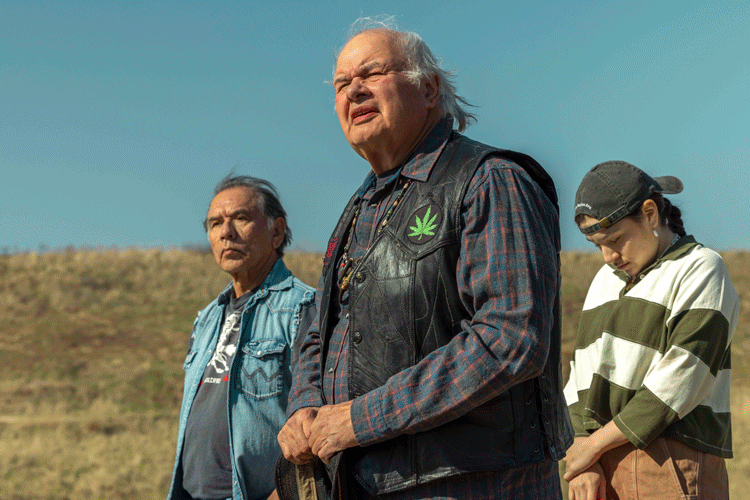
- Share via
Hulu is a strange beast. A joint venture of the Walt Disney Co. and NBC Universal, it has long been the most user-friendly place to stream ABC, NBC and Fox series (if you’re willing to wait until the next day). It has one of the richest and most varied catalogs of any streaming platform, a bench that’s only gotten deeper as more FX series have become available. And with “The Handmaid’s Tale” in 2017, it became the first streamer to win the Emmy for drama series, proving its original content might.
Yet Hulu has been subject to more speculation about its identity, and its future, than perhaps any of its competitors. How long will NBC hold onto its share, now that it has its own platform in Peacock? How does Hulu fit into the Walt Disney “bundle”? Will Hulu and Disney+ merge? What would that even look like?
For now, though, the uncertainty is our gain: Of all our guides, including the 75 best shows on Netflix and the 75 best shows on HBO Max, this selection of the TV shows to watch on Hulu might represent the “something for everyone” ethos (chaos?) of our in-house poll best. Happy viewing.
75. NYPD Blue

1993 | TV-14 | 12 Seasons | Police drama
Created by Steven Bochco and David Milch
Given the quality of his “Hill Street Blues” and “L.A. Law,” a Steven Bochco series automatically raises expectations — even among his lesser works. “NYPD Blue,” which was created by Bochco and “Hill Street Blues” alum David Milch, benefits from a superior cast, fine production values and lots of visual texture as Detective John Kelly (David Caruso) responds badly to the disintegration of his marriage and then goes nuts when his out-of-control partner, Andy Sipowicz (Dennis Franz), gets himself shot up.
The perennial hard-nosed cop, Franz has a sweaty feast as Sipowicz, a paunchy, loud-dressing, self-destructive, hot-tempered boozer who abducts an obnoxious mobster from a restaurant at gunpoint and assaults him, all in public view. Sipowicz’s crazed vendetta becomes the story’s trigger.
Berserk people with guns race through “NYPD Blue,” whose violence does indeed merit a warning. Meanwhile, there are subplots involving Kelly’s soon-to-be-former wife and a female cop who takes a shine to him, and when not impersonating a human cannonball, he spends early episodes as a sort of traveling sage, moving from hot spot to hot spot while dripping puddles of wisdom. (Read more) — Howard Rosenberg
74. Pride and Prejudice
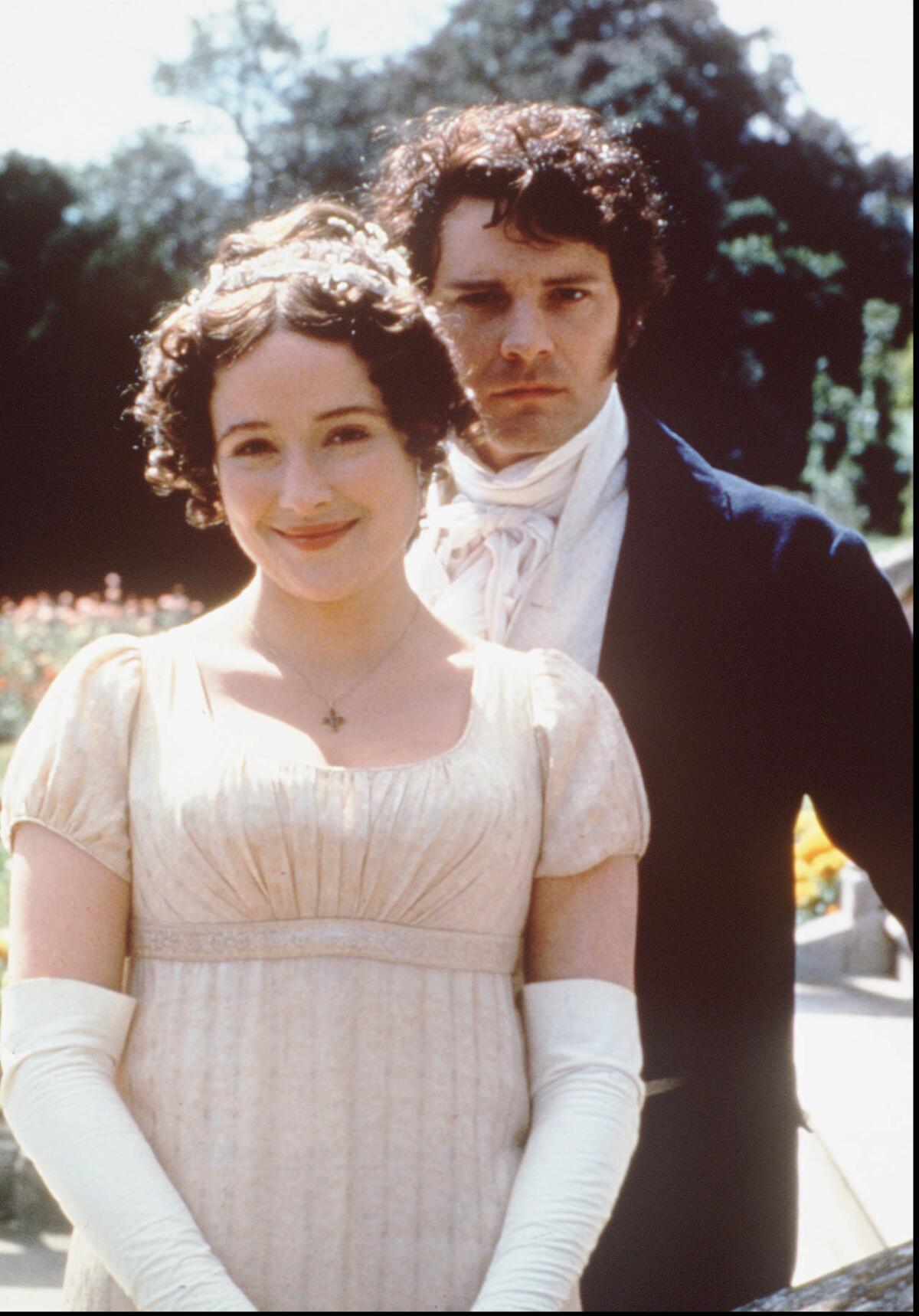
1995 | TV-PG | 1 Season | Period drama, romance
Directed by Simon Langton, written by Andrew Davies, based on the novel by Jane Austen
In “Pride and Prejudice” the seduction begins almost immediately. Although appearing quite comfortably situated in their Longbourn house with servants to tend many of their needs, the Bennets are said to be of relatively modest circumstances. Because Mr. Bennet’s (Benjamin Whitrow) clergyman cousin, that smarmy toad Mr. Collins, stands to inherit the estate, Mrs. Bennet (Alison Steadman) is terrified that she and their five daughters will be penniless and homeless upon her husband’s death. So she is determined to wed her favorite, eldest and supposedly prettiest daughter, Jane (Susannah Harker), to a rich new neighbor, Charles Bingley (Crispin Bonham-Carter) Looming largest in this rigid universe are not Jane and Bingley, however, but the next eldest daughter, the smart and spirited, witty and radiant Lizzie (Jennifer Ehle), and her adversarial connection to Fitzwilliam Darcy (Colin Firth), an even wealthier and loftier young man who at first is contemptuous of the Bennets and their lesser rank. Nor is the strong-willed Lizzie any less tolerant of him. His pride, her prejudice. A standoff. (Read more) — Howard Rosenberg
73. King of the Hill
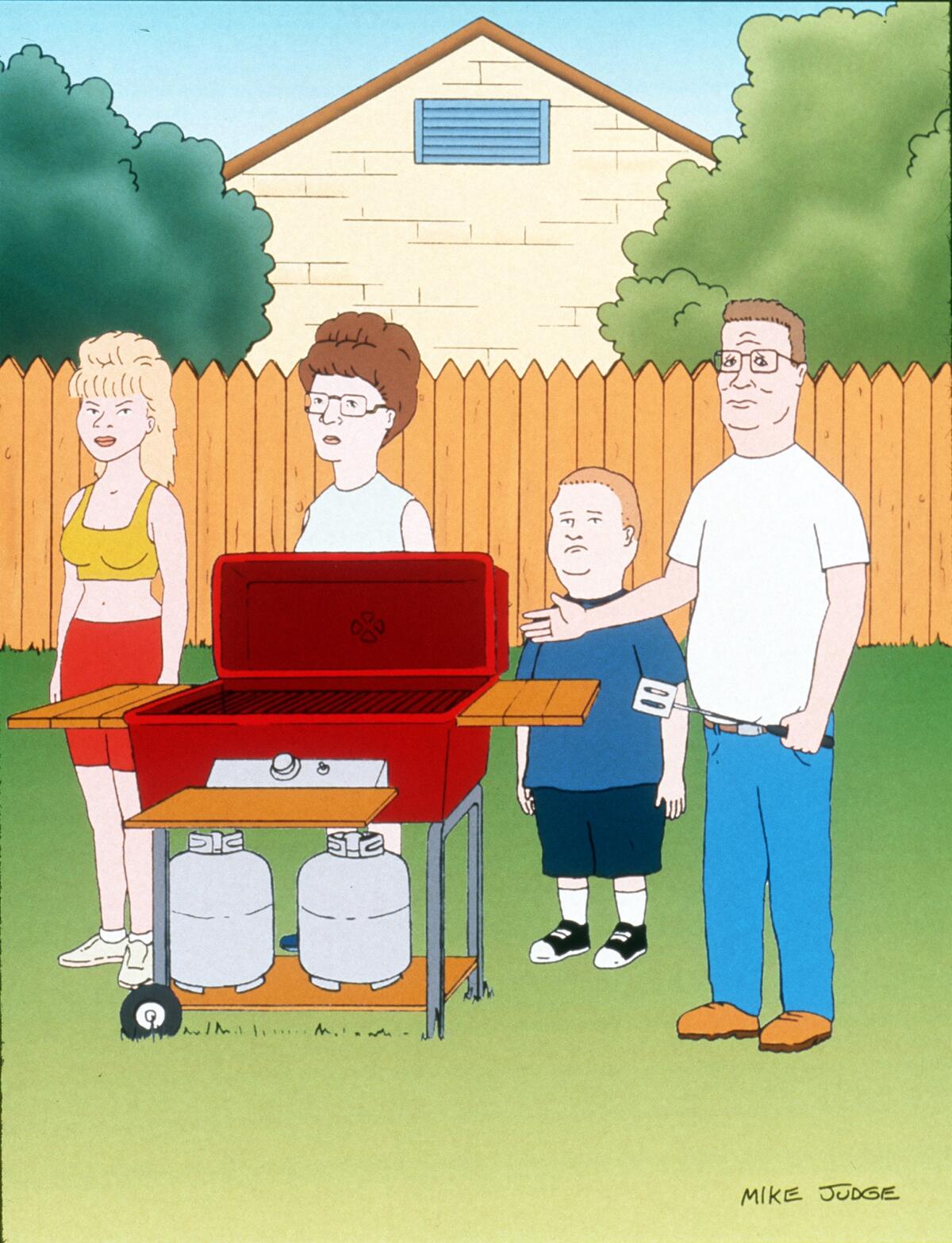
1997 | TV-14 | 13 Seasons | Animated comedy
Created by Mike Judge
The animated “King of the Hill” is a smart, sassy, sweet and satisfying piece of work. Those four S’s don’t often go together. And they’re assembled here by animator Mike Judge’s crew in such a subtle way (OK, add a fifth S), most viewers look right past this simple treasure (that’s six).
Following the ordinary Texas lives of bespectacled propane salesman Hank Hill, his respectful teacher wife, Peggy, and their chubby tween son, Bobby, “King of the Hill” is about adult men wading awkwardly through relationships with their crabby dads, independent wives and clueless sons. It’s about teaching your kid not to smoke by making him puff the whole pack. It’s your old friends getting jealous when you make a new one. It’s an ex-exterminator suffering withdrawal from bug-killing. It’s the mall. It’s shop class.
It’s about real life, in ways that too many sitcoms peopled by human actors really aren’t anymore. When Bobby Hill accidentally sees his cousin Luanne naked, it’s no leering farce; it’s an authentic view of adolescent embarrassment and curiosity, as well as adult discomfort. When Hank gets teary saying goodbye to his beloved old pickup, he’s actually upset about the distance between him and his dad, and him and his son. Of course, high jinks happen along the way. But the personal reality underlying the lunacy is as solid as Texas itself. (Read more) — Diane Werts
72. Felicity
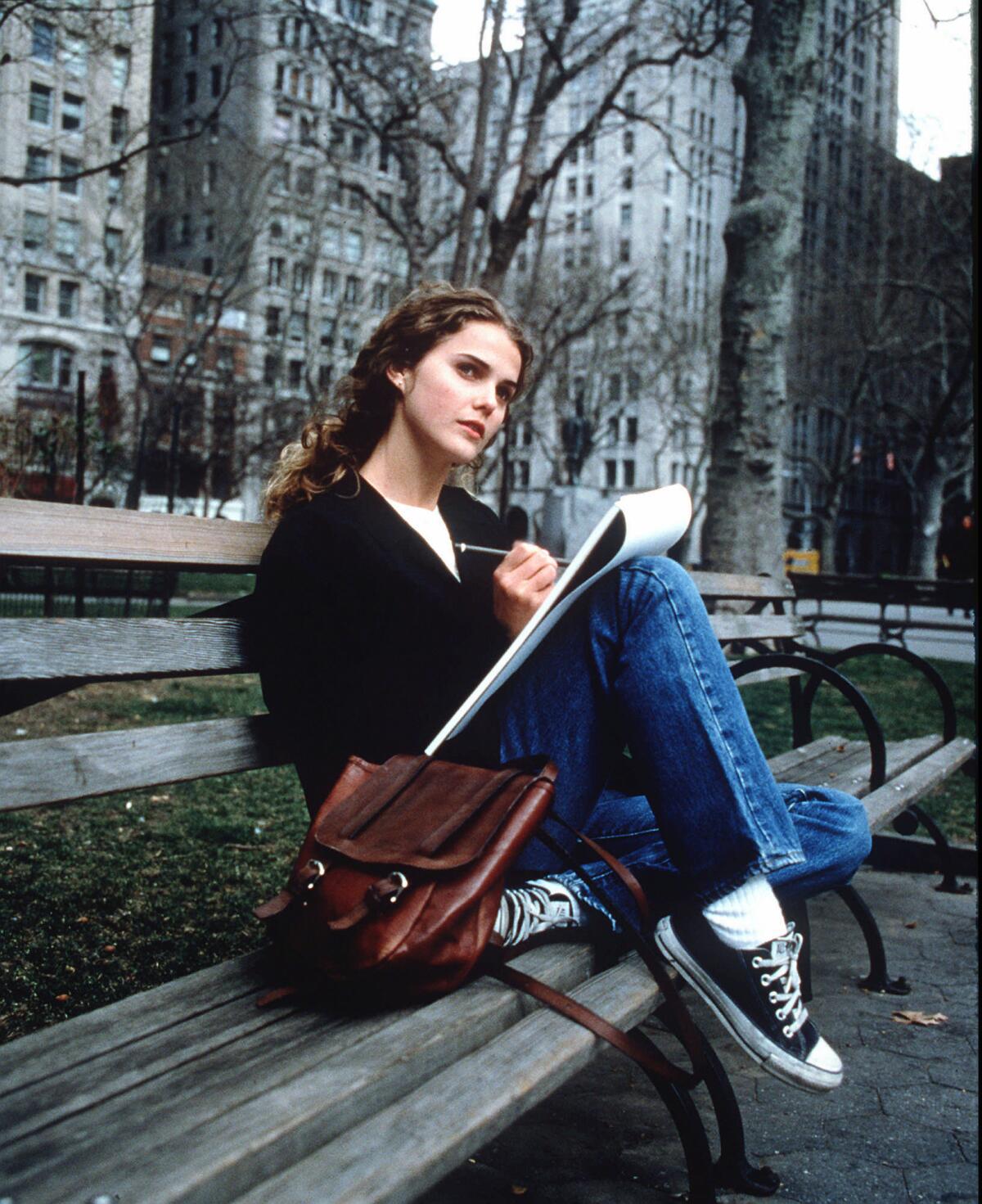
k. (AP Photo/WB, James Sorenson
1998 | TV-14 | 4 Seasons | Teen drama
Created by J.J. Abrams and Matt Reeves
Call it angst across generations. If you’ve wondered what ABC’s old “My So-Called Life” would look like crossed with Fox’s “Ally McBeal,” the answer is the WB’s new “Felicity.”
This coming-of-age hour about an anxiety-ridden college freshman and her pals is among the most gratifying and promising new series of the fall season.
Instead of choosing premed at Stanford, indulged 17-year-old Felicity Porter (Keri Russell) outrages her well-heeled parents by impetuously enrolling in a New York City school just to be near Ben Covington (Scott Speedman), a former high school classmate she barely knows but has an intense crush on. Unfortunately for her tonight, the crushee doesn’t come through quite as expected.
Thus begin the emotional ups and downs of this appealingly romantic series, whose likable heroine, played all fresh and whipped-creamy by the luminous Russell, embarks on a collegiate career full of insecurities and possibilities, in the company tonight of Ben, her new friend Julie (Amy Jo Johnson) and her dorm advisor, Noel (Scott Foley).
If her grating parents are overdrawn, Felicity and her friends seem right on the mark as works in progress. There’s something genuine about their environment and their awkward adjustment. And something equally true about the selfish decision Felicity makes at her job and the way she strolls the streets in slo-mo late in the hour, deep in self-absorption, in the great mopey tradition of emotionally immature Ally. The message being that if you’re going to hybridize, do it with the best. (Read more) — Howard Rosenberg
71. American Crime

2015 | TV14 | 3 Seasons | Crime drama
Created by John Ridley
“American Crime” — a gritty and politically intense examination of character with a frank examination of race, gender and class — is a gratifying breakthrough for television and a truly golden child of the age. Though series creator John Ridley uses the newly minted anthology style of “True Detective”— each season focusing on a different crime and with a new cast — his gaze is wider, more critical, yet less judgmental.
There are no moody metaphors in “American Crime,” no meandering monologues. Instead, the narrative follows slipstream portraits of many lives, framed by the character’s own definition of context.
The crime of the first season is a brutal home-invasion attack on Matt and Gwen Skokie, a young white couple living in Modesto. Matt is killed, while Gwen spends the first four episodes clinging to life.
We learn the details of the crime along with Matt’s father, Russ (Timothy Hutton). With stringy hair and the careful air of a man struggling with stability, Russ is a former gambler who spent years rebuilding his relationship with his son, a connection still limited to Sunday night phone calls.
Still in shock, Russ is thrust back into contact with his ex-wife, Barb (Felicity Huffman), a woman tightly wound around bitterness. Toward Russ, toward her past, toward a society she believes values white lives less than others. (Read more) — Mary McNamara
70. Moone Boy
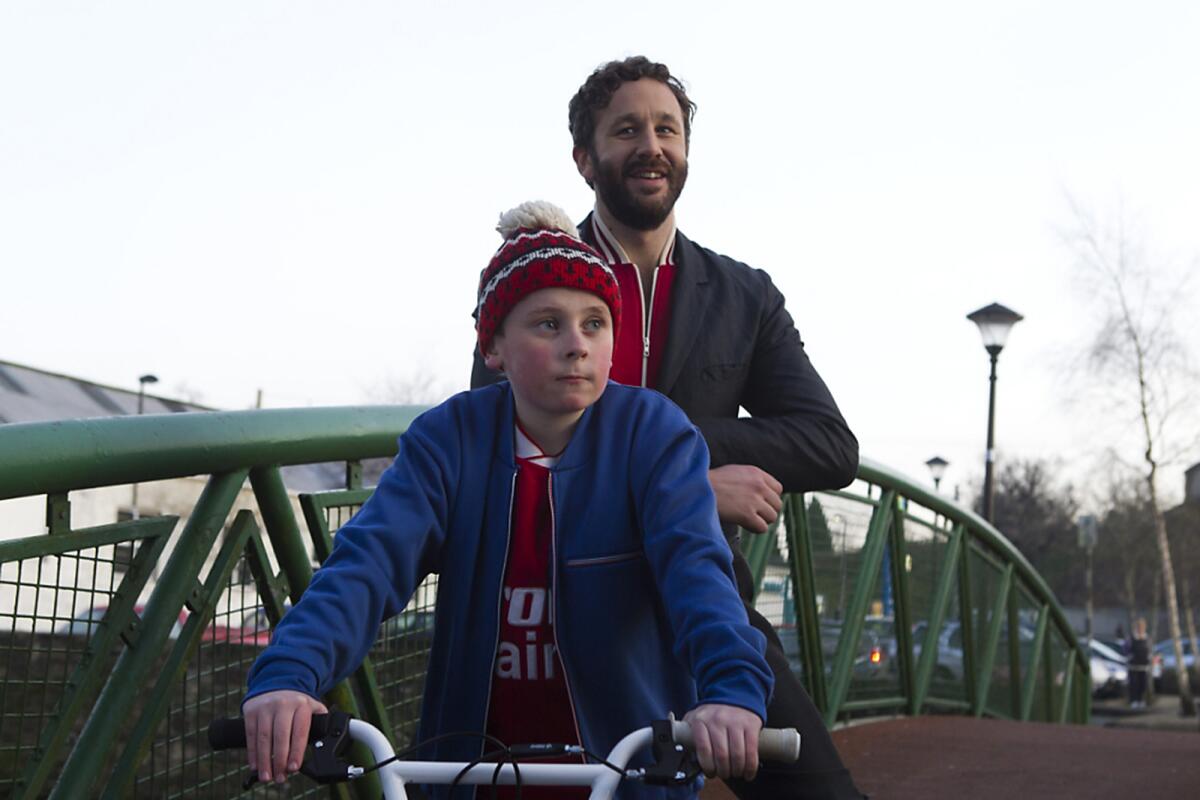
2012 | TV-14 | 3 Seasons | British comedy
Created by Chris O’Dowd
Like it were planned, and perhaps it was, American fans of Chris O’Dowd left bereft by the end of Christopher Guest’s HBO series “Family Tree” may jump, as from a lovely frying pan into a really nice fire, to O’Dowd’s own “Moone Boy.”
As it happens — and not surprisingly, given that the improvisatory “Family Tree” made much use of O’Dowd’s own voice — the two series have a lot in common. Both are sweet and a little eccentric, interested in small things and informed by the creator-star’s seeming good nature, though perhaps that is just the soft music of the accent. (I think perhaps you should read this whole review in that accent.) He may be a raging tyrant offstage, for all I know, but “Moone Boy” does not seem to me the sort of series a raging tyrant would bother, were he at all able, to make.
It begins: “Ever wanted to be the imaginary friend of an idiot boy in the West of Ireland? Me neither, but there you go.” (Read more) — Robert Lloyd
69. Sailor Moon
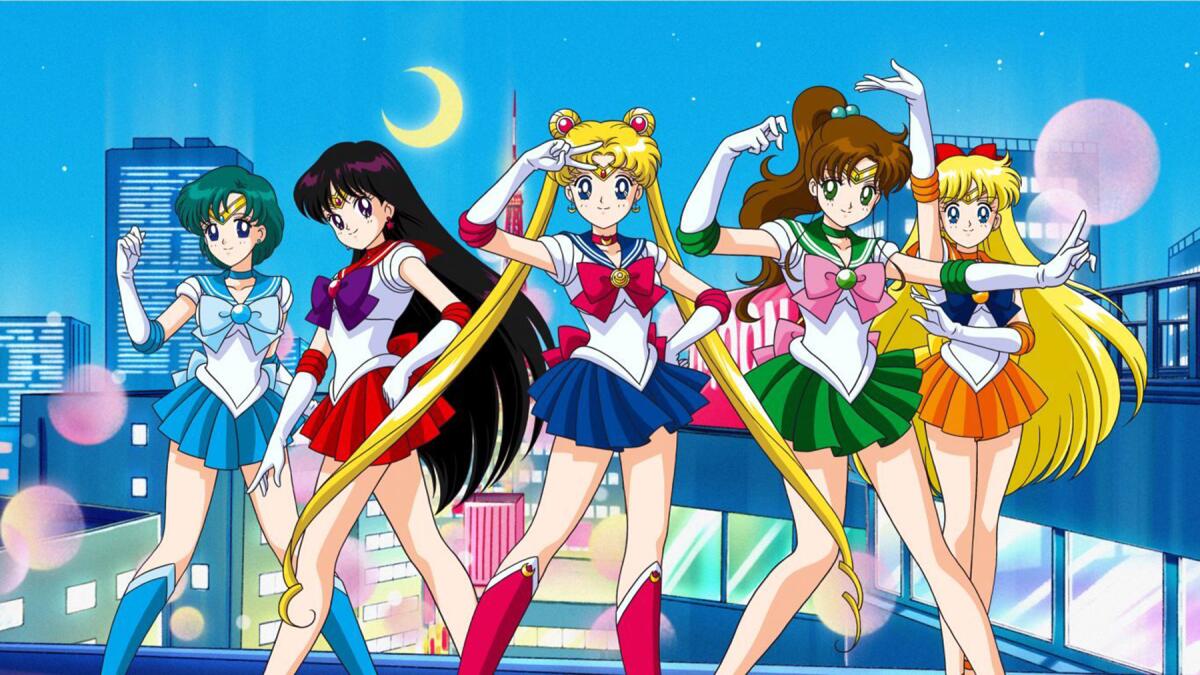
1992 | TV-14 | 5 Seasons | Animated, action, comedy
Created by Naoko Takeuchi
Every weekday morning, 20-year-old Corina Borsuk wakes up a few minutes before 7:30, just in time to catch her favorite TV show, “Sailor Moon,” on KCOP-TV Channel 13. It matters little to the communications major at Cal State San Bernardino that the dubbed version of the Japanese animated series is being targeted primarily at a preteen audience or that she’s seen most episodes multiple times.
Since first airing in the United States last September, the series has managed to corral an eclectic and fiercely loyal audience. The show’s fans range from preschoolers to high school and college students to adults well into their 20s and 30s. All tune in to follow the evolving lives and exploits of five high-school-age super-heroines: Sailor Moon and her four compatriots—Sailors Mars, Jupiter, Mercury and Venus.
By day the cutely conceived cartoon characters are ordinary teens who grapple with school, social and romantic problems. By night they transform into super-heroines who fight various intergalactic evildoers. When they’re battling villains, they wear blue-and-white sailor blouses, which are standard school attire for many Japanese girls, and pleated miniskirts.
“‘Sailor Moon’ is the right combination of silliness and seriousness,” says Heidi Wall, a bright 14-year-old from San Francisco who, like many of the show’s advocates, is also a fan of Japanese animation in general. “With a lot of American [kids’] shows, it’s either cute little bunny rabbits or, like, big buff guys with machine guns. There’s nothing in between. With ‘Sailor Moon’ you get a good story line and romance. But it’s enough about beating up monsters that my little brother can watch it without falling asleep.”
In Japan, where animated shows are often viewed as mainstream programs rather than children’s entertainment, “Sailor Moon” is a prime-time hit. The series has also found popularity in European countries such as France and Italy. In Canada, it is one of the youth-oriented YTV cable network’s most watched daytime programs. (Read more) — Jon Matsumoto
68. Welcome to Chippendales
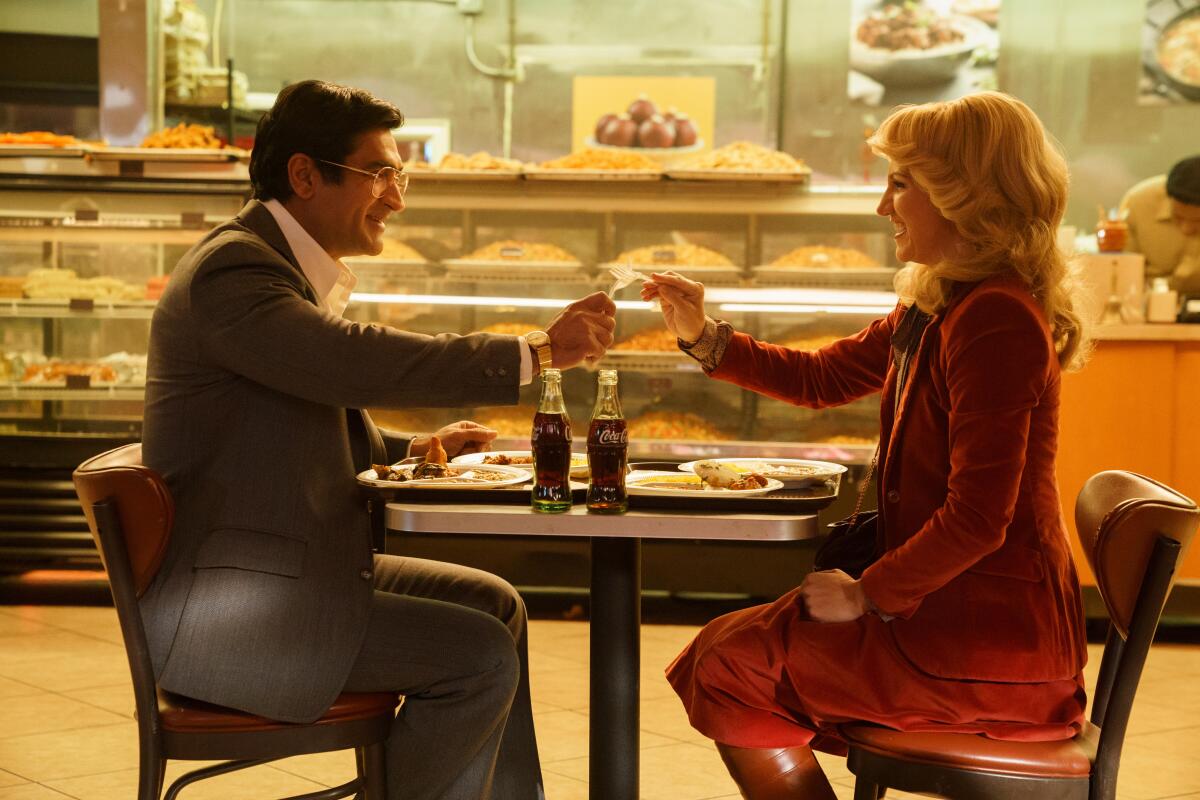
2022 | TV-MA | 1 Seasons | Drama
Created by Robert Siegel
Screaming drunk secretaries, gyrating hunks in G-strings and mountains of cocaine populate “Welcome to Chippendales,” Hulu’s wonderfully lurid drama about the rise of “the world’s greatest male-stripping empire” and the deadly rivalry that took it down. Skeezy 1980s Hollywood comes alive in this eight-part series, where an immigrant’s dreams of wealth and success lead to one of the weirdest true-crime stories of the era.
Created by Robert Siegel and inspired by the book “Deadly Dance: The Chippendales Murders,” the series, premiering Tuesday, is a multifaceted and highly entertaining look at the unlikely story of Chippendales’ founder — and the tragedy of his success. Somen “Steve” Banerjee (Kumail Nanjiani) was an Indian immigrant with brilliant business ideas and zero social skills, yet he connected with a who’s who of seedy L.A. to build his dream.
Among the cast of colorful, real-life characters is oily self-promoter Paul Snider (played by the chameleonic Dan Stevens), who would become infamous for killing his wife, Playboy playmate Dorothy Stratten (Nicola Peltz), before turning the gun on himself. Here he’s an early partner in Chippendales, helping Banerjee come up with gimmicks to get his club off the ground. (Read more) — Lorraine Ali
67. Sons of Anarchy
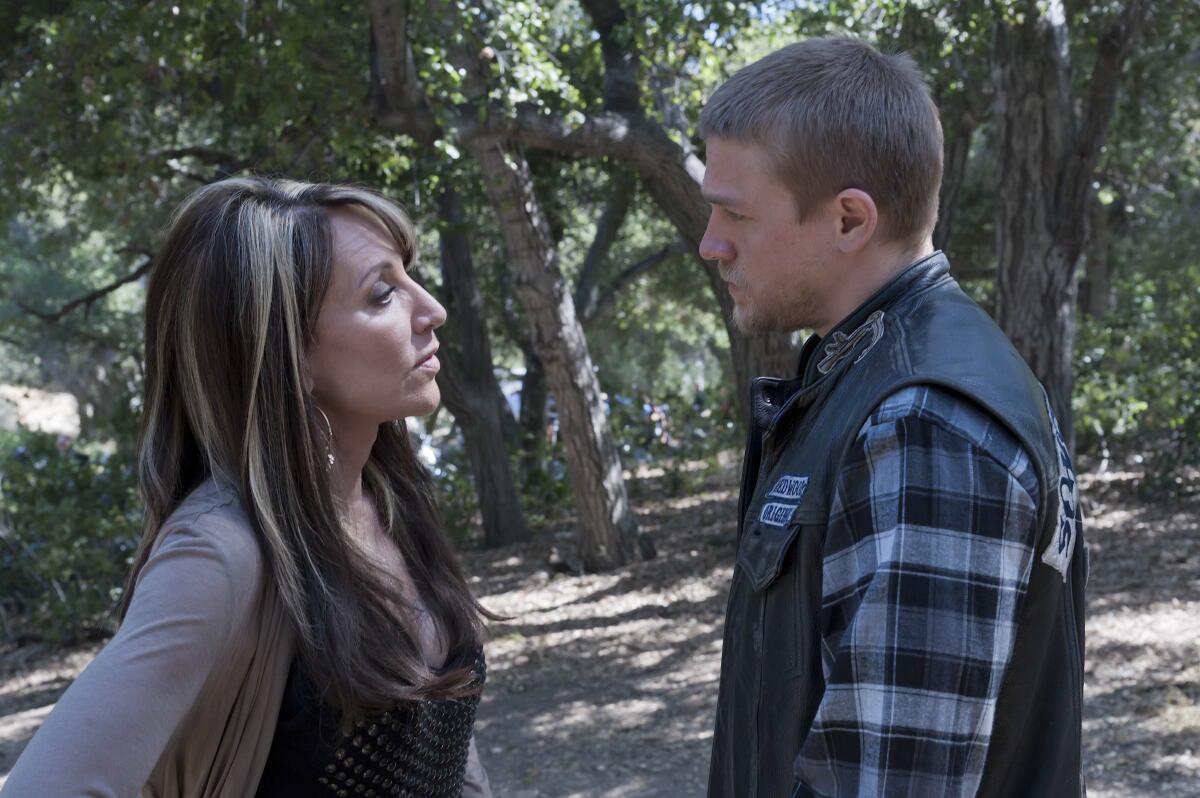
2008 | TV-MA | 7 Seasons | Action drama
Created by Kurt Sutter
“Sons of Anarchy” follows the fortunes of a motorcycle gang known as SAMCRO, a military-style abbreviation for the Sons of Anarchy Motorcycle Club Redwood Original. Putting aside questions of quality — I don’t mean to say it isn’t good, because it is — the premise is almost mathematically obvious, given the times.
SAMCRO literally gets away with murder in the fictional Northern California town of Charming (fictional population: 14,679), located in the vicinity of the real town of Hollister, where in 1947 a motorcycle rally gone out of bounds inspired sensational headlines (and, some years later, “The Wild One”). As created by Kurt Sutter, a writer and executive producer on “The Shield,” the Sons of Anarchy are an outlaw band, both “realistic” and, inevitably, romanticized. (That happens when you get writers and actors involved.) To keep them likable enough to sustain a series, he makes them moral on their own terms and surrounds them with characters less palatable or righteous than they are: white-supremacist, meth-dealing rivals; crooked cops. Call it the Sopranos Method.
There are similar contrasts within the group itself: Charismatic hero Jackson “Jax” Teller (Charlie Hunnam) is a relatively sensitive soul, trying to steer his club from a path of violence and crime toward one of diplomacy and legitimate investments. He is also, functionally (and intentionally), Hamlet — though instead of a ghost directing him to vengeance, Jax has discovered an unpublished manuscript by his late father, decrying SAMCRO’s fall from “a Harley commune” practicing “social rebellion” into racketeering and moral “chaos.” Indecision doesn’t seem to be his defining flaw, but he is waffling between worldviews.
This incipient “softness” displeases Jax’s mother Gemma (Katey Sagal, who is married to Sutter), the Gertrude of the piece, now married to Clay (“Hellboy” Ron Perlman), the Claudius. They like what they’ve got going. (Read more) — Robert Lloyd
66. Hannibal
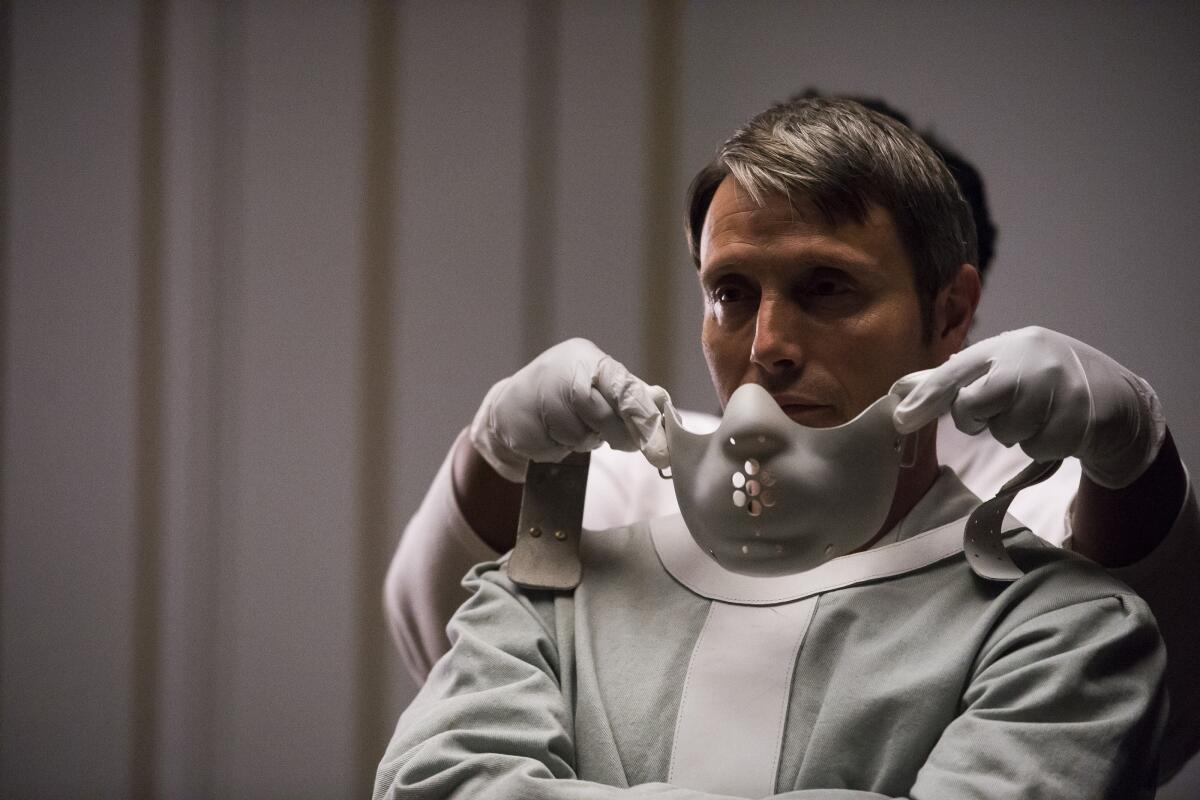
2013 | TV-MA | 3 Seasons | Drama, thriller
Created by Bryan Fuller
The problem with “Hannibal” is not the graphic violence or the absurd back-story tweaks — [Hugh] Dancy’s Will Graham is no longer just a super-great FBI profiler with a photographic memory, he’s a shivering, night-sweating, natural-born empath, whatever the heck that is — or even the fact that it is rather late to a very crowded serial-killer crime scene.
No, the problem with “Hannibal” is Hannibal. As written by Bryan Fuller and played by Mads Mikkelsen, Hannibal Lecter, therapist-turned-cannibalistic-serial-killer-turned-crime consultant and possibly one of the greatest characters of 20th century popular literature, is just a big drag.
First of all, he’s so creepy looking, with his pedophillic, English-teacher stare and finicky foodie ways, that any empath worth his salt would take one look and holler: “Serial killer!” (Read more) — Mary McNamara
65. The 1619 Project
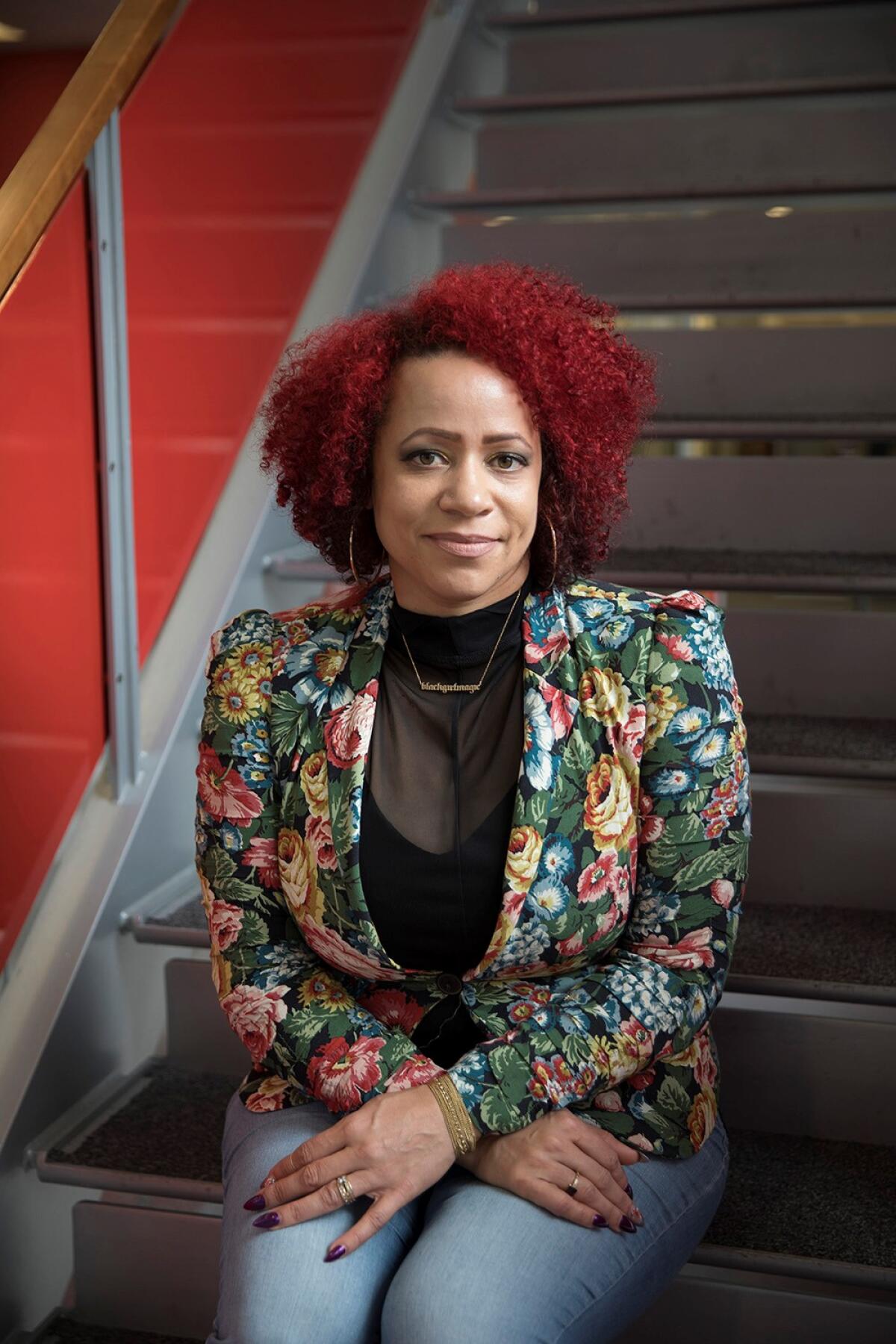
2023 | TV-MA | 1 Season | Documentary series
Created by Nikole Hannah-Jones
“The 1619 Project,” which was first published as a collection of essays in the New York Times Magazine, then adapted into a podcast and a book.
The ambitious reexamination of American history sparked difficult conversations about the legacy of slavery in the United States and earned praise for its creator, New York Times Magazine writer Nikole Hannah-Jones.
It also provoked a fierce, if predictable, backlash from critics, many of whom were threatened by its central thesis: that the arrival of the first enslaved Africans in Virginia 400 years ago was a defining moment — perhaps the defining moment — in the history of the United States, one that continues to have a real and frequently devastating effect on Black Americans today.
“The 1619 Project” has arrived on Hulu as a docuseries. It offers a compelling look at the deep roots of racial injustice in America. Each of the six episodes, like the essays on which they are based, considers a current phenomenon — voter disenfranchisement, Black maternal health, the racial wealth gap — and traces it back to the history of slavery and segregation in the United States, drawing powerful and often unexpected connections between past and present.
The series also weaves in details about Hannah-Jones’ family that vividly illustrate the project’s themes — her white grandparents’ decision to disown their daughter for marrying a Black man; her Black grandmother’s journey during the Great Migration from the Mississippi Delta to a red-lined neighborhood in Waterloo, Iowa; her late father’s fierce patriotism and military service. (Read more) — Merideth Blake
64. Shrill
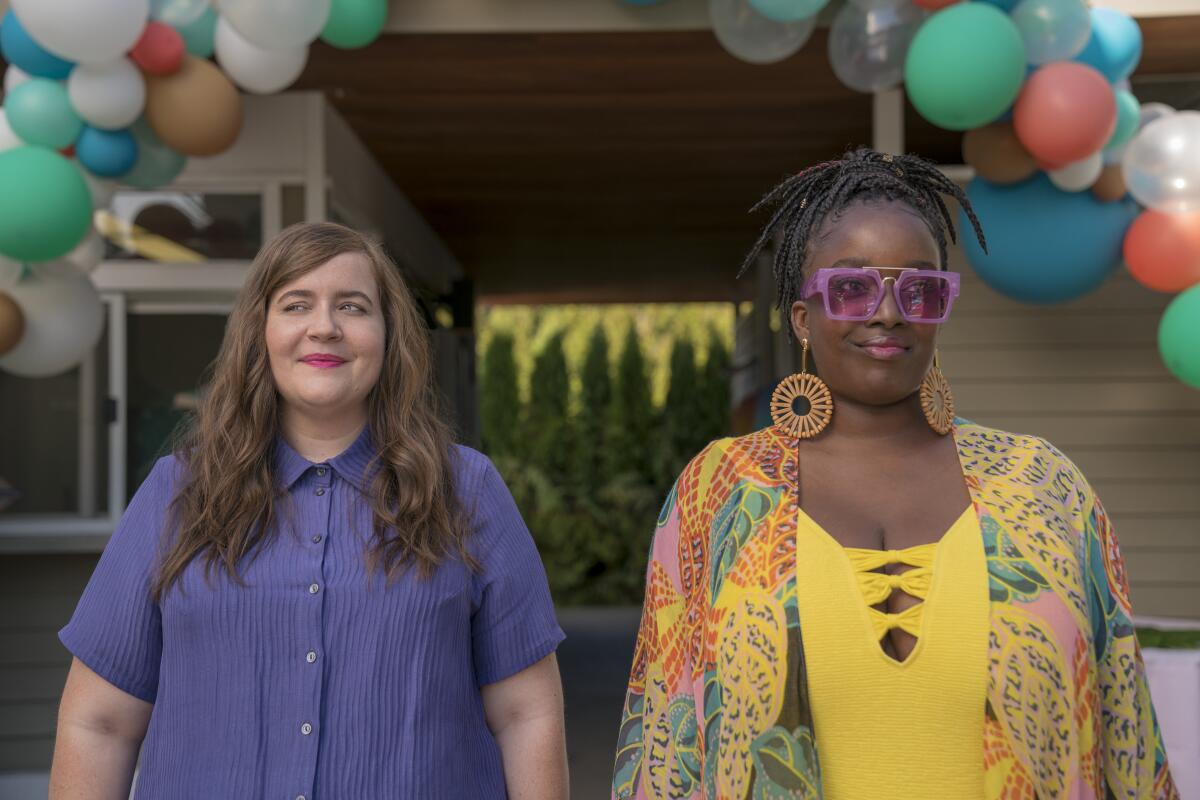
2019 | TV-MA | 3 Seasons | Comedy
Created by Aidy Bryant, Alexandra Rushfield and Lindy West
One of the first things you see in the new Hulu series “Shrill,” an excellent and surprising adaptation of feminist writer Lindy West’s 2016 memoir, is star Aidy Bryant’s body.
Portraying West’s fictionalized analog Annie, a young journalist starting out at an alt-weekly in Portland, Ore., the “Saturday Night Live” cast member is shown in her underwear hurriedly getting dressed. Bryant’s character, like West, is a plus-sized person reckoning with a body that doesn’t conform to cultural ideals, either in the real world or the wilds of Peak TV.
And while the series deftly touches on the comic realities of figuring out who you are and what you want in sex, love and work, it’s Annie’s relationship with her body that remains at the center.
Television has tentatively begun to better reckon with the experience of different body types — AMC’s anarchic and recently canceled “Dietland,” ABC’s “Downward Dog” (also canceled) and the bare provocations of Lena Dunham’s “Girls” come to mind — but the universal journey toward self-acceptance has never been drawn as sharply as it has been in “Shrill.” (Read more) — Chris Barton
63. Rick and Morty
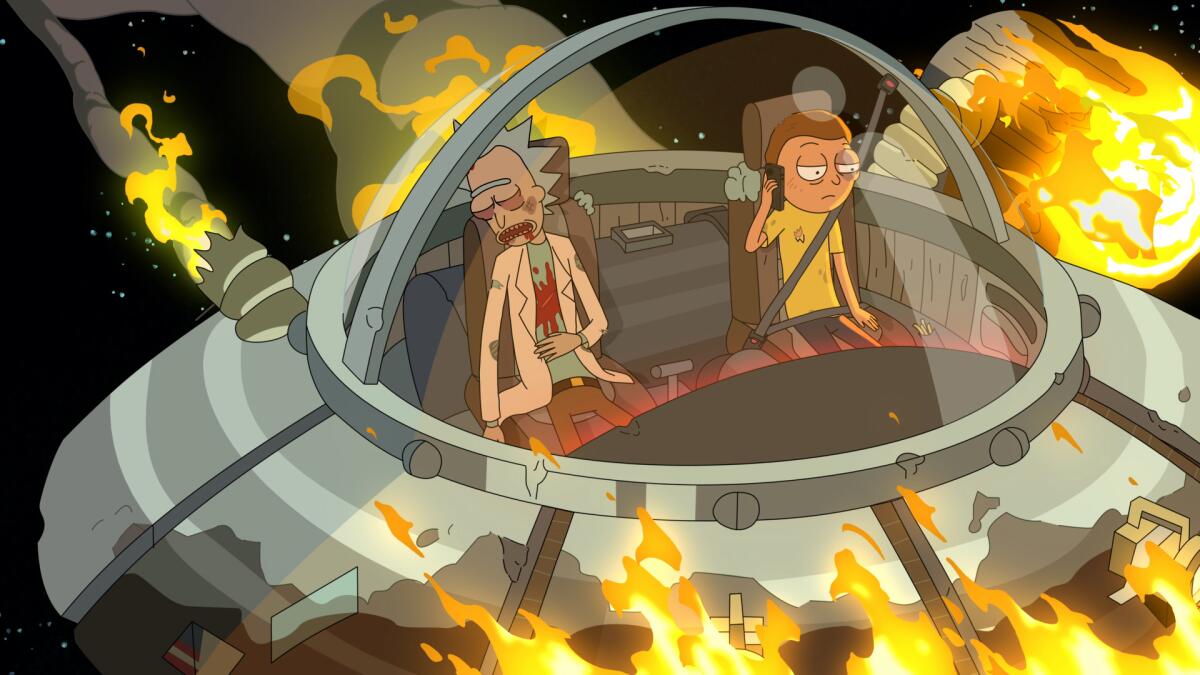
2013 | TV-14 | 5 of 6 Seasons | Animated comedy
Created by Dan Harmon and Justin Roiland
I’m not quite sure yet how I feel about “Rick and Morty,” an animated sci-fi family comedy, created by Dan Harmon (“Community,” not “Community,” “Community” again) and Justin Roiland (“House of Cosbys,” and he also played Christopher Cross on “Yacht Rock” for Harmon’s Channel 101). Morty is a kid at the bottom of the food chain; Rick is his grandfather, a drunk and dissolute mad scientist with spit or puke or something always on his chin and easy access to other worlds, dimensions and dream planes. He is full of good bad advice, or bad good advice, for his grandson, whom he drags from his crushing daily life into a world of insane terror. (It’s a classic magic-grandpa, scary-buddy story, plus vomit.) Nothing wrong with that. Still, sex jokes involving underage characters, even made for an over-age audience, feel wrong to me. (Read more) — Robert Lloyd
62. Line of Duty
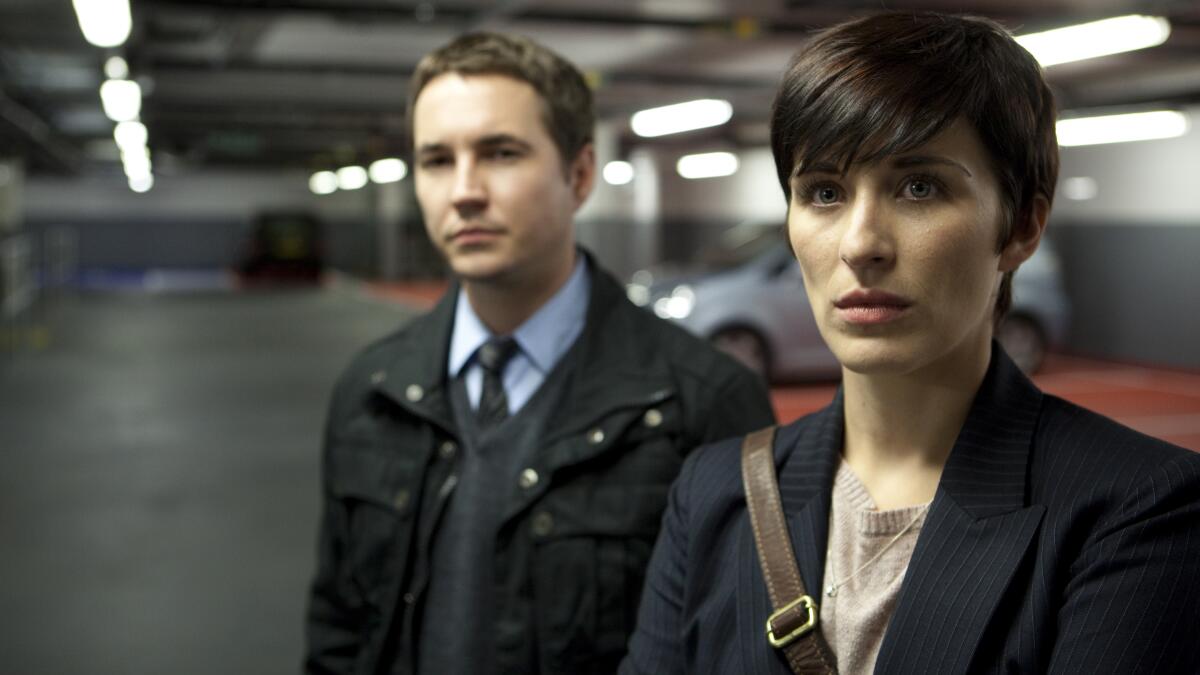
2012 | TV-MA | 5 of 6 Seasons | British police drama
Created by Jed Mercurio
The opening scenes of the premiere episode of the British police drama “Line of Duty” have a low-budget, film school final-project vibe. The characters seem simplistic and stereotypical, the production is not terribly polished and the plot, at first, one-dimensional. But don’t let that fool you. Once this series gets going it finds a pace and intensity on the level of “24” as it tells its gritty story of an anti-corruption unit (AC-12) rooting out “bent coppers” from a big-city police department.
Led by Supt. Ted Hastings (Adrian Dunbar) detectives Arnott and Fleming (Martin Compston, Vicky McClure), mistrusted by their colleagues and not saints themselves, are pitted against a different rogue cop each season. The targets of their investigations are often as sympathetic as they are villainous, and portrayed by a top-notch cast including Lennie James (“The Walking Dead,” “Fear the Walking Dead”), Keeley Hawes (“The Durrells,” “Bodyguard”), Thandiwe Newton (“Westworld”, “ER”), Stephen Graham (“Boardwalk Empire,” “Time”) and Kelly Macdonald (“Boardwalk Empire,” “No Country for Old Men”). — Ed Stockly
61. Futurama

1999 | TV-14 | 10 of 11 Seasons | Animated science fiction comedy
Created by David X. Cohen and Matt Groening
Science fiction and comedy are “like that.” (Writer crosses fingers to indicate closeness.) Each takes emerging facts to their extreme, often absurd conclusions; both are fundamentally philosophical — though each has time for exhilarating idiocy — and in imagining what might be, each takes the measure of what is. “1984” was about “1948,” and “Brave New World” is a funny book. Created by Matt Groening, who invented “The Simpsons” and changed the world, and developed with David X. Cohen, “Futurama” fuses the two forms as if in the warp core of some spaceship I am imagining as I type. It has to some extent labored under the shadow of its more eligible look-alike older cousin and echoes it here and there — 20th-century pizza delivery boy Fry (Billy West) is, like Homer Simpson, a distractible lunkhead, while Bender (John DiMaggio) is the mechanical man Bart might have grown up to be had he been born a robot — but is very much its own creature, with its own interests. (Read more) — Robert Lloyd
60. Firefly
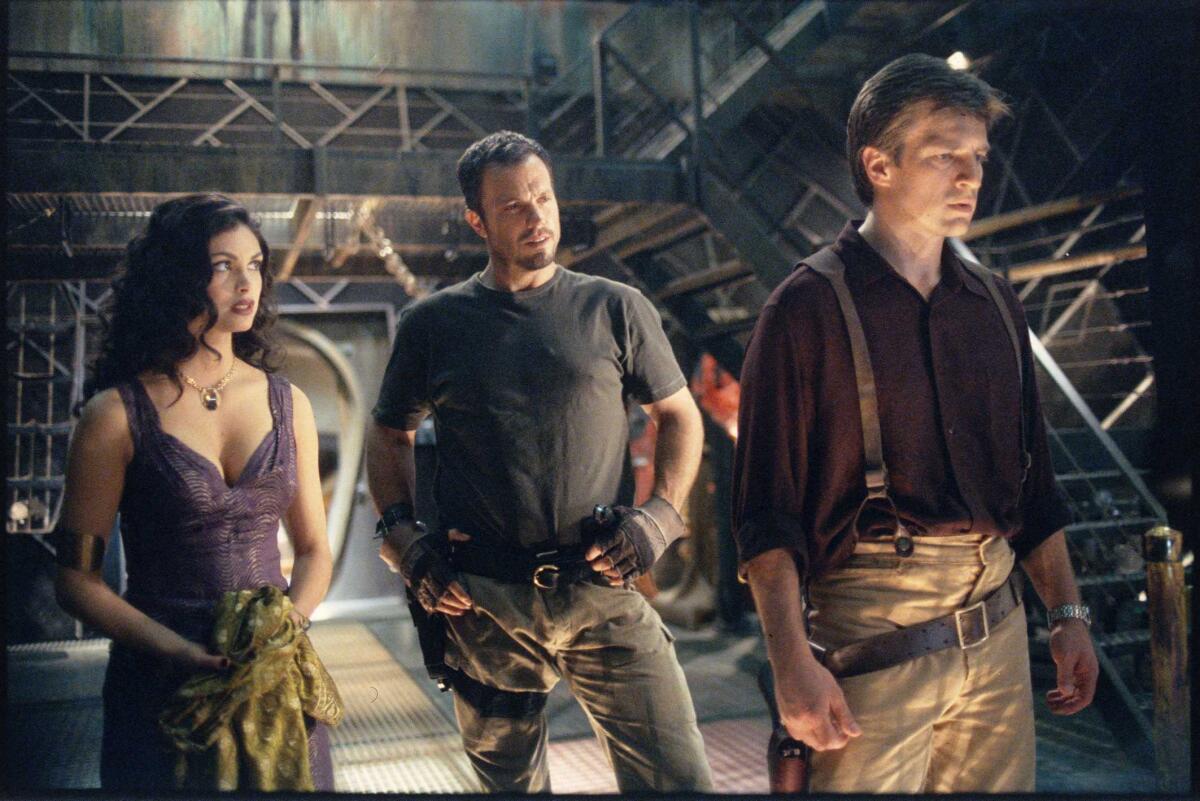
2002 | TV-PG | 1 Season | Science fiction, action
Created by Joss Whedon
In some ways the science fiction series “Firefly” is a lot like the original “Star Trek,” had the United Federation of Planets been soundly defeated and humanity surrendered to be dominated by a malevolent interplanetary empire, and the ship’s captain (Nathan Fillian), who didn’t take the surrender well, is left bitter, resentful and rebellious.
“Firefly” is also like “Star Wars: A New Hope” as many of its themes and tropes are found in Westerns and serial movies. The ship, Serenity, a far from pristine interplanetary freighter — comparable to the Millennium Falcon — carries a diverse roster of crew members and passengers (Gina Torres, Alan Tudyk, Morena Baccarin, Adam Baldwin, Jewel Staite, Sean Maher, Summer Glau and Ron Glass), who are misfits and rebels both united and divided by their hatred of their victorious enemies.
Created by Joss Whedon, “Firefly” became a cult hit, each episode mixing humor, adventure and action with fine performances and solid writing. The series ended on a cliffhanger and wasn’t picked up for a second season, but the story continued in the 2005 movie “Serenity,” directed by Whedon. — Ed Stockly
59. Absolutely Fabulous
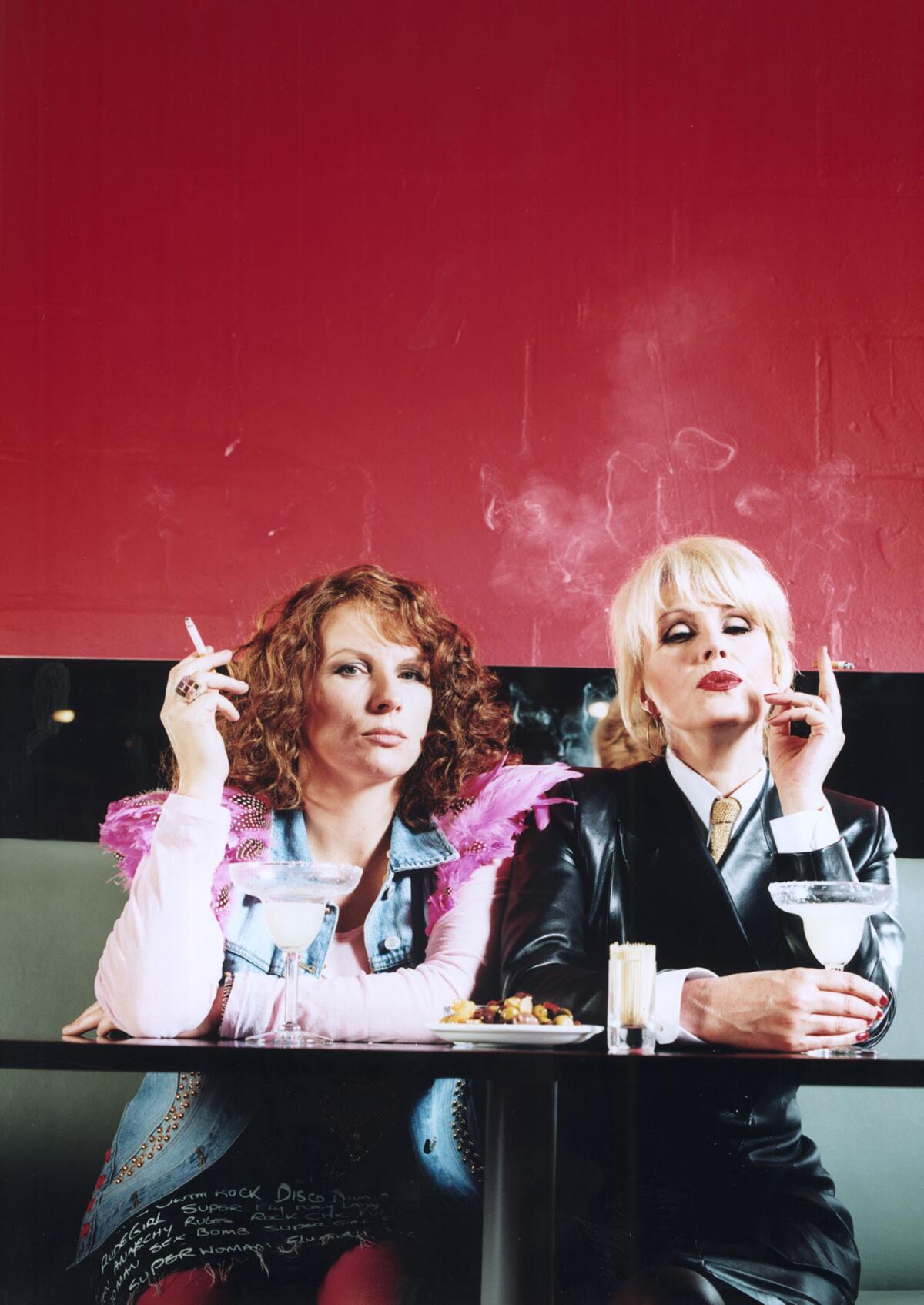
1992 | TV-PG | 6 Seasons | British comedy
Created by Dawn French and Jennifer Saunders
“Absolutely Fabulous,” the British smash hit comedy that was once seen only in America by fans fabulous enough to have bootlegged videos, has taken a Concorde ride to cult status in the states.
“AbFab,” the pet name given it by devotees after it debuted on BBC in 1992, fell smack into the hip lexicon as fast as Edina and Patsy, the series’ permanently 39-year-old dipsomaniacal gal pals, spill out of their chauffeured Jaguar and into the London gutter after having a bit too much Stoli.
And its two over-the-top stars, Jennifer Saunders (who created it, writes it and stars as Edina, a Buddhist-chanting publicist who never goes into her isolation tank without the cellphone) and former Avenger Joanna Lumley (Patsy, a magazine fashion director who often can’t find her office) were almost too much for David Letterman to handle.
Just what is it about the show that has U.S. fans salivating for their next “AbFab” fix? Why are two chain-smoking, chain-drinking, chain-snorting, chain-shopping chums so universally lovable?
“There’s a bit of wish fulfillment about it,” says the show’s producer, Jon Plowman. “There’s a bit of them doing stuff that the rest of us would like to do. The things they do feel like kind of the completely hedonistic experience that would be quite fun.”
Hedonistic is a good description. Eddy is the twice-divorced PR queen with the paunch: “People, places, concepts—I PR them. I make the fabulous fabulous, I make the crap credible.” She indulges in everything from champagne for breakfast to high colonics (“That’ll get it out of me by hook or by crook.”) Lacroix is her favorite designer (“Does Lacroix do kitchens?”) and she’s fond of clashing couture ensembles that are one size too small. The glam Patsy does not deny herself the pleasures in life either. Sex, drugs, Chanel suits. She’s all Ivana Trump with her extra-high beehive hair and extra-tightly lifted face. Rail-thin Pats satisfies her urges for oral gratification by alternating cigarettes with vodka and catty remarks. (Read more) — Beth Kleid
58. Gravity Falls
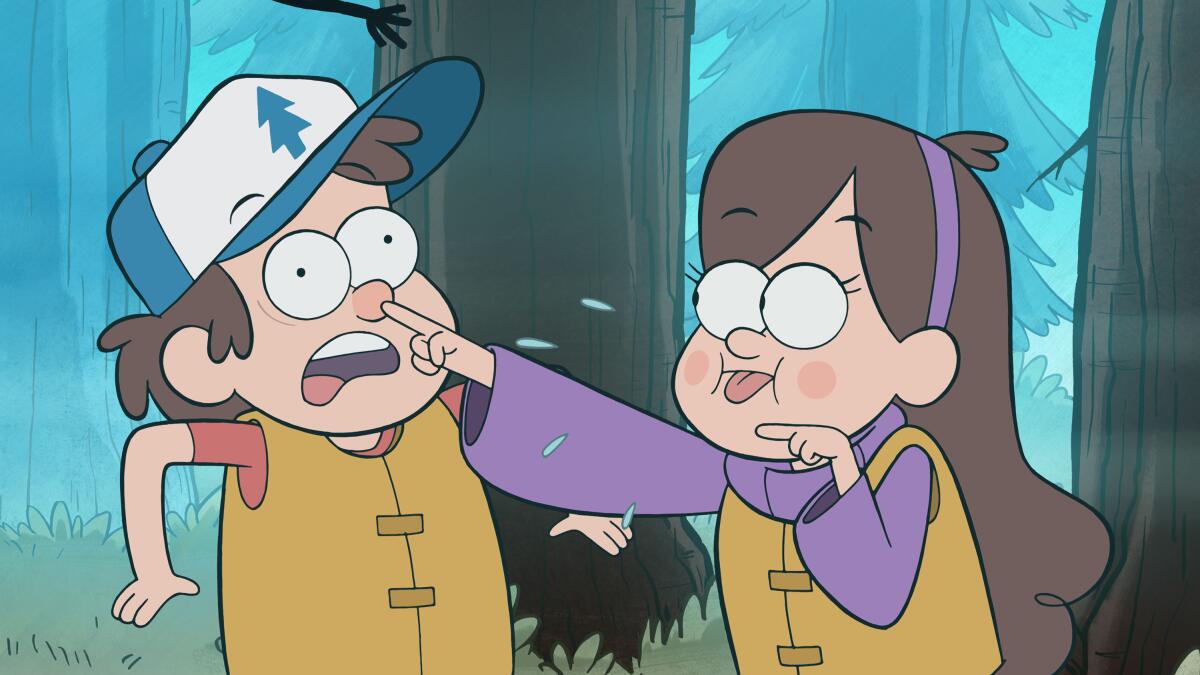
2012 | TV-Y7 | 2 Seasons | Animated comedy
Created by Alex Hirsch
The sound of Kristen Schaal, already a notable feature of Fox’s “Bob’s Burgers” as the voice of wise child Louise Belcher, adds an instant touch of alt-comedy cred to “Gravity Falls,” a likable Disney Channel cartoon series about twins spending a summer with their strange great-uncle in a weird little town in the Pacific Northwest. Cue the”Twin Peaks” reference (though “Eerie, Indiana” is a more apt live-action comparison).
Gently twisted, with some Disneyfied action and heartwarming folded in, the series was created by Alex Hirsch, yet another young product of Cal Arts, the Harvard Business School of animation, and a veteran of Disney Channel’s “Fish Hooks” and Cartoon Network’s “The Marvelous Misadventures of Flapjack.” He also voices the twins’ Grunkle Stan — drawn with an old man’s big ears and knobby nose, big square glasses and a Shriner’s fez — with the phlegmy bark of a retired Borscht Belt comic: “My ex-wife still misses me, but her aim is getting better. You see? It’s funny because marriage is terrible.” (Read more) — Robert Lloyd
57. Will & Grace
1998 and 2017 | TV-14 | 8 Seasons and 3 Seasons | Comedy
Created by David Kohan and Max Mutchnick
Sure, it’s just a comedy, but among all the TV reboots and resuscitations — “Star Trek,” “Dynasty,” “Gilmore Girls,” “Full House,” “SWAT” — “Will & Grace,” which boosted the mainstreaming of LGBTQ culture by featuring two of network TV’s first main gay characters, had the most at stake upon its return to prime time in a 2017 after 11 years off the air. President Joe Biden once said the show “did more to educate the American public” on LGBTQ issues than anything or anyone else had to that point.
No pressure, Will (Eric McCormack), Grace (Debra Messing), Jack (Sean Hayes) and Karen (Megan Mullally), or original show creators Max Mutchnick and David Kohan.
The new “Will & Grace” not only keeps up with a culture it helped change, it remembers to laugh at itself … and the absurdity of the new world it’s daring to inhabit. Three of these four characters are still single and still searching for love, except now it requires dating apps, compression garments and lots of concealer. (Read more) — Lorraine Ali
56. Arrested Development
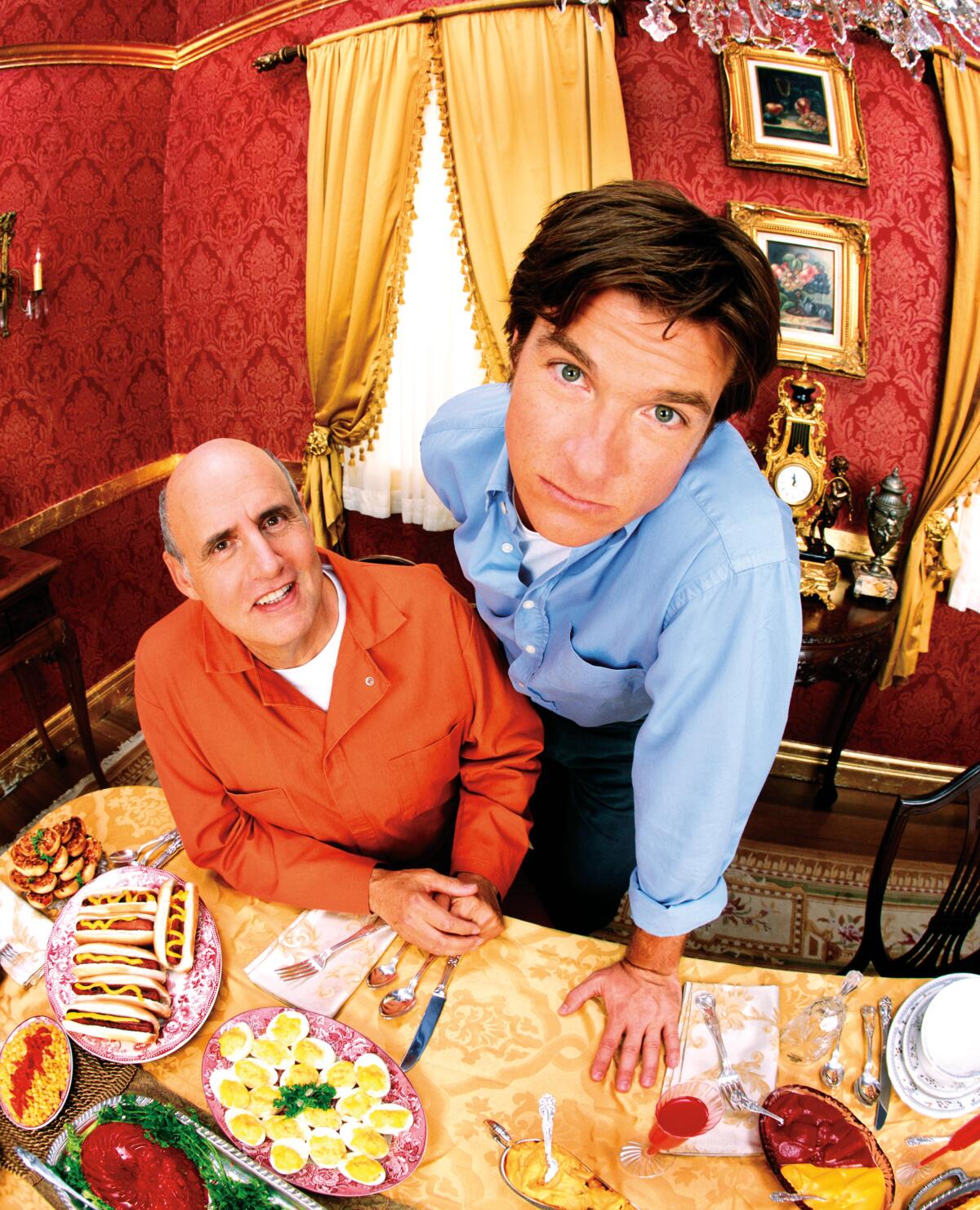
2003 | TV-14 | 3 of 5 Seasons | Comedy
Created by Mitchell Hurwitz
Once you accept that it is going to work a little harder than is necessary to convince you of its eccentricity, there are many, many things to like about “Arrested Development,” Fox’s latest entry in the Dysfunctional-Family Comedy Sweepstakes.
For that matter, even the fact that the show works hard — that it takes as its stylistic and, in some ways, its substantial model “The Royal Tenenbaums” rather than “Growing Pains” — is something to be grateful for, television being such a habitually underachieving repeater of past successes.
As do several other series it concerns immature grown children, although here even the older generation are found wanting. Jason Bateman plays Michael, the only responsible adult member of the Bluth family, which also includes father George (Jeffrey Tambor), a real estate developer about to be arrested for embezzlement by the SEC — already it is not your standard television comedy — mother Lucille (Jessica Walter), controlling and contemptuous; and siblings Lindsay (Portia de Rossi), Buster (Tony Hale) and George Oscar Bluth (Will Arnett), “Gob” for short. Buster is a mama’s boy who has studied many less than useful subjects (Native American drumming, cartography, 18th century agrarian business) while mastering none; “Gob” is a third-rate magician, who always speaks as if on stage. (“Illusion, Michael,” he says when his brother asks him about a magic trick. “A trick is something a whore does for money.”)
Lindsay is a kind of society fund-raiser whose current pet cause fights circumcision — “sounds like you saved enough skin to make 10 new boys,” Michael observes. She is married to Tobias Funke (David Cross), a psychiatrist who lost his medical license when he performed CPR on a man who wasn’t having a heart attack, and is the mother of Mae “Maeby” Funke (Alia Shawkat), upon whom Michael’s 13-year-old son George Michael (Michael Cera) has a large crush.
All of them depend largely on the family fortune. When father George goes to jail and the assets are frozen, they must hang together or hang separately. (Read more) — Robert Lloyd
55. Friday Night Lights
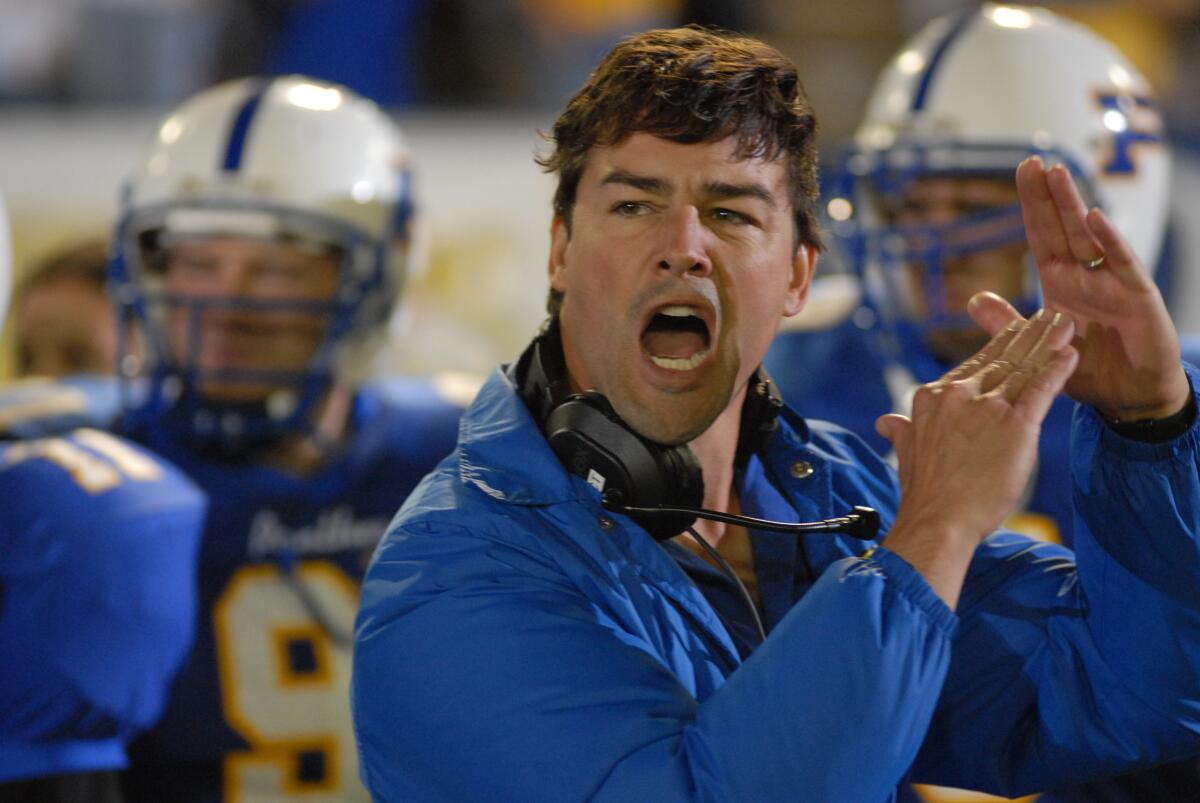
2006 | TV-14 | 5 Seasons | Sports drama
Created by Peter Berg
Like AMC’s “ Mad Men,” “Friday Night Lights” has an industry resonance, and social significance, that far outstrips the size of its audience. A critical darling from the get-go, NBC’s adaptation of the book/film of the same name elbowed its way among the urban cop dramas and upscale family shows, offering Dillon, Texas, instead of a coastal city or moneyed suburb, modest single-stories instead of Craftsman or lofts, and folks living lives that included church, Sunday dinner and, of course, high school football.
Did the experiment work? Well, stars Kyle Chandler and Connie Britton got their — and DirecTV’s — first Emmy nominations, which shocked even those who felt they were long overdue. Subsequently, “Friday Night Lights” moved out of bubble-show-turned-distribution experiment and back onto the magazine covers. (Read more) — Mary McNamara
54. Hey, Arnold!

1996 | TV-Y| 1 Season | Animated family comedy
Created by Craig Bartlett
“Hey, Arnold!” features the unconventional animation styles and quirky humor that have helped make Nickelodeon popular with young viewers. The series was created by Craig Bartlett, a writer on “Rugrats,” the Nickelodeon cartoon series about toddlers’ adventures that is the highest-rated series on cable.
Arnold has a wide face and wide yellow hair that make him look like a New York city cab with the doors open. In one episode, he tries to befriend the accident-prone class nerd, with disastrous results. Arnold deals with some of the same issues as “Doug,” the gentle hero of a popular Nickelodeon series that moved to ABC.
“When you’re a kid, friendship and homework are big issues, and childhood can be tough,” observed Albie Hecht, Nickelodeon’s vice president of production. “I think Arnold captures those feelings — and it’s funny, too.” (Read more)— Jane Hall
53. Steven Universe
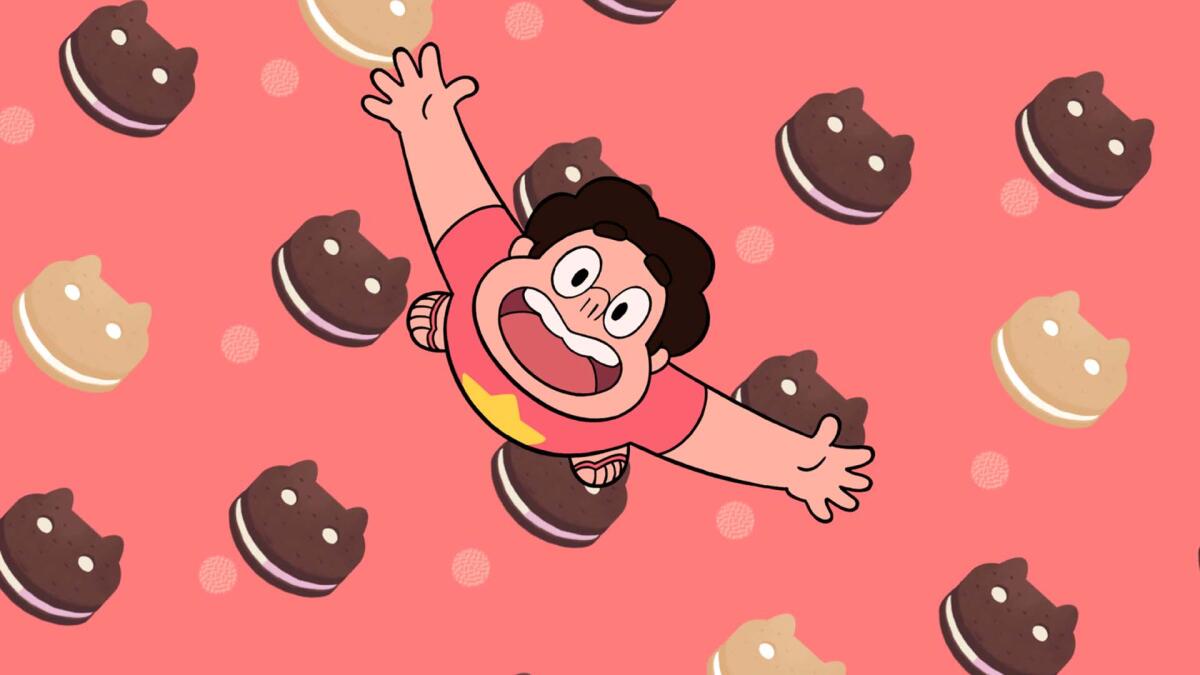
2013 | TV-PG | 4 of 6 Seasons | Animated adventure comedy
Created by Rebecca Sugar
Rebecca Sugar — who is already a star in the world of people who love “Adventure Time,” for which she has been a storyboard artist and writer and composer — has her own cartoon series now. It’s very good.
In “Steven Universe,” Steven (Zach Callison) is a chubby boy of indeterminate preteen age who seems to live in the custody of but also fights alongside three universe-defending superwomen, the Crystal Gems: Garnet (the British R&B singer Estelle), Amethyst (Michaela Dietz) and Pearl (Deedee Magno). Each is embedded with a magical, mystical jewel that confers distinct special powers. (Read more) — Robert Lloyd
52. MasterChef Junior
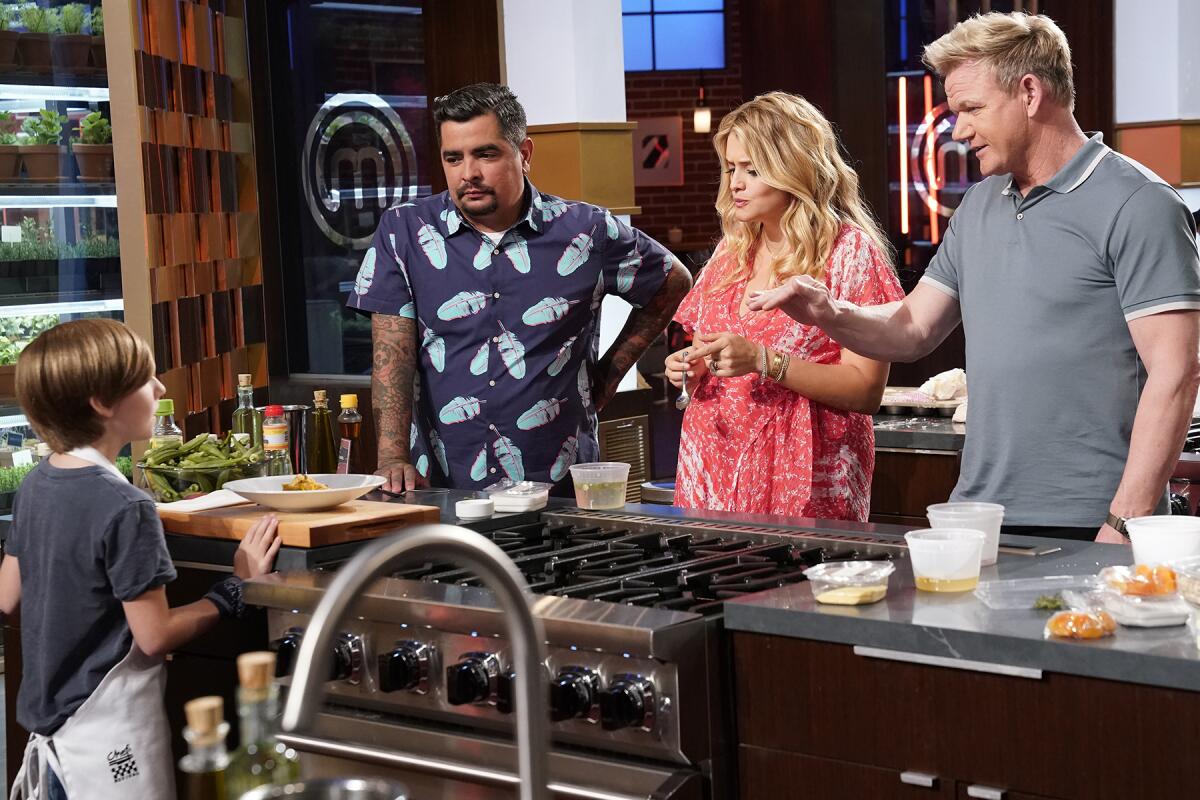
2013 | TV-PG | 8 Seasons | Unscripted, teen, cooking and food
Created by Gordon Ramsay, Adeline Ramage Rooney and Robin Ashbrook
Although I mean to demean no type of television outright, most reality shows scuttle around well outside my interest. I care for/about few of them. “MasterChef Junior,” however, I love. If nothing else, and it is not a little, this is the show that keeps host-judge Gordon Ramsay (mostly) on good behavior; and a well-behaved Ramsay, because he actually does care — or does an extremely convincing impression of someone who does — is one of the more interesting characters of television. More interesting, certainly, to me, than the Ramsay Fox has on offer elsewhere, the one who shouts and curses and loses his mind and carries on all in all like a person on a reality show.
It is of course the kids that make the difference. They are not beyond hubris or competitive calculation; this is not an ode to innocence; they are adorable, sure, but fierce. And they are also sweet and excited and rightfully full of expectation, the oldest being no more than 13, and the youngest 8. (Some have to stand on step-stools to reach the counter; the tiniest wrestle with big appliances.) They are admiring of one another’s skills and supportive of each other in their moments of heartbreak and distress. (There will be undercooking; there will be overcooking.) And they are all very happy to be there. (Read more) — Robert Lloyd
51. The Mindy Project
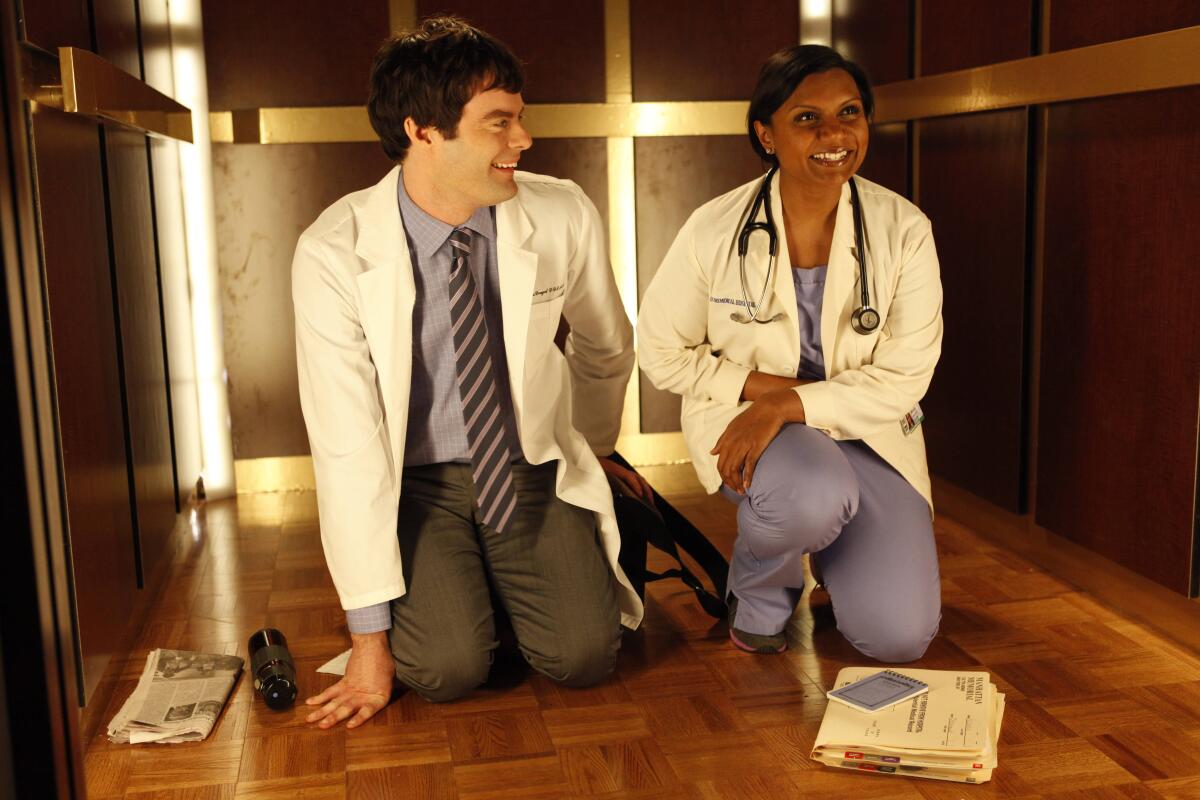
2012 | TV-14 | 6 Seasons | Comedy
Created by Mindy Kaling
Mindy Kaling, who was Kelly Kapoor on “The Office” and also one of that show’s writers, has her own series now, “The Mindy Project.” It is possible that I have a small crush on the creator and star — inspired in no small part by her writing, as published in various magazines and her comic-essays memoir, “Is Everyone Hanging Out Without Me? (And Other Concerns)” — so I may not be entirely reliable on this subject.
But, to the degree I can be objective, I like this a lot.
Needy and controlling and terribly sure of herself, Kelly Kapoor was a handful. Here Kaling plays a less difficult person, also named Mindy — or, in any case, a person who mostly makes trouble for herself and whose self-involvement is not so blinding as to make self-reflection impossible. Raised on rom-coms, she is the woman Nora Ephron wrought, strong and capable and yet waiting for ... something: not merely for Mr. Right, but the knowledge that she’s all right without him. (Read more) — Robert Lloyd
50. Party Down
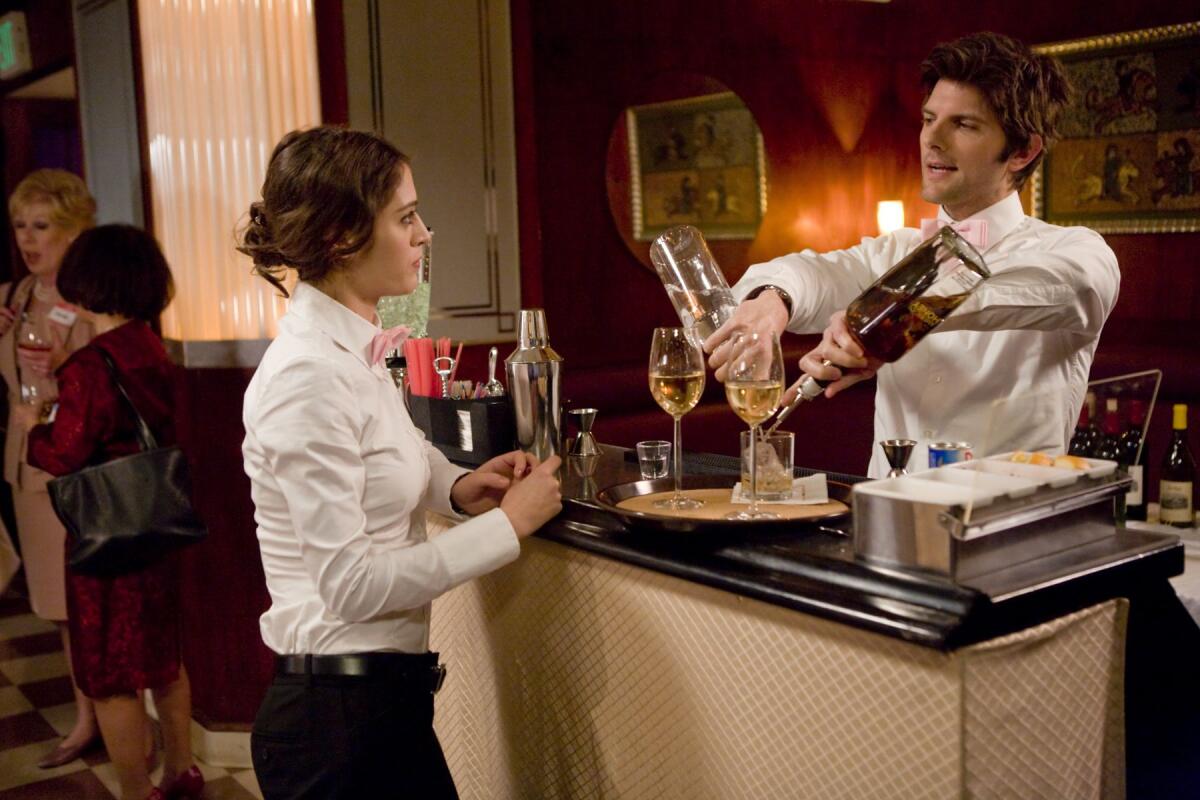
2019 | TV-MA | Seasons 2 and 3 of 3 Seasons | Comedy
Created by John Enbom, Rob Thomas, Dan Etheridge, Paul Rudd
“Party Down” is a smart, affable, mostly unpredictable ensemble comedy that reminds us that fine things can happen in unlikely places, as long as you are clever about budget, commit to a sensible number of episodes, write well and cast right, and that what matters ultimately to heaven is not the eminence of the venue but the quality of the work.
“Party Down” follows a troupe of Southern California caterers as they go from job to job, an arrangement that requires only a single location for each episode and insures variety across the series. It’s a bit like “The Office” on wheels, except where “The Office” is about people who, for better or worse, really identify with their jobs, “Party Down” is mostly about people who want something else. Except for enthusiastic team leader Ron (Ken Marino), a formerly aspiring actor who has had a Damascus moment and now regards his job with cult-like satisfaction, none are in catering for catering’s sake. They are all show business hopefuls staying alive between auditions and the rare gig — or, in the case of Ron’s old friend Henry (Adam Scott), who was briefly famous for a beer commercial, merely lacking any better plan. (Read more) — Robert Lloyd
49. Superstore
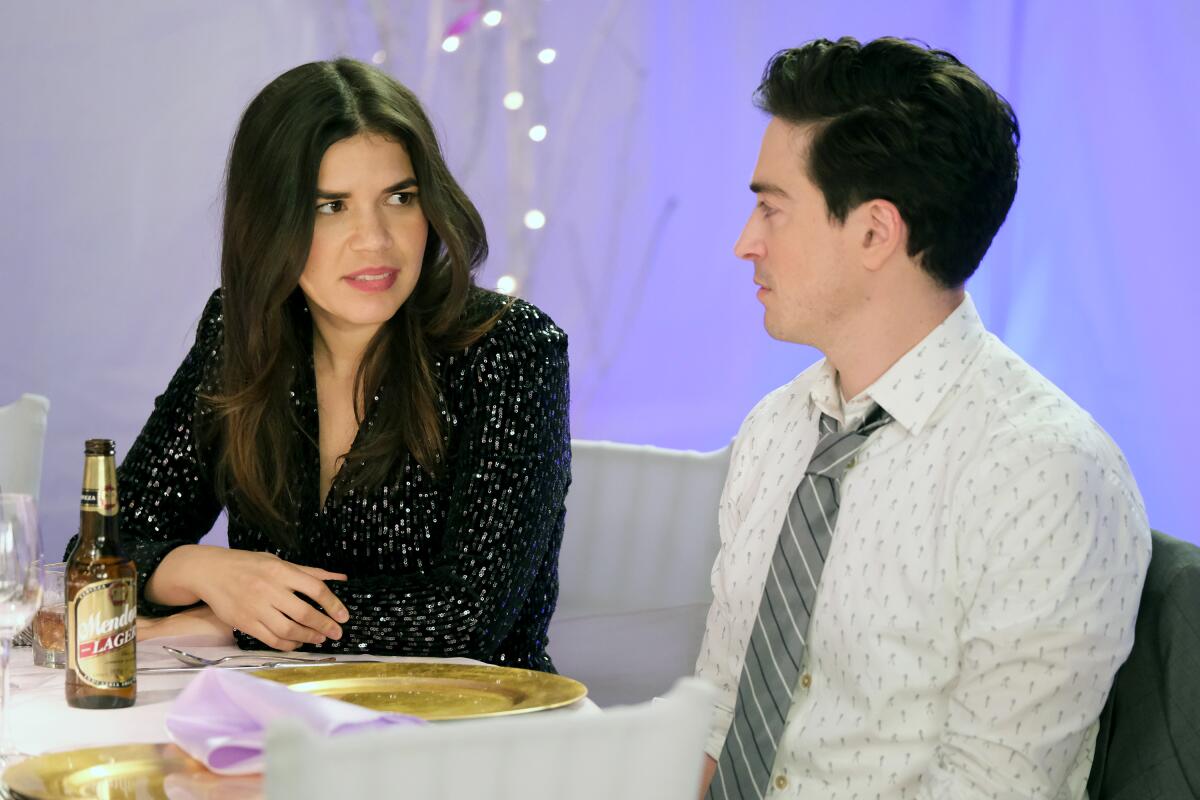
2015 | TV-14 | 6 Seasons | Comedy
Created by Justin Spitzer
Set in a Midwestern Wal-Mart-style big box store, “Superstore” is a workplace comedy whose creator, Justin Spitzer, wrote for NBC’s “The Office,” and in a sense still does. As in the earlier series, there are a socially tone-deaf boss (Mark McKinney of “The Kids in the Hall”), a character (Lauren Ash) who takes the job with almost violent seriousness, and a pair of relatively normal characters (America Ferrara of the estimable “Ugly Betty” and Ben Feldman of the short-lived “A to Z”) with an unspoken, inconvenient attraction. The series’ shared subject is the dreadfulness and happiness of the co-working life.
It’s a bit of a frustrating mixed bag, “Superstore,” on which I blow hot and cold from scene to scene. The cast is strong. There are nice things and the episodes get better as they go along and the caricatures turn to characters. But there are also things that make me sort of sad — and they are things meant to make me laugh. (Read more) — Robert Lloyd
48. Top of the Lake
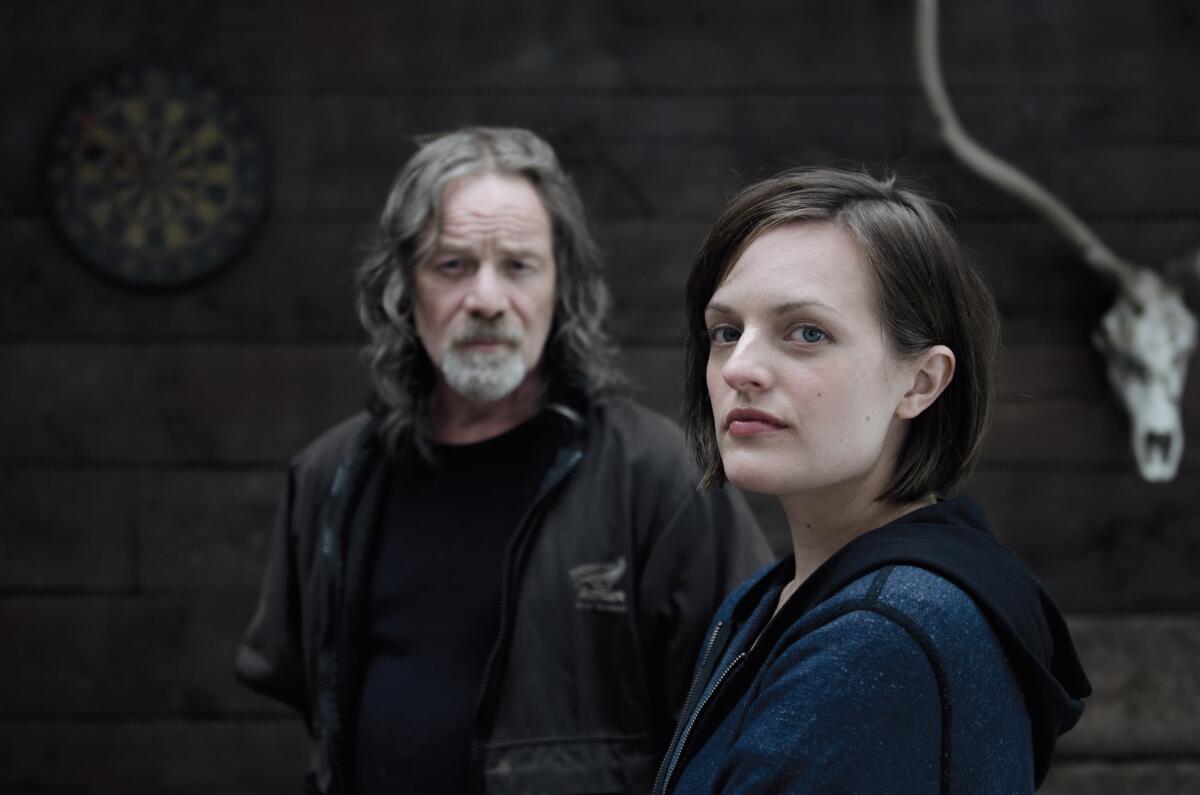
2013 | TV-MA | 2 Seasons | British crime drama
Created by Jane Campion
“Top of the Lake” is the first miniseries from filmmaker Jane Campion of New Zealand (“The Piano,” “Bright Star”). Elisabeth Moss, whom it is a pleasure to see outside of “Mad Men,” where she never seems to have enough to do, and to see her in 21st century clothes, besides, stars as Robin Griffin, a police detective who, visiting her perhaps terminally ill mother in a New Zealand mountain town, becomes involved in a local case: Tui Mitcham, a 12-year-old girl found standing chest-deep in an icy lake, turns out to be almost five months pregnant. Then (mild spoiler) she goes missing.
Meanwhile, a group of variously distressed women, “in a lot of pain” and not exactly under the leadership of an unusual person called only GJ, has set up camp in some modified cargo containers on an even more remote tract of land. This wakes the interest and enmity of Tui’s father, Matt (Peter Mullan), who regards the land as his by rights.
Robin is in a kind of suspended state, an outsider and an insider, back on old, tainted ground, not quite happy to be there but helpless to leave it. The people around her seem both unusually familiar with and ignorant of one another. (Perhaps that’s how it is in small towns, or possibly that’s just the human condition.)
Campion throws Robin up against three men: Matt, rough but not unsophisticated, concerned only with his own family and ideas of justice (he makes a living outside conventional law); Matt’s son Johnno (Thomas M. Wright), living in the woods and spiritually improved by eight years in a Thai prison; and Det. Senior Sgt. Al Parker (David Wenham), who is, to start, less than comfortable with Robin and possibly too comfortable with Matt. (Read more) — Robert Lloyd
47. Pose
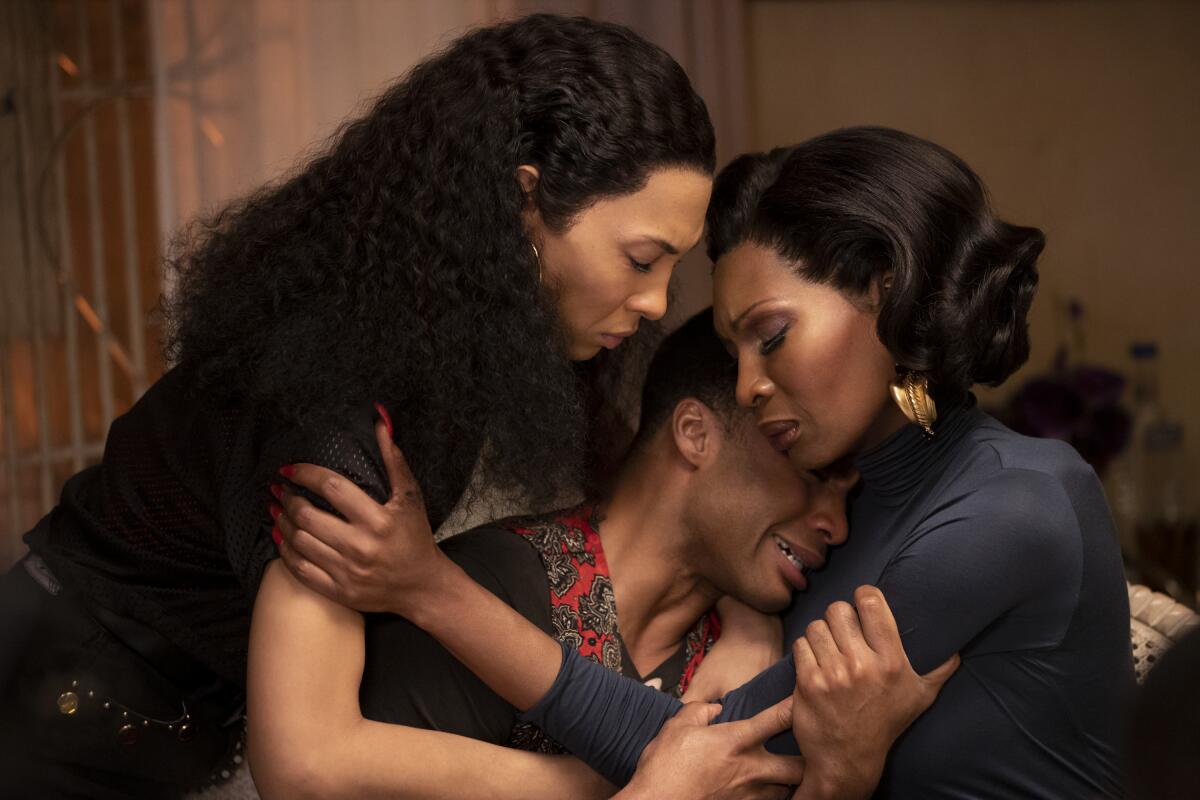
2018 | TV-MA | 3 Seasons | Drama, fashion and beauty
Created by Ryan Murphy, Brad Falchuk, Steven Canals
“Strike a pose,” Madonna commanded in the 1990 single “Vogue.” It’s the very pose meant by the title “Pose,” a new series set against a New York City backdrop of late-1980s LGBTQ black and Latino ball culture, when self-styled “houses” went head to head in underground battles of fabulousness. (The scene, it should be noted, continues to thrive, way beyond New York.)
Created by Ryan Murphy, Steven Canals and Murphy’s “Glee” and “American Horror Story” co-creator Brad Falchuk, the series will strike some as a fictional expansion of Jennie Livingston’s 1990 documentary on the scene, “Paris Is Burning,” shot around the time that “Pose” is set. Indeed, it’s a film the “Pose” creators seemed to have gone through frame by frame, mining it for themes and details and working them into something less gritty, more dreamlike and fantastic and romantic. At the same time, they scrupulously communicate the rites and rules of the scene, threading them with love stories, theatrical drama and sports tropes and social issues.
Like “Glee,” “Pose” is a story of people who find themselves through competitive performance. “Pose” begins absurdly, with six-time Mother of the Year Elektra (Dominique Jackson) leading her House of Abundance on a museum raid to steal costumes for a ball, which proves surprisingly easy. (Just as absurdly, all charges are dropped.) The series progresses in a mix of tones in which the obvious trades with the subtle, the declamatory with the conversational. Some scenes play like PSAs, bearing messages meant for a world where AIDS is still a disease without a cure, if no longer one that comes with a death sentence. Others shock you with unexpected delicacy. (Read more) — Robert Lloyd
46. Schitt’s Creek
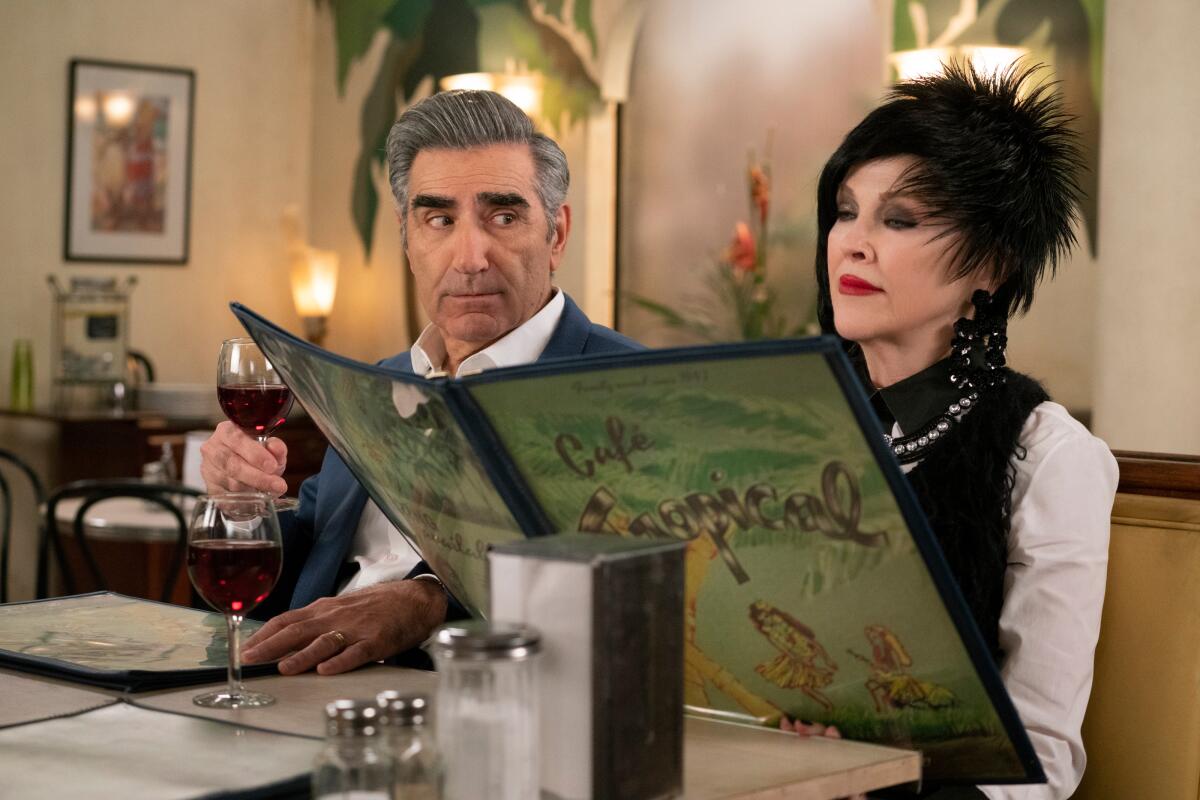
2015 | TV-14 | 6 Seasons | TV Comedies
Created by Eugene Levy and Daniel Levy
“Schitt’s Creek” focuses on the Rose family, defrauded of their fortune and forced, by their own inability to frame a better option, to live in two connecting motel rooms in a monetarily worthless town they happen to own. It’s a familiar idea on paper, but in execution it has a life all its own, and indeed the story of the rise of this plucky little comedy has been told many times now, like a folk tale.
At first most notable for starring two Canadian pillars of comedy who had worked together on and off since “SCTV” — Eugene Levy and Catherine O’Hara — it built slowly, then quickly, from a spark to a conflagration. It was the secret you couldn’t wait to share, and then suddenly the thing everyone you know was telling you about. (That is how it happened with me.) And it doesn’t take a degree in media studies to recognize that Netflix, which began streaming the series in 2017, was the bridge that carried that little engine from beloved obscurity to mainstream mania.
That TV’s little engine that could, did — culminating in an unprecedented Emmy sweep at an unprecedented Emmys — is only fitting, because “Schitt’s Creek” really is special. Its message of acceptance and self-acceptance, of welcoming love where it turns up — even within one’s own family — were just what some of us needed in an angry and divided time: a comedy that could reliably afford you a good cry. (Read more) —Robert Lloyd
45. Frasier
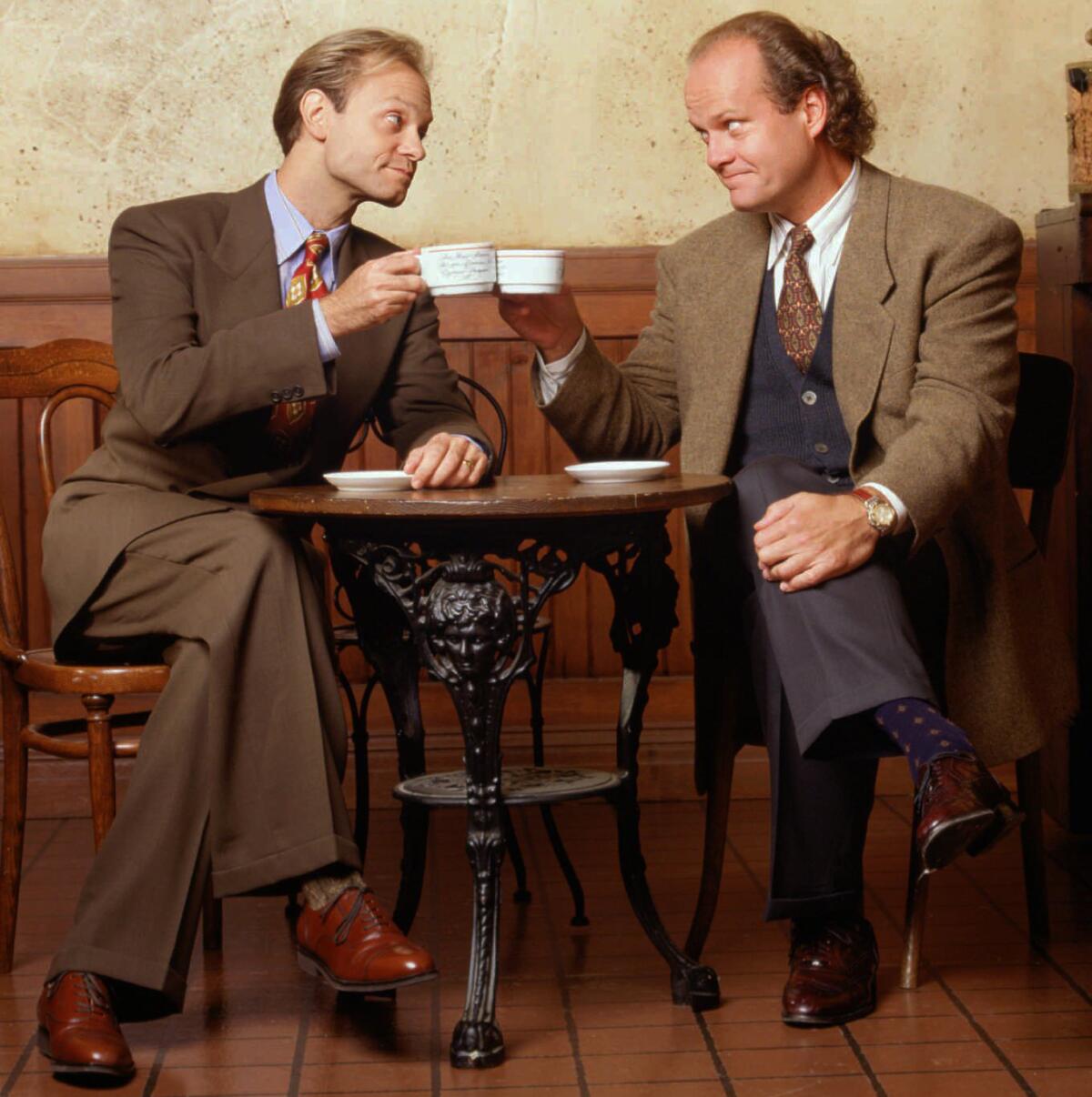
1993 | TV-PG | 11 Seasons | Comedy
Created by David Angell, Peter Casey and David Lee
“Frasier,” has that can’t-miss stamp, less from the humor it displays — which is promising — than from the fact that it spins off a popular “Cheers” supporting character. Kelsey Grammer returns to the boards as the pompously verbose but insecure psychiatrist from “Cheers.” Divorced Frasier Crane now has an advice-dispensing radio talk show in Seattle, his hometown. How successful is he? His producer (Peri Gilpin): “You kept referring to Jerry, the guy with the identity crisis, as Jeff.”
But Frasier’s problems are only beginning. His equally cultured, wordy and snobby psychiatrist brother, Niles (David Hyde Pierce), is Frasier with a touch of larceny, getting his sibling to take in and accept responsibility for their father (John Mahoney), a growling, beer-guzzling, disabled ex-cop who is the rough-hewn opposite of his silky, opera-loving sons.
If the premiere of “Frasier” does not manufacture laughs as consistently as one might expect from a “Cheers” offspring, it’s still a cleverly written show with a quality cast that bodes well for the future. Mahoney is superb as the father, who reveals his inner feelings grudgingly, and Grammer is a master of the witty response. (Read more) — Howard Rosenberg
44. Bob’s Burgers
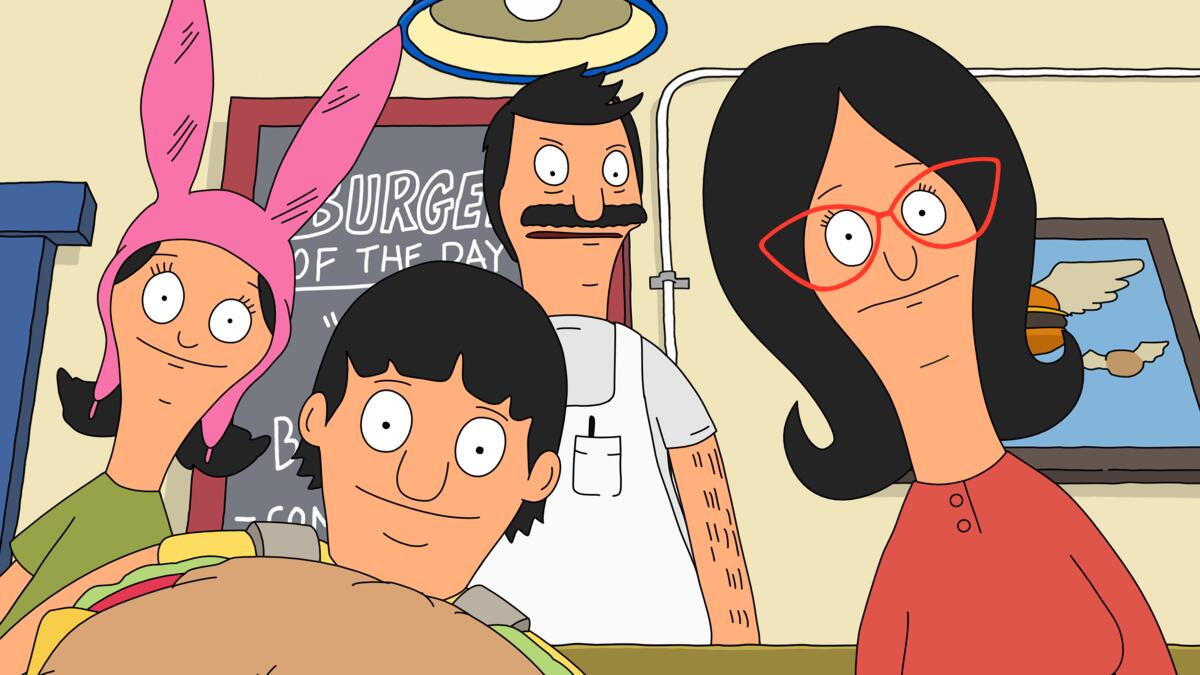
2011 | TV-14 | 13 Seasons | Animated comedy
Created by Loren Bouchard
In “Bob’s Burgers,” Bob Belcher (H. Jon Benjamin) and family run a struggling burger joint in what looks like a mid-Atlantic seaside town; as the curtain rises, the place is having a “re-re-re-opening,” with annoying son Gene (Eugene Mirman) dressed as a hamburger on the sidewalk and precocious younger daughter (Kristen Schaal) creating her own daily special: the Child Molester (“It comes with candy”). Later there is a visit from the health inspector, who has heard a rumor that there is human flesh in their meat and cautions Bob he will shut him down if he finds “anything above the 4% allowable by the FDA.” (Read more) — Robert Lloyd
43. Ramy
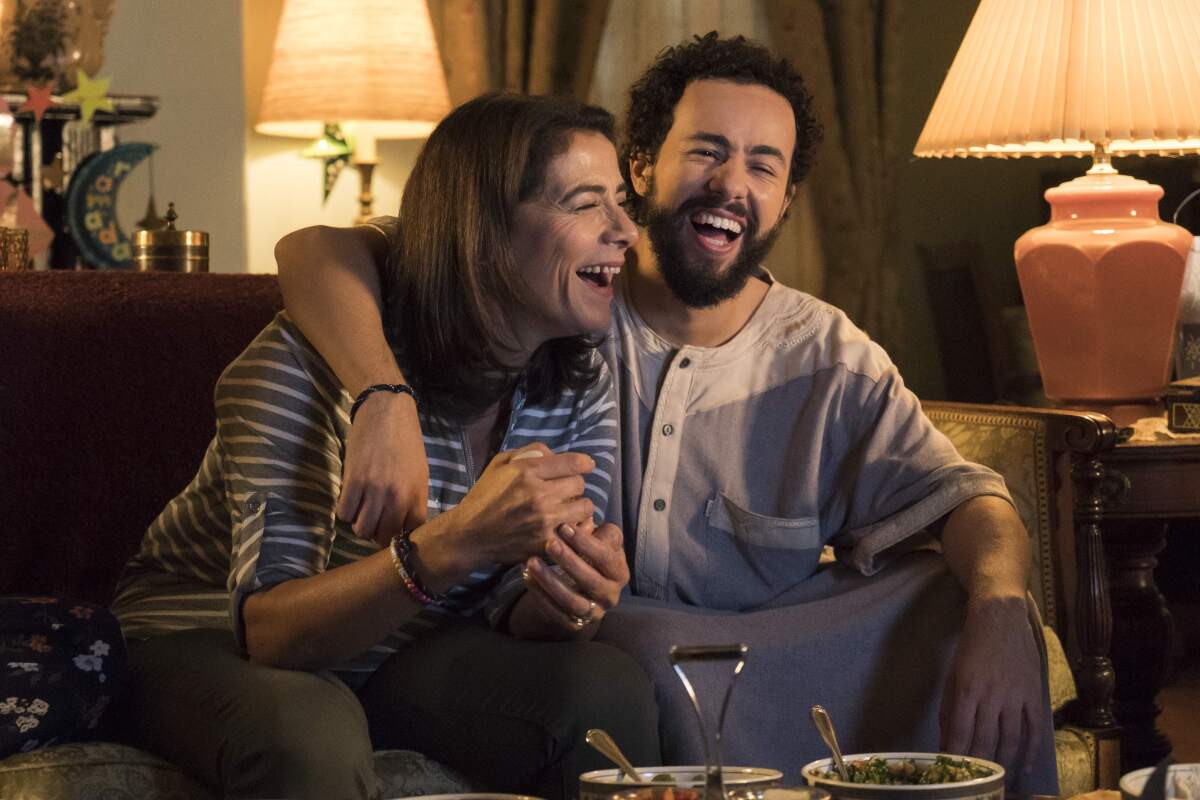
2019 | TV-MA | 3 Seasons | Comedy
Created by Ramy Youssef
Sex outside of marriage. Sex inside of cars. Sex as a 24-7 preoccupation. Hooking up, getting busy or whatever you choose to call it is central to Hulu’s new half-hour comedy “Ramy,” which wouldn’t be all that remarkable if the series wasn’t television’s first Muslim American sitcom.
Egyptian American millennial Ramy, who’s played by comedian and show co-creator Ramy Youssef, is an Allah-fearing Arab, but not the sort viewers are used to seeing on their screens. He doesn’t come with decimated war-zone scenery, a dusty keffiyeh headscarf or a Kalashnikov. Ramy is a shaggy, unsure 28-year-old in a baseball cap, rumpled T-shirt and jeans who still hasn’t kicked a childhood habit of smothering whatever’s on his plate with too much ketchup.
When he’s not searching for his next girlfriend or hanging out with his wheelchair-bound bestie Steve (Steve Way), he’s looking for a comfortable spot between his parent’s old world (a pre-Arab Spring Egypt) and the new world in which he grew up and still lives (suburban New Jersey). The tension between the two makes for some of the best culture-specific jokes — and universal situation comedy — around. (Read more) — Lorraine Ali
42. Sister, Sister
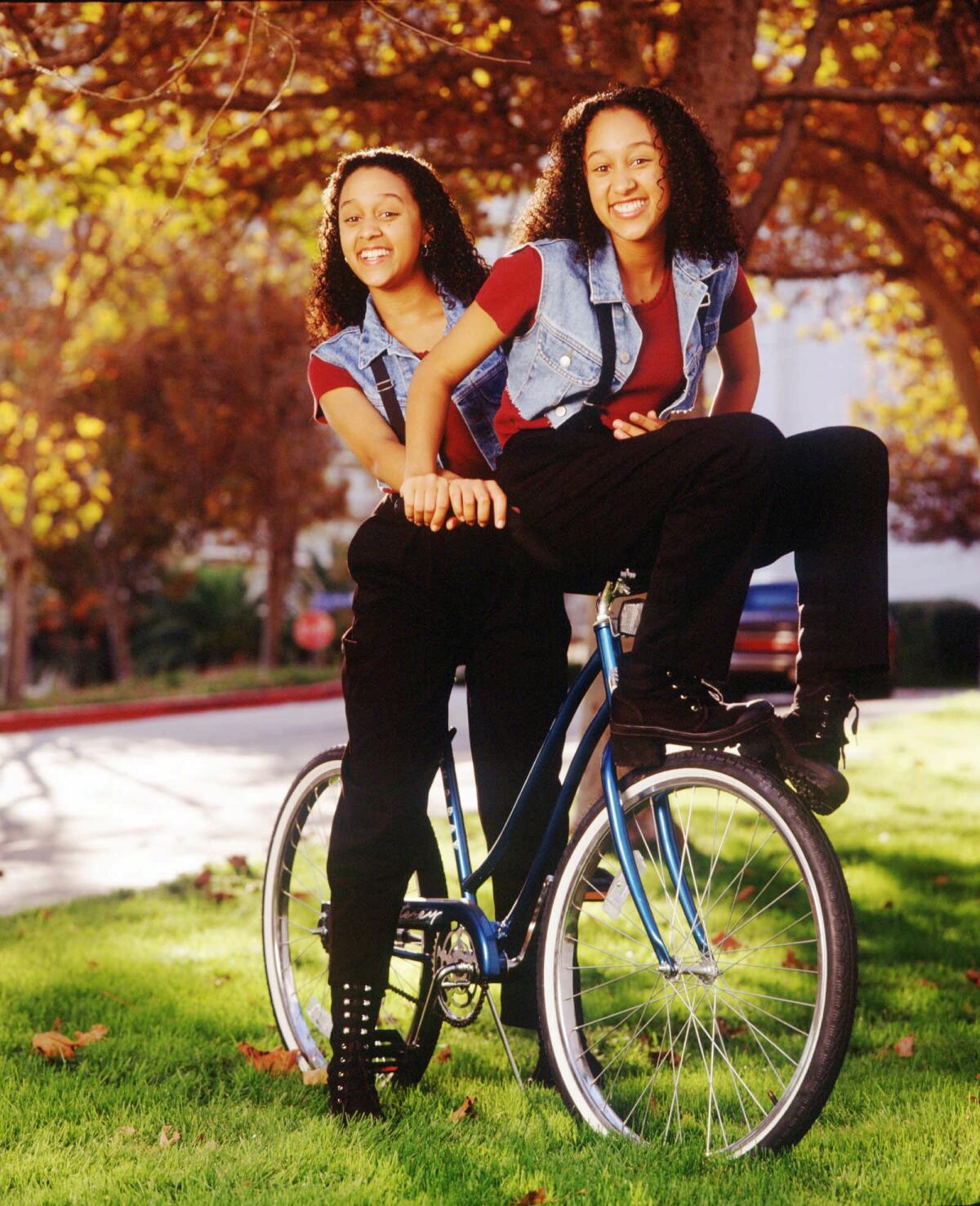
1994 | TV-G | 6 Seasons | Comedy
Created by Kim Bass, Gary Gilbert and Fred Shafferman
ABC’s “Sister, Sister” is an amiable comedy series about identical twins who reunite at age 14 after having been parted at birth and adopted separately. No big laughs but lots of smiles.
It introduces Tia and Tamera Mowry as Tia Landry and Tamera Campbell. Neither knows the other exists until they stumble upon each other while shopping with their respective adoptive single parents. Tamera lives with reserved, strait-laced, well-to-do Ray Bampbell (Tim Reid) and Tia with earthy, mouthy, pushy, jobless Lisa Landr (Jackee Harry).
Anyone who follows sitcoms will recognize what’s coming: Although the parents have nothing in common and don’t get along, the two families ultimately will merge under one roof, becoming a graceless, even dysfunctional foursome in the swanky Campbell home. (Read more) — Howard Rosenberg
41. Pam & Tommy
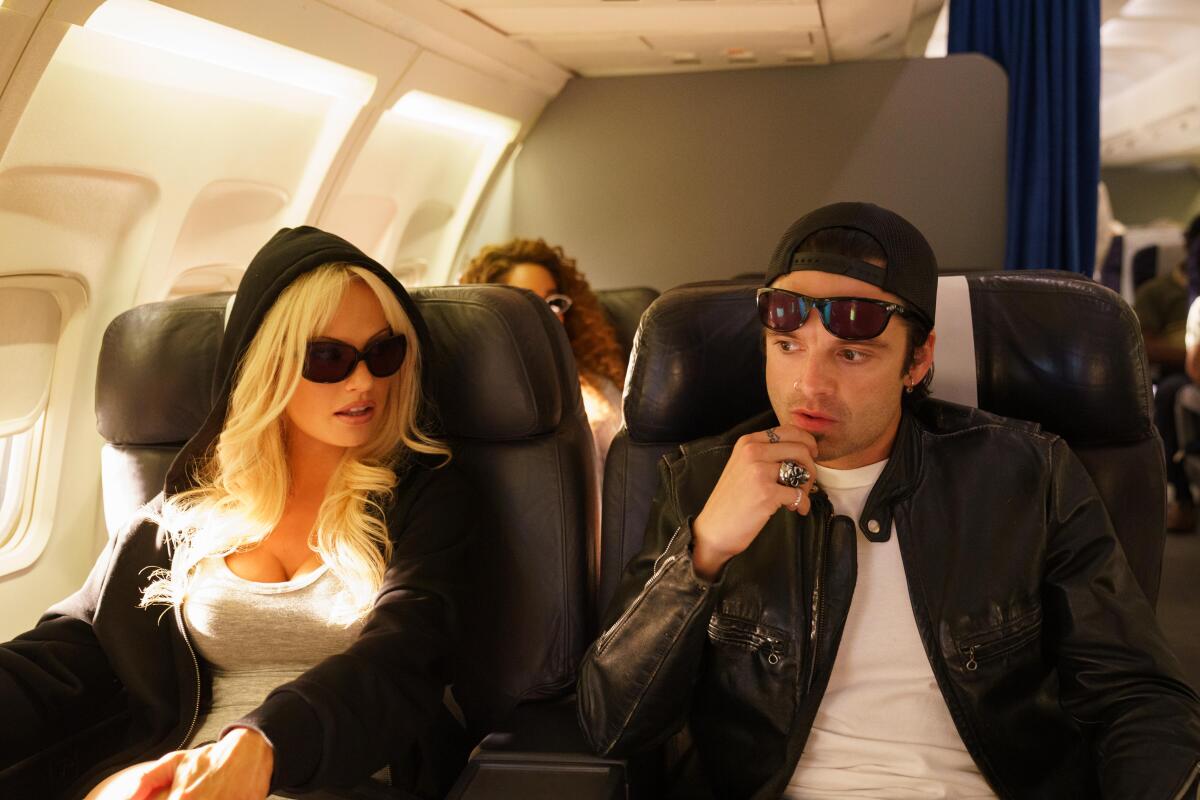
2022 | TV-MA | 1 Season | Drama
Created by Seth Rogen and Evan Goldberg
The limited series “Pam & Tommy” is a classic L.A. love story: Two beautiful, oversexed hotties with half a brain between them fall in lust, make a sex tape, suffer a burglary and inadvertently breathe new life into both the porn industry and their flagging careers.
Every subsequent tale of a star born from the tabloid whirlwind around a sex tape (see also: Kim Kardashian, Paris Hilton) traces its roots to the story of former Playmate and “Baywatch” star Pamela Anderson (Lily James) and Mötley Crüe drummer Tommy Lee (Sebastian Stan), turned here into a stupidly entertaining trip down memory lane. In this eight-episode series, directed in part by Craig Gillespie (“I, Tonya”), the 1990s’ queen and king of excess scramble to cope with the pressure and keep up with changing times as their intimate home video becomes the World Wide Web’s first viral celebrity sex romp. (Read more) — Lorraine Ali
40. Fargo
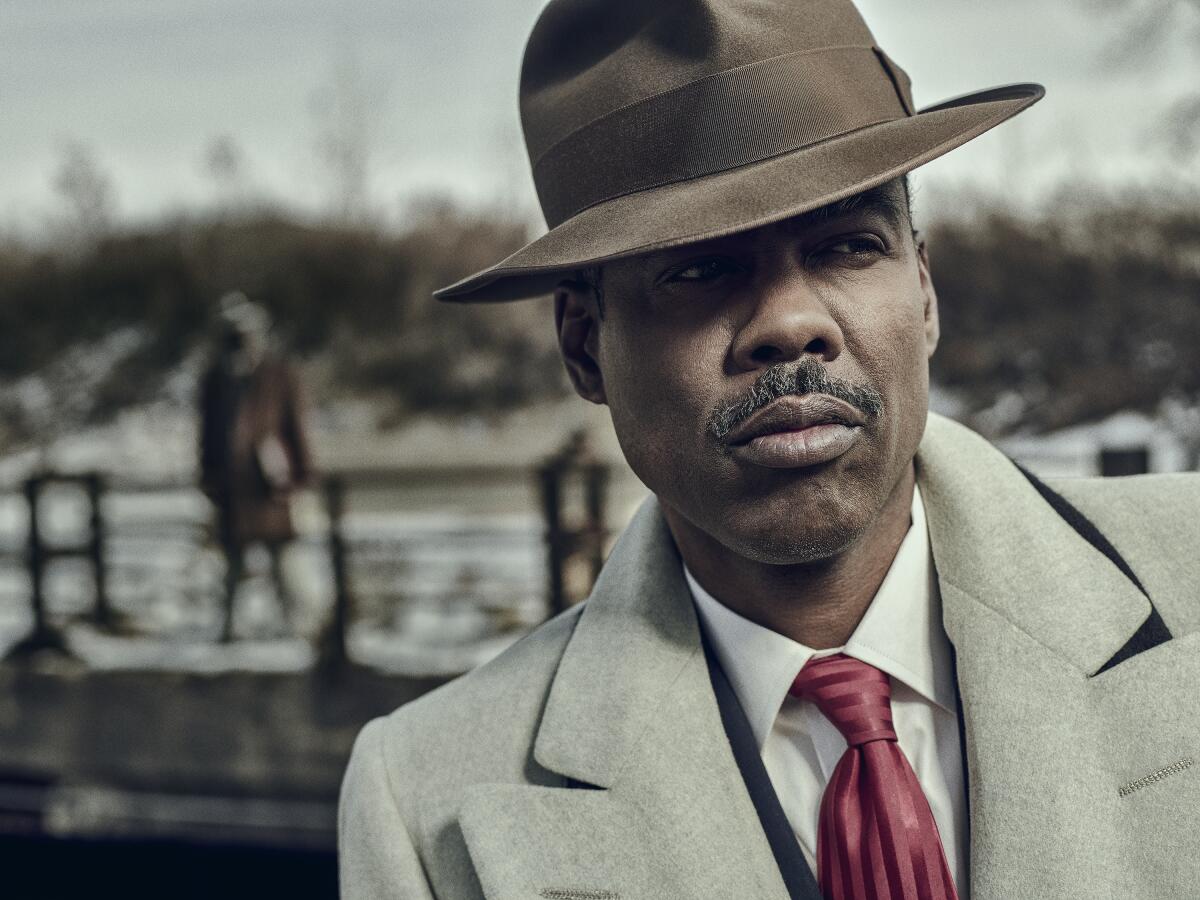
2014 | TV-MA | 4 Seasons | Anthology, drama
Created by Noah Hawley
It is only fitting that “Fargo” would make its way to television.
The Coen brothers’ 1996 comedy-noir masterpiece “Fargo” wasn’t so much a movie as it was a cultural event — you remember where you were when you first saw it. That endless yet claustrophobic snow scape, the anxious narcissism of William H. Macy’s scheming car salesman, the glory of Frances McDormand’s pregnant police chief Marge.
It blew out the wall between hilarity and horror to prove that both dwell in the same landscape. It showed that senseless violence was simply one more item on the spectrum of human behavior, alongside love and honor and courage. In many ways, this revelation led to the birth of modern television. Three years after “Fargo,” HBO debuted “The Sopranos,” which took the characteristics represented by “Fargo’s” characters and put them into one person: A mobster with panic attacks.
And so began TV’s obsession with excavating human consciousness via the most troubled characters we could create. The line between Macy’s twitchy Jerry Lundegaard and Bryan Cranston’s initially beleaguered Walter White is neither long nor terribly twisty; Walter just surrendered to his baser self more fully. (Read more) — Mary McNamara
39. The Dropout
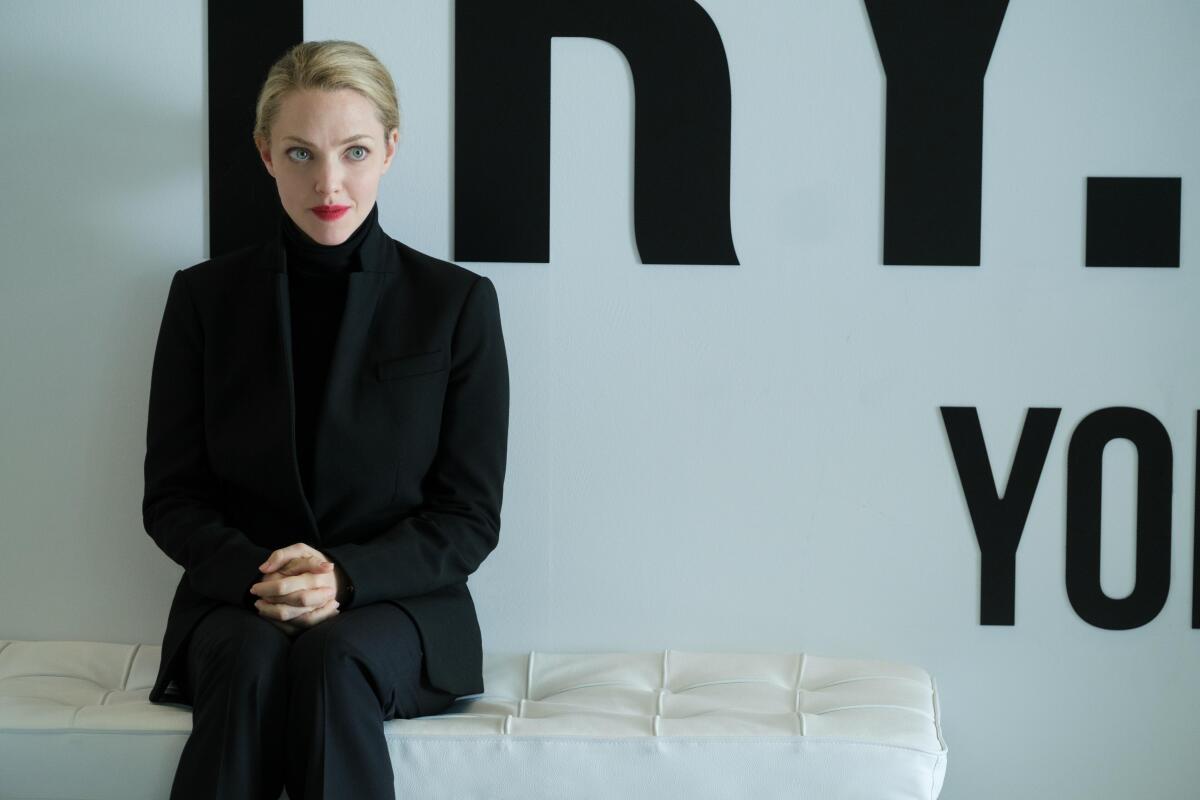
2022 | TV-MA | 1 Season | Miniseries, drama
Created by Elizabeth Meriwether
Liz Meriwether, the creator of “New Girl” and “Single Parents,” became fascinated with Elizabeth Holmes in 2019, much like the rest of us. She remembers being drawn in by a Vanity Fair piece that detailed the Silicon Valley wunderkind’s final months at her biotech company, Theranos, which promised to revolutionize blood testing but was ultimately consumed by fraud allegations. Intrigued by the dramatic story, she also listened to the ABC News podcast “The Dropout,” which detailed Holmes’ rise and fall.
In 2004, at 20, Holmes dropped out of Stanford University to launch the startup. At its peak in 2014, the company was valued at over $9 billion and Holmes was a darling of the New Yorker, Forbes and other outlets; by 2015, Holmes, then 31, was named the world’s youngest self-made female billionaire by Forbes. Just months later, the Wall Street Journal exposed shortcomings in Theranos’ technology, setting in motion the company’s, and Holmes’, staggering fall.
“The Dropout” is an eight-episode limited series, starring Amanda Seyfried as Holmes, that premiered on Hulu, two months after a jury found Holmes guilty of four counts of fraudulently deceiving investors. (Read more) — Yvonne Villarreal
38. The Bear
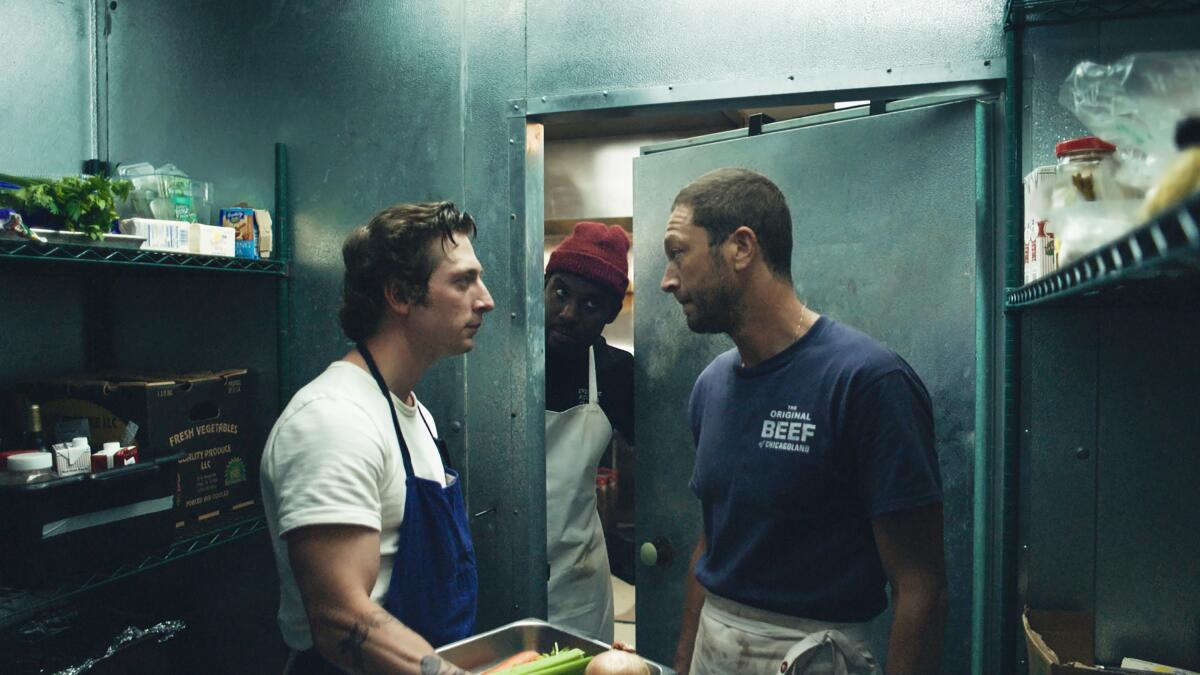
THE BEAR -- Pictured: (l-r) Jeremy Allen White as Carmen ‘Carmy’ Berzatto, Lionel Boyce as Marcus, Ebon Moss-Bachrach as Richard ‘Richie’ Jerimovich. CR: FX
2022 | TV-MA | 1 Season | Comedy, drama
Created by Chris Storer
“The Bear” is an extraordinary show, not so much for the story it tells as how it tells it; you will have to go far to find another show so invested in and adept at portraying ordinary human speech and behavior, and even then you might not find one.
The story is this. Jeremy Allen White plays Carmen Berzatto, called Carmy, and sometimes Bear, a talented chef who returns from the world of very fine dining to run a family sandwich shop, the Original Beef of Chicagoland, after the suicide of his brother. He plans to clean up the joint — on his hands and knees where needed — improve the food and professionalize the kitchen, to create “an efficient, respectable place of business, run by adults.”
And so the cooking staff are henceforth addressed as “chef,” knives are sharpened and new systems put in place. This sits less well with some employees than others, namely Richie (Ebon Moss-Bachrach), an irascible honorary cousin, who runs the front of the house but is often just underfoot, talking loudly; and passive-with-the-emphasis-on-aggressive Tina (Liza Colón-Zayas), who has been working there for years and has her own way of doing things. (She will call Carmy not “chef” but “Jeff,” as if she misheard the instruction.) By contrast, Marcus (Lionel Boyce), who has been baking bread for the sandwiches, is inspired to go beyond himself and sets out on a quest to create the perfect gourmet doughnut.
Into this hectic environment comes Sydney (Ayo Edebiri), hired as a sous chef, a Culinary Institute of America graduate with restaurant experience, a good deal of ambition and an awareness of Carmy’s reputation. “The Bear,” reduced to its basic structure, is “The Bad News Bears” (a film coincidentally mentioned here), in which a ragtag crew exceeds its own expectations, while the new boss earns himself a measure of redemption. It is delightful to watch these transformations, and, really, they are quite enough: the plot, such as it is, is secondary to the place and to the people. (Read more) — Robert Lloyd
37. What We Do in the Shadows
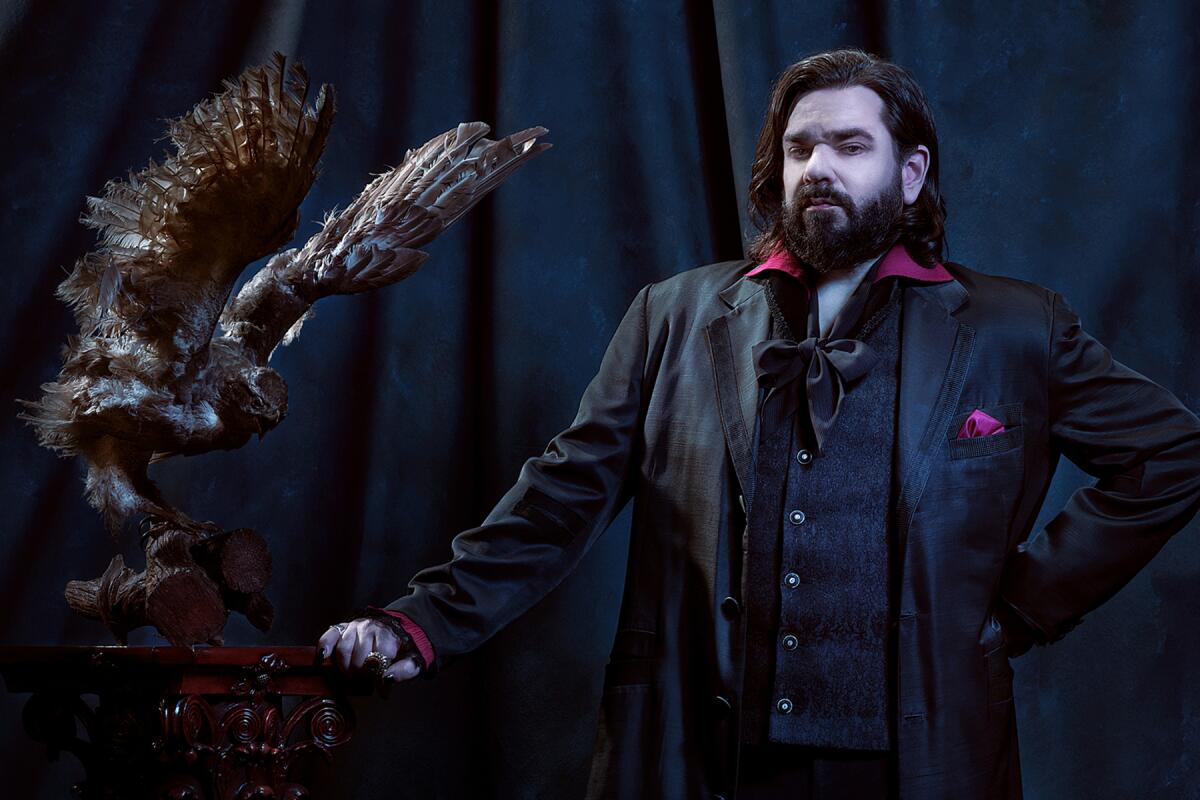
2019 |TV-MA | 4 Seasons | Supernatural, comedy
Created by Jemaine Clement and Taika Waititi
Vampires do not eat pizza, which is problematic for the main characters of the half-hour comedy, “What We Do in the Shadows.” They’re facing an eternity in Staten Island — which may be redundant — and what else is there to consume when the humans they feast upon taste sad?
The drawbacks of immortality meet the farcical realities of present-day suburban life in series created by Jemaine Clement (“Flight of the Conchords”). The series is carefully crafted and hilarious. For example, its undead include an “energy vampire” whose expertise is literally boring people to death, and who hasn’t had one of those in their lives?
The series’ juxtaposition of the supernatural and mundane is the perfect setting for a pack of underachieving vampires who’d rather stay home and bicker than subjugate mankind. The sharp-witted docu-satire follows them as they halfheartedly seek total control and dominance of the New World, as ordered by their returning master and Dark Lord. (Read more) — Lorraine Ali
36. High Fidelity
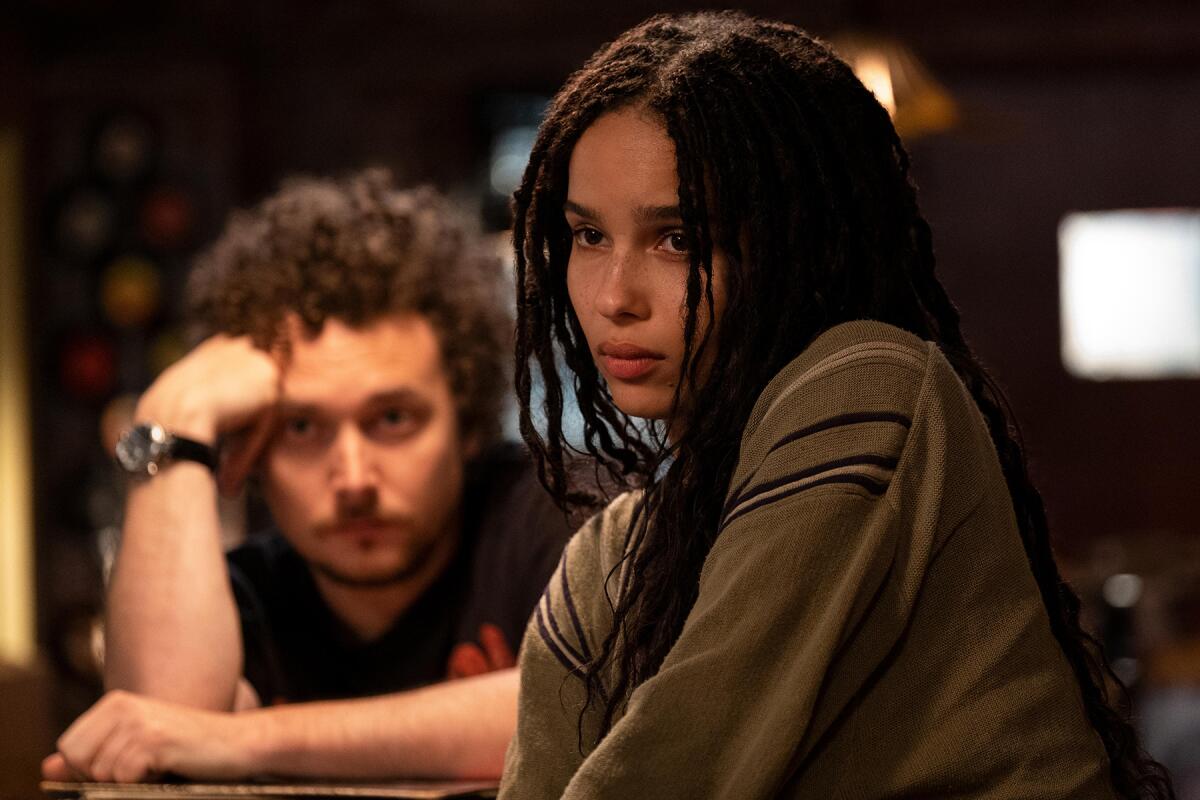
2020 | TV-MA | 1 Season | Comedy, drama
Created by Veronica West and Sarah Kucserka
“High Fidelity” updates the Nick Hornby novel/John Cusack movie about a record shop owner’s romantic misadventures. Developed by Veronica West and Sarah Kucserka, it’s set in Brooklyn (after the book’s London and the movie’s Chicago), which has not yet exhausted its use as a setting of hipster dramedy, and recasts the white male lead as black woman Zoë Kravitz.
Kravitz plays Rob, record store owner and current sad case. (The return of vinyl is fortuitous: Record stores are a thing again.) As in the film, Rob narrates to the camera — and, as in both earlier versions, will revisit old flames in the wake of a breakup to come to terms with the serial failures of her romantic life. (Kingsley Ben-Adir plays Mac, the super-catch she drives away; as we begin, she has been mourning their broken relationship for a year.)
Supporting her at work and in life are two temperamentally distinct employees — woolly-headed Simon (David H. Holmes) and permanently fierce Cherise (Da’Vine Joy Randolph) — who regard Rob with a kind of maternal concern. Some may find it a troubling mystery that their store, once again named Championship Vinyl, stays in business in a city of high rents, especially given the staff’s apathetic-to-hostile approach to customer service. (When a customer wanders in, that is, which is rarely.) Mostly, they play records, make lists and argue — say, over whether the moral failings of pop stars should prevent one from listening to their music. (Read more) — Robert Lloyd
35. Killing Eve
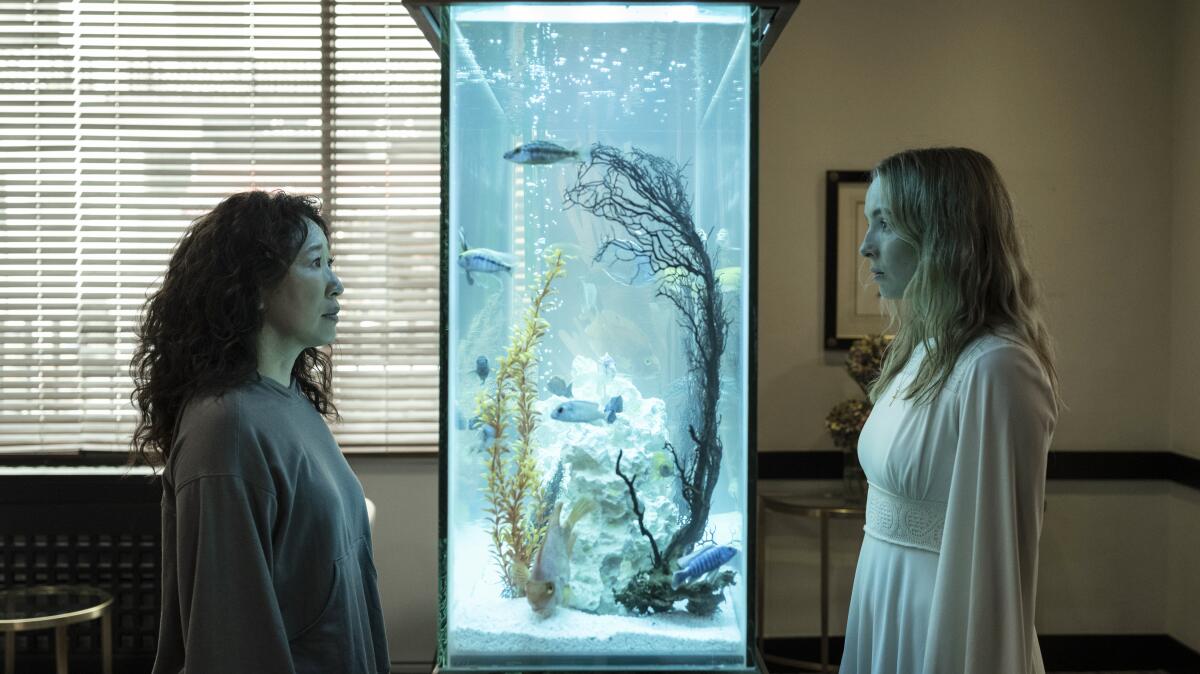
2018 | TV-14 | 4 Seasons | Mystery, drama, thriller
Created by Phoebe Waller-Bridge
“Killing Eve,” created by Phoebe Waller-Bridge from a series of novellas by Luke Jennings, collected as “Codename Villanelle,” is a witty and lively show, fast-paced and suspenseful when it needs to be but not afraid to slow down and let people talk, or to bumble amusingly. Waller-Bridge is also the creator of “Fleabag,” and those who know that series know she has a talent for writing spiky comedy and women who don’t quite fit the world around them, and here both the cat and the mouse — or cat and cat — are female.
The series begins quietly, with a sort of prologue in which a little girl and a woman we will come to know as Villanelle (Jodie Comer) regard each other across a Vienna ice cream parlor; it ends with the woman tipping the girl’s ice cream onto her lap as she exits, smiling.
Villanelle, it soon transpires, is a high-level professional killer, and Eve Polastri (Sandra Oh) is a very mid-level British intelligence operative with a side interest in criminal psychopathy.
Her somewhat obsessive extracurricular activities have led Eve, who dreams of a life in real espionage, to notice a connection between mysterious killings around the world. (They are connected, as is sometimes the case in such stories, by their apparent lack of connection.) One thing and another lead her into the orbit of Carolyn Martens (a formidable Fiona Shaw), legendary head of MI6’s Russia Desk, who thinks Eve might be on to something. (Read more) — Robert Lloyd
34. Modern Family
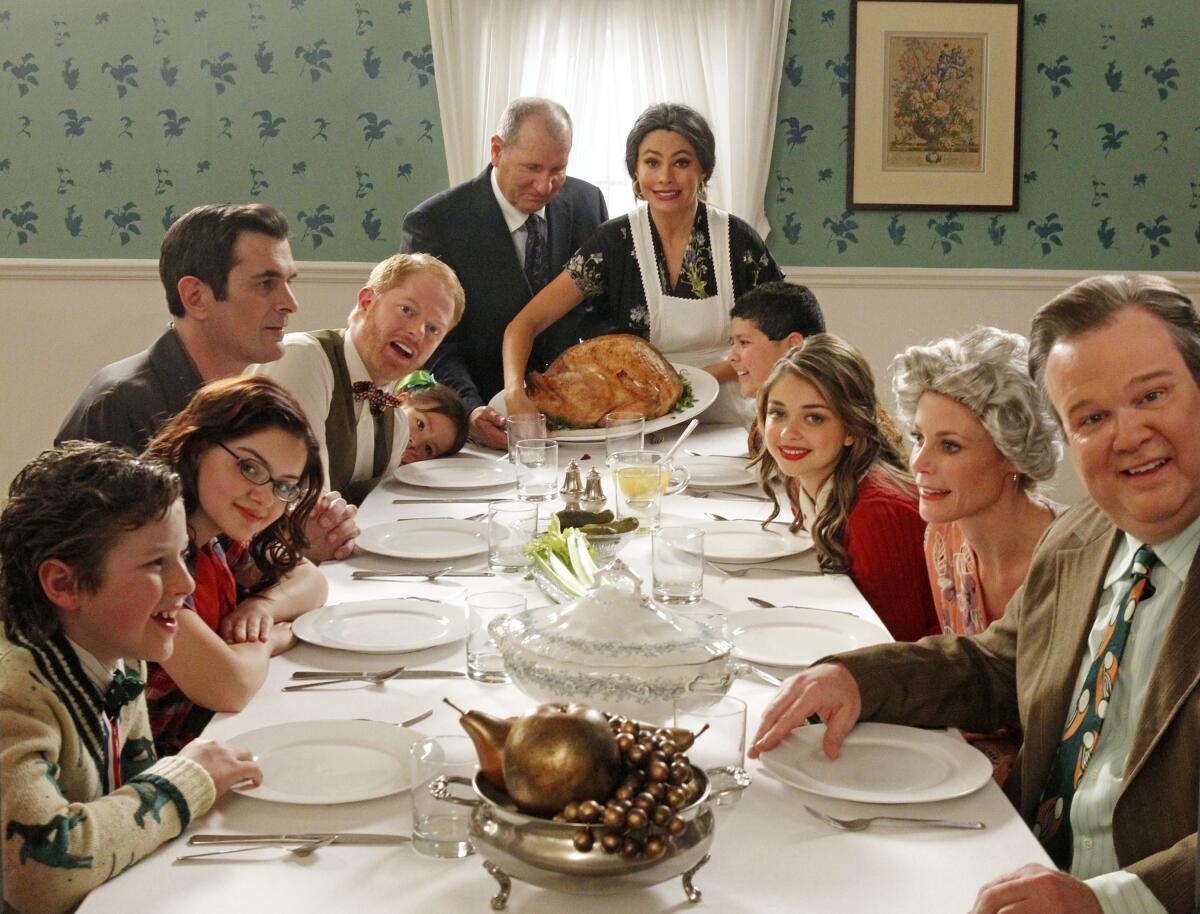
2009 | TV-14 | 11 Seasons | Comedy
Created by Steve Levitan and Christopher Lloyd
“Modern Family” should never have worked. Look at its components. Creators Steve Levitan and Christopher Lloyd assembled an ensemble cast of 10, four of whom were children. They even threw in a baby, for the love of Pete. The single-camera sitcom, premiering on ABC in 2009, employed a faux-documentary style that was never explained and a comedic mashup that combined edgy jokes, slapstick, clowning, “I Love Lucy” shenanigans and “Three’s Company” double entendres, all topped off with tender voice-overs. Lloyd and Levitan were in their office, trying to come up with series ideas and cracking each other up with stories about their wives and kids, when they realized those stories could be a series.
They conjured up the goofy magic-loving man-child Phil Dunphy (Ty Burrell); his uptight yet fearless wife, Claire (Julie Bowen); and their children, Haley (Sarah Hyland), Alex (Ariel Winter) and Luke (Nolan Gould). Next came Claire’s brother, Mitchell (Jesse Tyler Ferguson), also uptight but not as fearless; his husband, Cam (Eric Stonestreet), a down-home farm boy with a love for all things over the top; and their adopted Vietnamese baby, Lily (played by Ella and Jaden Hiller in Seasons 1 and 2, after which Aubrey Anderson-Emmons took over the role). Rounding out the group was Claire and Mitchell’s irascible father, Jay (Ed O’Neill); his gorgeous, fiery Colombian wife, Gloria (Sofia Vergara); and her urbane young son, Manny (Rico Rodriguez).
The roster made for an endless array of conflicts, and the style had the show jumping from one family to the next and added up to a smashing hit, as popular as it was critically acclaimed. The show racked up 18 Primetime Emmy Awards over 11 seasons. (Read more) — Lisa Rosen
33. black-ish
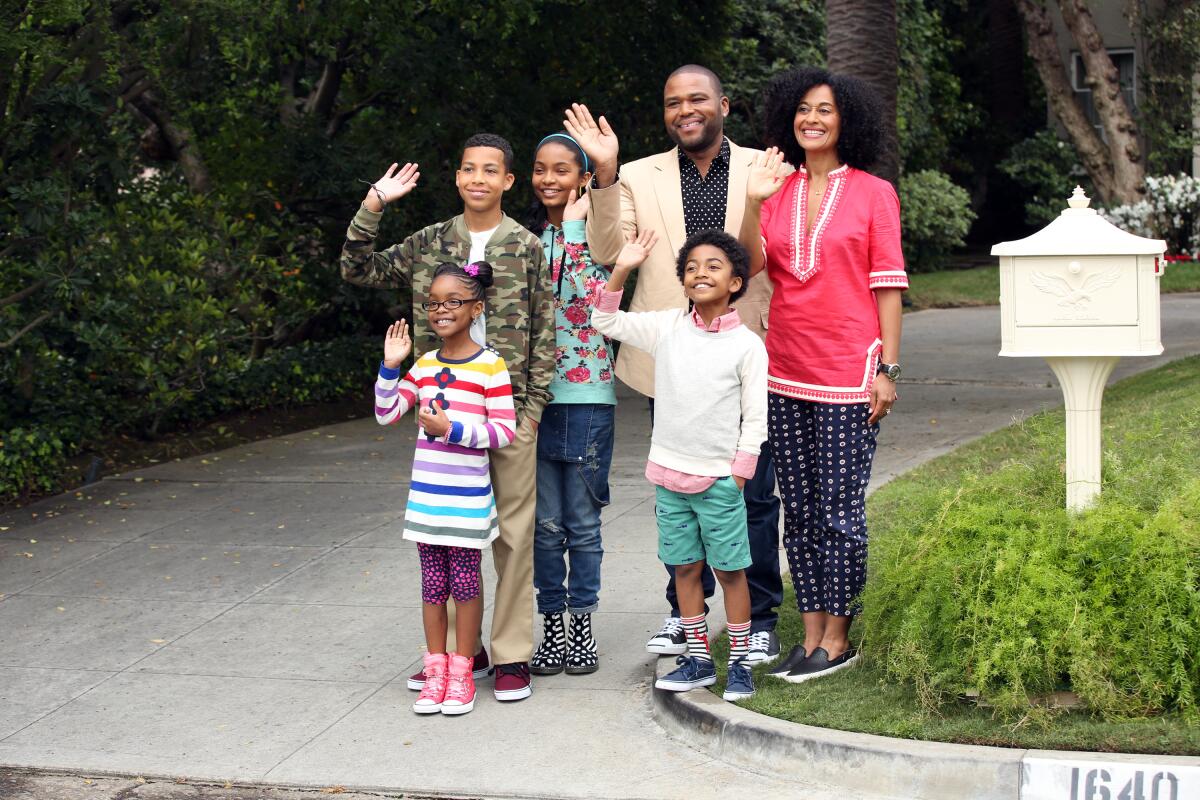
2014 | TV-PG | 8 Seasons | Comedy
Created by Kenya Barris
As its title implies, Kenya Barris’ “black-ish” will not be pussyfooting around political correctness. The series is about three generations of a black, upper-middle class Los Angeles family headed by two working parents. The Johnson family of “black-ish,” who also live the portico-and-walk-in-closet version of life in L.A., could be barbecue buddies of the Pritchett clan of “Modern Family,” which is the show’s central conceit and conflict. Having achieved his dream of rising from a rougher, more economically challenged part of town, Andre “Dre” Johnson (Anthony Anderson) is having a “wait a minute” moment.
A successful ad executive, he’s married to a biracial doctor (played by Tracee Ellis-Ross and rather pointedly named Rainbow) and father to four children. None of whom, he suddenly realizes, seems to know that they’re black, or at least Dre’s definition and experience of being black.
When his older son, Andre Jr. (Marcus Scribner), announces one morning that he is trying out for field hockey, would rather go by “Andy” than Andre and wants a bar mitzvah, Dre hits the roof. (Needless to say, the Johnsons aren’t Jewish.)
More pointedly, Dre’s exultation over an upcoming promotion is dampened when he is told that, yes, he has become his company’s first black senior vice president, but of the “Urban Division.” “Urban” being white-people code for “black.”
The humor goes broad, the emotion gets sticky sentimental more often than it has to. Although the frustrations Dre is experiencing are legitimate, he is something of a buffoon, stomping around, unable to express himself except in tantrums, and quickly backtracking to the position of “I just want my family to be happy.” (Read more) — Mary McNamara
32. Normal People
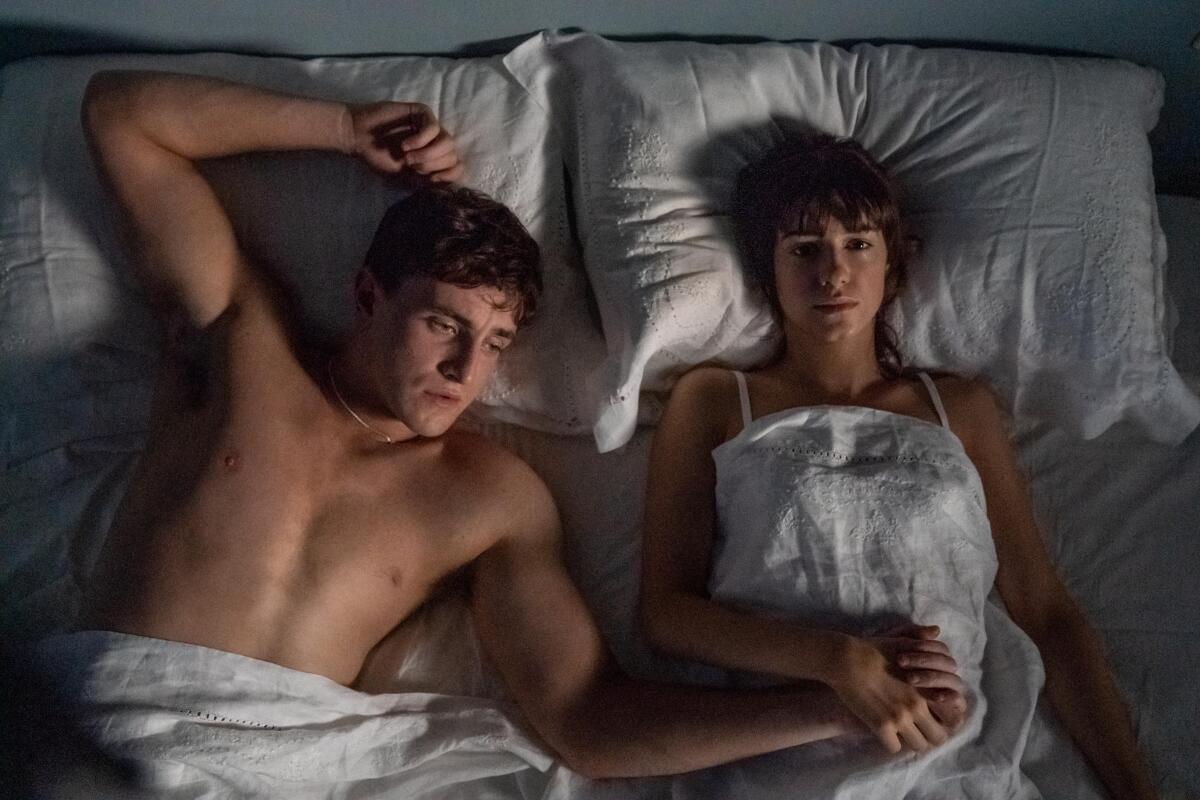
—which Sally Rooney co-adapted from her novel of the same name.
2020 | TV-MA | 1 Season | Drama, romance
Created by Lenny Abrahamson
While shooting “Normal People” in Ireland, the filmmakers and crew had an unofficial motto: “The book is the bible.”
By book, of course, they meant Sally Rooney’s evocative, award-winning novel, “Normal People,” which was snapped up by Element Pictures and the BBC before it even hit U.K. shelves in 2018. Rooney says she felt little hesitation offering her story up for the screen — provided the creative team behind it sparked to the ideas in the text. The result, 12 carefully wrought, 30-minute episodes, is a remarkably nuanced, intimate rendition. (Read more) — Emily Semler
31. Hill Street Blues
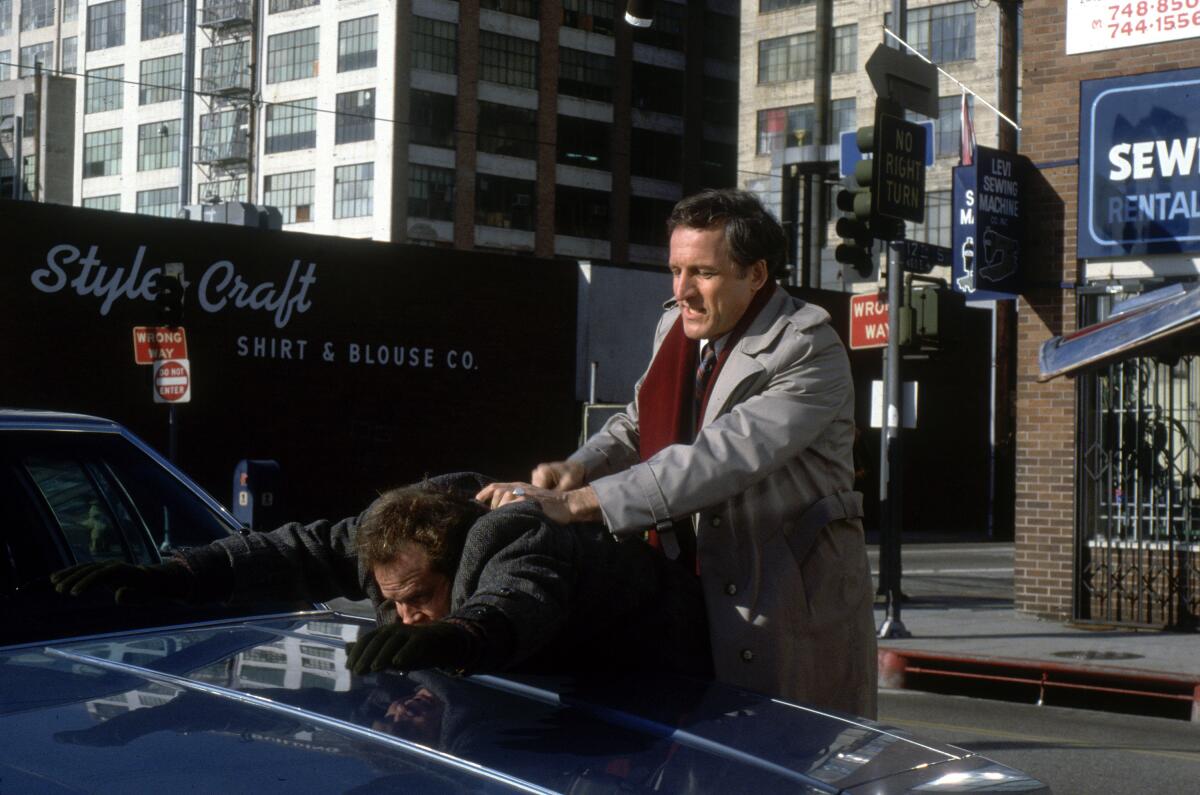
1981 | TV-14 | 7 Seasons | Police drama
Created by Steven Bochco
It’s always risky judging a series from its pilot, which may not necessarily be representative. But I’ll chance it anyway. NBC’s new “Hill Street Blues” is the most promising TV drama I’ve seen in years. The performances and direction, the tone, the look, the impeccable production values, the honesty, the approach to controversial social issues put the pilot into a rarely achieved stratosphere for TV shows.
This is a police series from MTM Enterprises, set in a precinct house in a poor urban neighborhood. There’s a skillful, subtle use of satire here within a stern drama that matches the best of “Police Story” in exploring the man beneath the badge. Yet it goes further, confronting hot issues as police racism in black neighborhoods. For the most part, the script is excellent and so is the cast.
Although NBC takes more chances these days than CBS and ABC, networks generally don’t walk tightropes without a dozen safety nets. So what in the world is “Hill Street Blues” doing on a network schedule? It must have slipped by when everyone was looking at “Real People.” (Read more) — Howard Rosenberg
30. My So-Called Life
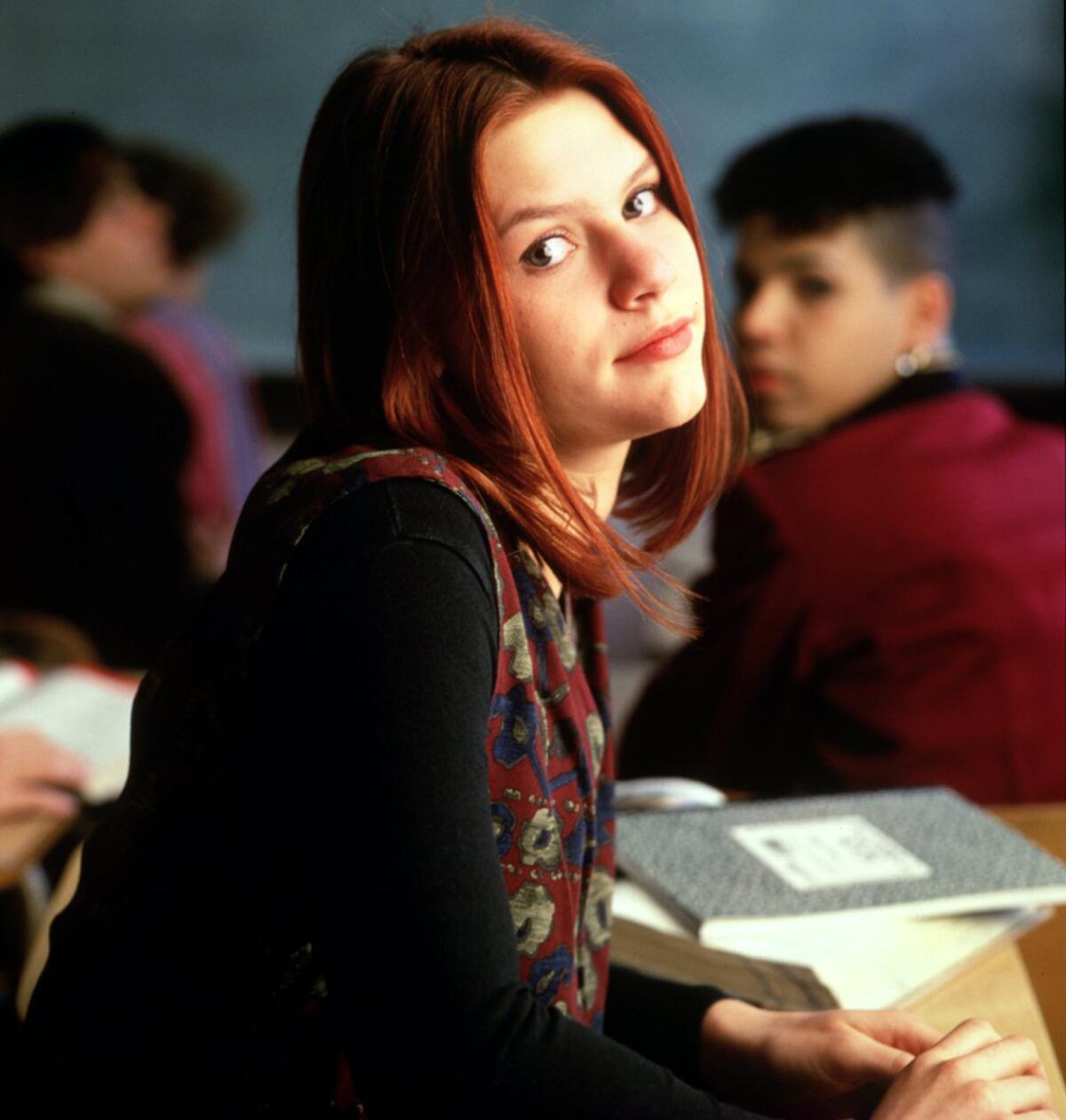
1994 | TV-14 | 1 Season | Teen drama
Created by Winnie Holtzman
Although considerably smarter than average, “My So-Called Life” is the latest in a very long line of prime-time series about youths coping with their changing lives and their parents coping with them. In other words, a sort of “Beverly Hills, 90210,” minus the lobotomy.
It’s an apt curtain raiser for a 1994-95 season in which newness and sameness glom together indistinguishably, but “thirtysomething” glistened from its inception with a seductive uniqueness that this latest series does not initially share.
Despite good intentions, some smiles and some moments that may ring excruciatingly true for both teens and former teens (to say nothing of their parents), “My So-Called Life” often makes you feel less like a witness than an exhausted chaperon for its subculture of hyperventilating sophomores.
Teen Angst and parental hand-wringing hover smoggily over the stylish, Holtzman-written, Scott Winant-directed premiere (the best of four episodes made available for preview), as almost immediately the zits hit the fan. For reasons even she can’t define, mopey 15-year-old Angela Chase (Claire Danes) impulsively colors her straight hair crimson.
The brooding self-consciousness that seems so genuine in Angela, is a credit to Danes’ effortless performance. Her nervous body language speaks volumes, as do her character’s private thoughts, delivered as part of a voice-over narration in the manner of “The Wonder Years.”
Dippy teens, dippy parents. The question: If you’ve experienced it once in real life, do you want to endure it again? (Read more) — Howard Rosenberg
29. Beverly Hills 90210
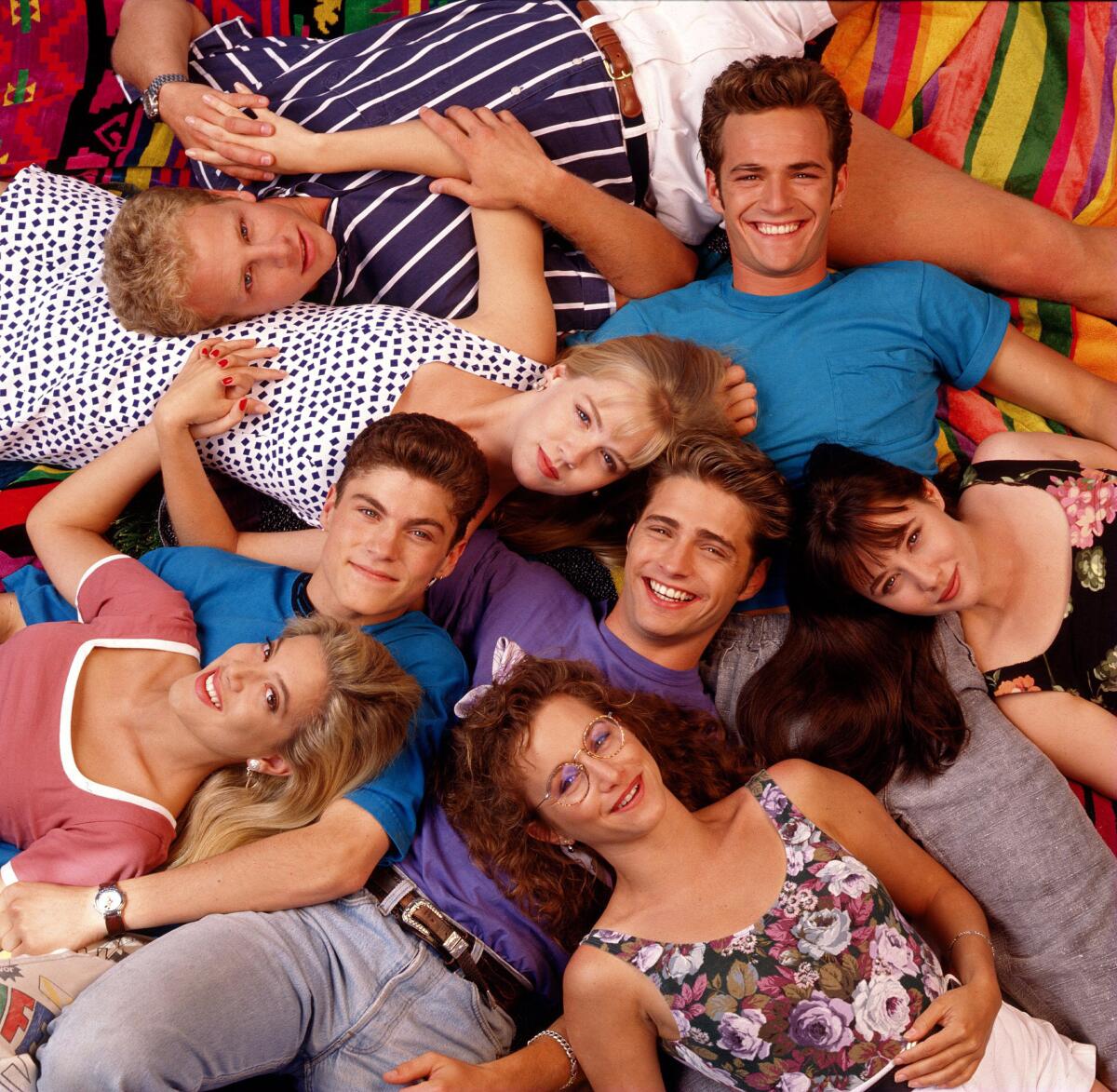
1990 | TV-PG | 2 of 10 Seasons | Teen drama
Created by Darren Star
You’ve been sitting on the edge of your seats and holding your breath waiting for this beauty, right? So here it is, the Fox drama series that “explores the realities and myths of social classes in Beverly Hills.”
As opposed to Tarzana.
The 90-minute premiere of “Beverly Hills, 90210” gives you the feeling you’ve been watching for 90 days.
Here’s the scoop: A family from Minneapolis, where the values are good, moves to Beverly Hills, where the values are bad. The opening story is about assimilation, with 16-year-old twins Brandon and Brenda Walsh (Jason Priestley and Shannen Doherty) pitting their great values against the lousy values of their rich, pampered and hedonistic classmates at West Beverly High.
Whose values win? It looks pretty bad for Brandon and Brenda at first, but, well, you can take the kids out of the Midwest, but not the Midwest out of the kids. (Read more) — Howard Rosenberg
28. The Office (U.K.)
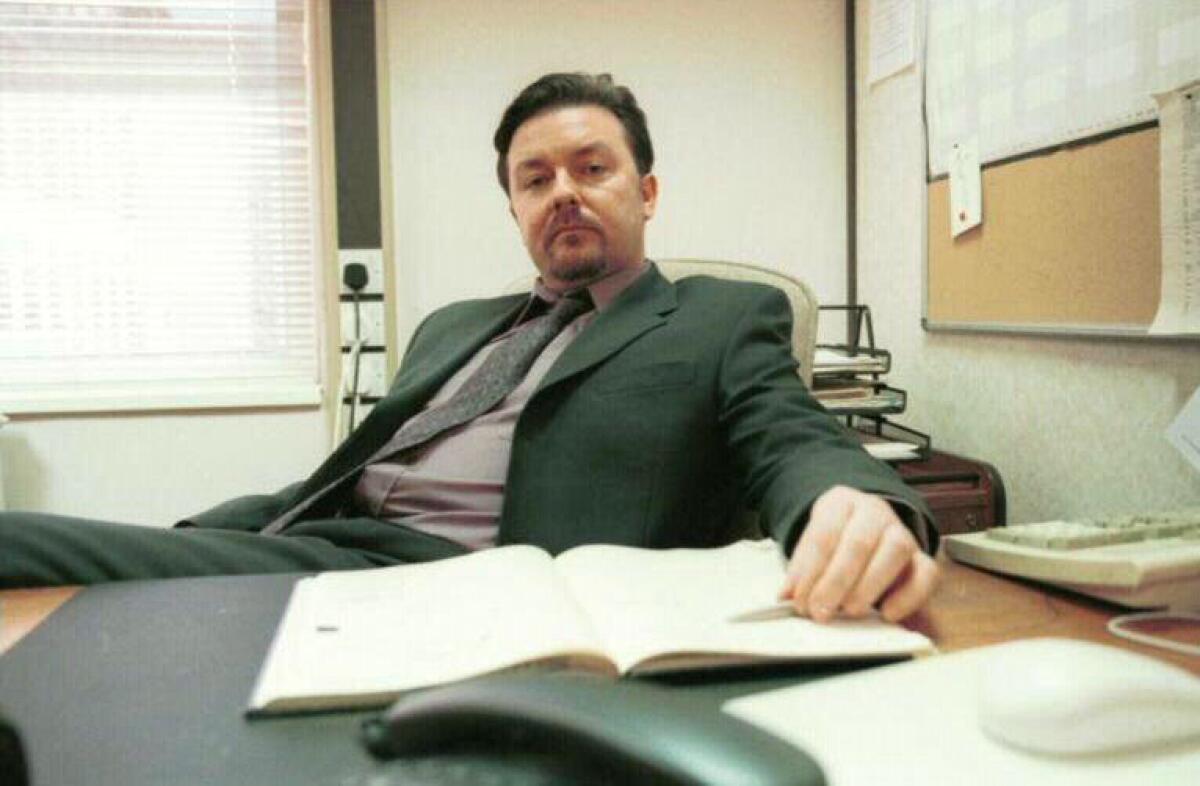
2001 | TV-MA | 3 Seasons | British comedy
Created by Ricky Gervais and Stephen Merchant
The brilliant British mock-documentary workplace tragicomedy “The Office” generates a tension so awful, from circumstances so awfully lifelike, that you have to watch at times from behind laced fingers, with teeth clenched and the remote control close at hand.
Its nearest American equivalent, and an evident inspiration, is HBO’s late “The Larry Sanders Show,” while “Spinal Tap” and subsequent Christopher Guest mockumentaries are also clear precursors; but what it resembles most of all perhaps are the actual institutional documentaries of the great Frederick Wiseman (“The Store,” “Hospital”) — clearly a comedy first.
Workplace comedy — and this is possibly the first in which the characters actually call the place they work a “workplace” — is a television staple, but most TV offices resemble only marginally the places real people work. They miss the hermetic airlessness of the modern office, and if they are not set glamorously at, oh, I don’t know, a newspaper or a magazine or a television or radio station, they are at least set somewhere colorful — in a taxi garage, a bar, a hotel.
Ricky Gervais plays David Brent, self-promoting office manager and self-styled comedian. If David is in one sense just another in a long line of comic characters who’s funny because he doesn’t know he’s sad, there is in his desperate need to be liked, and in his inability to make anyone like him, a struggle nearly tragic. David is doomed: He has ascended to his level of mediocrity with nowhere to go but down. He has no life outside of the office, knows no one outside his company; his primary relationship is with the camera that for some reason has come to record him and the people under him and the people above him. His eyes keep shifting helplessly toward the lens. It’s a desperate, hysterical performance.
The story plays out in accumulated fragments rather than lengthy scenes and is built up from moments outside the interest of most shows: surreptitious reaction shots, embarrassed silences, asides, spied-upon private exchanges. And never has so much depended on the eyes: We watch the people of Wernham Hogg as they watch one another, in attitudes of yearning, disgust, embarrassment, hopelessness, amusement, amazement, occasionally something like hope or happiness. It is all unspeakably beautiful. (Read more) — Robert Lloyd
27. Atlanta
2016 | TV-MA | 4 Seasons | Comedy
Created by Donald Glover
Donald Glover, who broke up one of television’s great comedy teams — his Troy to Danny Pudi’s Abed — when he left “Community” in its penultimate season, returned with a series of his own. As naturalistic as “Community” was fantastic, “Atlanta” is subtle and human, a beautifully played comedy of place and character.
“Atlanta” sets a tone that is a little melancholic but not pessimistic; it’s aspirational in a minor key. It is critical in an interested, even amazed, way about people, while managing not to judge them.
Glover plays Earn, a young man back home in Atlanta after an unspecified time away, living “low-key” with no clear plans. A sophisticated, intelligent and in many respects helpless sort of person going about with a backpack that might contain all his worldly goods, he is “technically homeless,” though more or less living with Van (Zazie Beetz), the mother of their baby daughter. The ground beneath their inchoate relationship shifts from scene to scene.
Things start to change when he discovers that Paper Boi, a local rapper, having some street-level success, is his cousin Alfred (Brian Tyree Henry); he looks him up to offer himself as a manger.
Alfred and his right hand, Darius (Lakeith Stanfield), are, in their way, the Troy and Abed of “Atlanta.” Physically, as well as temperamentally, they’re its Laurel and Hardy. Darius is a character whose TV ancestors run back to Maynard G. Krebs, but whom Stanfield makes specific and new. (Read more) — Robert Lloyd
26. Community
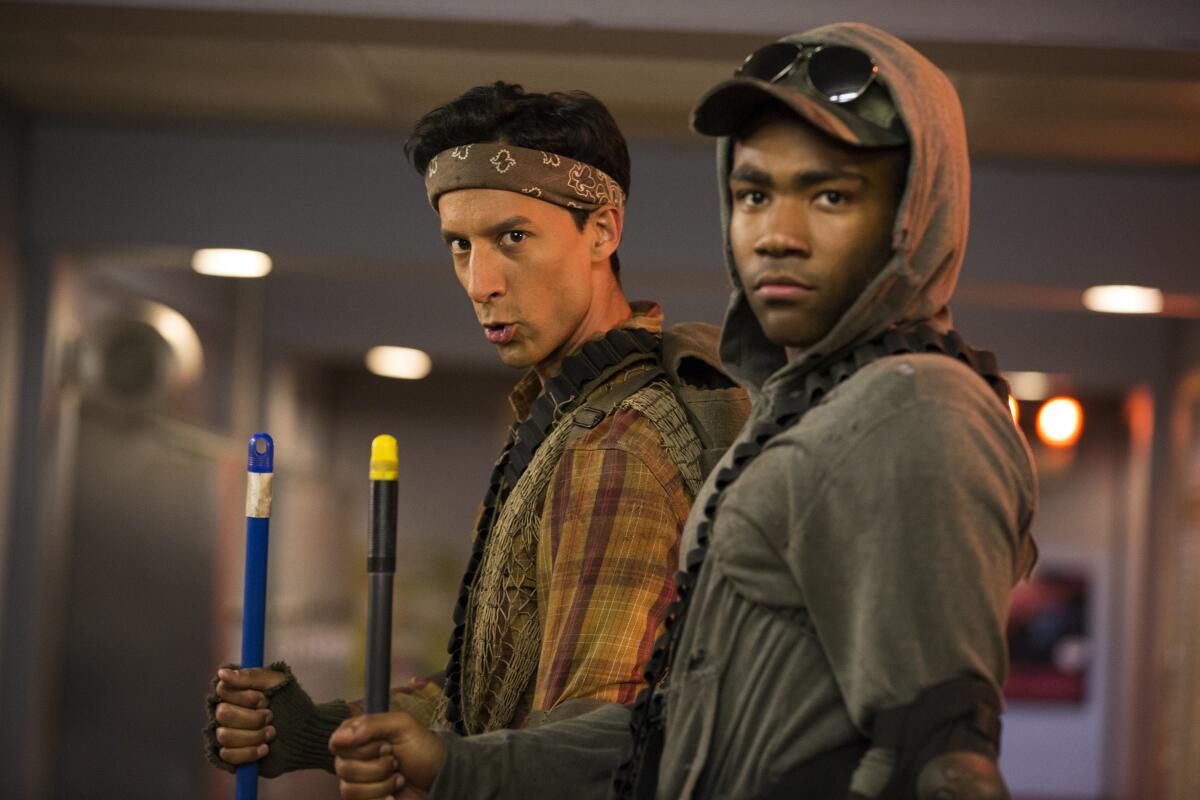
Community -- NBC TV Series, “Geothermal Escapism” Episode 504 -- Pictured: (l-r) Danny Pudi as Abed, Donald Glover as Troy -- (Photo by: Justin Lubin/NBC)
2009 | TV-14 | 6 Seasons | Comedy
Created by Dan Harmon
Dan Harmon, who seems from afar to present an unusual mix of dishevelment and perfectionism, is the creator of “Community” which is “a show set in a community college,” to steal a description of the show from the show itself, and it achieves a tricky balance of cynicism, sentiment and surreality.
It stars Joel McHale, Gillian Jacobs, Dani Pudi, Alison Brie, Ken Jeong and Jim Rash as a collection of geeks and weirdos allowed run of the school. Donald Glover, Yvette Nicole Brown, Chevy Chase, John Oliver and Jonathan Banks were early regulars; Keith David and Paget Brewster were cast in later seasons.
“Community” is not the first show to make a point of its own artifice. But something special does happen here; the show lives in consciousness of its own construction in a kind of existential but also dramatically meaningful way.
Somehow, with all its genre parodies, cultural allusions and self-referential knowingness — not despite, but because of them — it becomes a show about the struggle for authenticity and connection, as lived both by the characters within and the creators without it. (Read more) — Robert Lloyd
25. Cheers

1982 | TV-PG | 4 of 11 Seasons | Comedy
Created by Les Charles, Glen Charles and James Burrows
Created by executive producers-writers Les and Glen Charles, and director James Burrows, “Cheers” premiered Sept. 30, 1982, to critical acclaim but little audience response. NBC languished in third place. Sitcoms appeared dead. But “Cheers” endured, thanks to then-NBC President Grant Tinker and CEO Brandon Tartikoff, who insisted on giving quality shows a chance to develop. “Cheers” slowly built a loyal following, and by its third season cracked the Top 20. It survived the death in 1985 of Nicholas Colasanto, who played bartender Coach, and the departure of Long in 1987. Not only has it placed in the Top 10 every season “Cheers” has received 111 Emmy nominations and won 26 Emmys, tying “Hill Street Blues,” second only to “The Mary Tyler Moore Show,” which won 29 of the awards durings its run. (Read more) — Susan King
24. The X-Files

1993 | TV-14 | 11 Seasons | Science fiction, mystery, drama
Created by Chris Carter
“The X-Files” is a sort of alien busters , a not-to-be-taken-seriously hour in which a pair of FBI sleuths investigate unexplained cases that appear to involve paranormal phenomena.
For some reason, maverick agent Fox Mulder’s creepy superiors want to discredit his probes of the allegedly supernatural. So they assign Mulder (David Duchovny) a partner to spy on him to help them debunk his work. She’s agent Dana Scully (Gilliam Anderson), a medical doctor and a skeptic. She’s a scientist, he’s a romantic. She has doubts, he has answers.
Their first case together (a routine investigation into aliens controlling humans through nose implants) takes them to an Oregon town where Mulder believes the victims were abducted before dying.
“By who?” she asks.
“By what?” he corrects her.
He’s attractive and she’s comely, and the subtle sexual tension between them is at least as compelling as their cadaverous adventures. Mulder appears to win Scully’s confidence even with such otherworldly dialogue as: “When convention and science offer us no answers, might we not finally turn to the fantastic as a plausibility?” (Read more) — Howard Rosenberg
23. Abbott Elementary
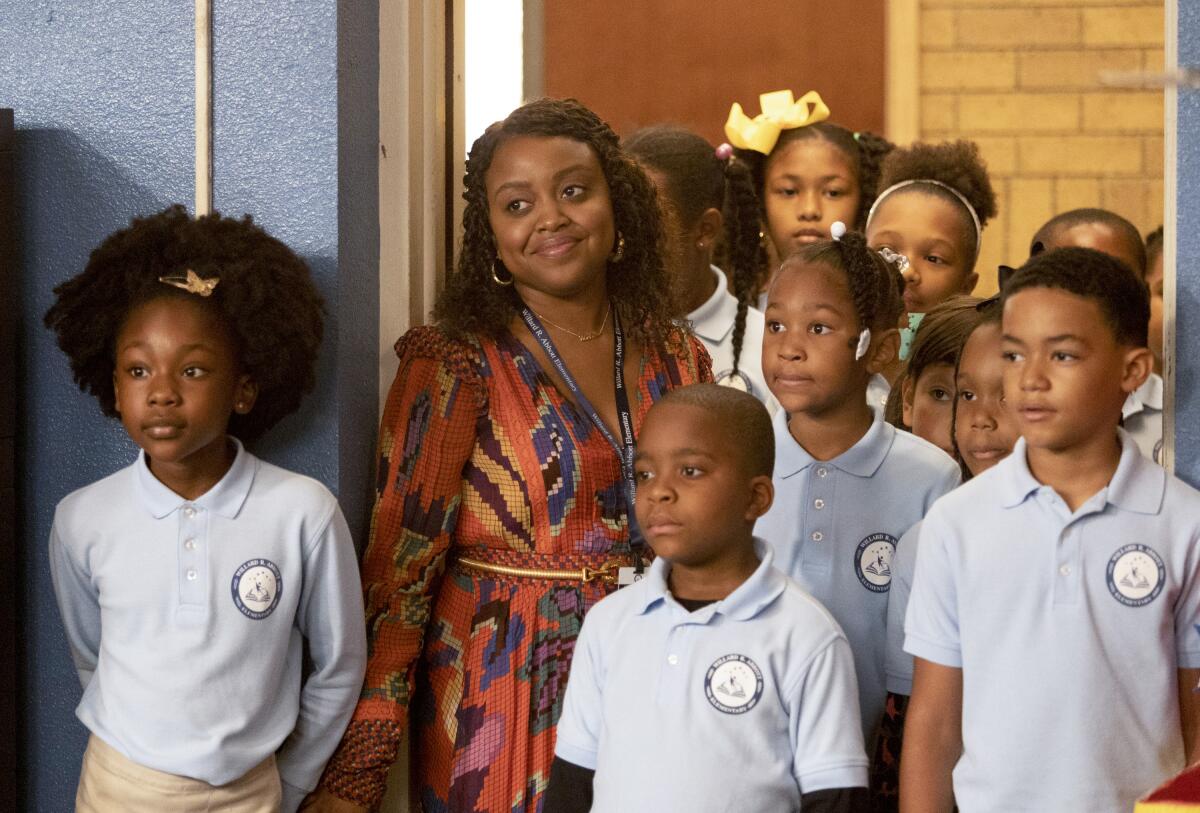
2021 | TV-PG | 2 Seasons | Comedy
Created by Quinta Brunson
You can watch the delightful “Abbott Elementary” with your kids or your grandparents without embarrassment. Created by Quinta Brunson, one of the pillars of the first season of “A Black Lady Sketch Show,” it stars Brunson as Janine Teagues, a teacher embarking on her second year at a Philadelphia elementary school, eager and optimistic despite practical hardships and how much she still has to learn about managing a classroom. “Look,” she says in the pilot, “I know this school is rough, but I became a teacher to make sure students get out alive.”
Presented mockumentary style, the series feels fresh even as it mines the familiar. As much as the characters represent an agglomeration of types, they are well written and the actors invest them with life. Surrounding Brunson are Sheryl Lee Ralph as a no-nonsense, 20-year veteran on whom Janine has a professional crush; Lisa Ann Walter, another old hand, as a South Philadelphia Italian with “connections”; Chris Perfetti as a fellow newish recruit, painfully conscious, when not conscious enough, of being a white teacher in a Black school; Tyler James Williams, who arrives in the pilot as a substitute and seems positioned as a romantic possibility for Janine (they meet cute over a malfunctioning toilet); and the quite hilarious Janelle James as the self-interested principal: “If you don’t respect me,” she tells her staff, “you don’t respect this school… It’s mathematically impossible.” (Read more) — Robert Lloyd
22. Broad City
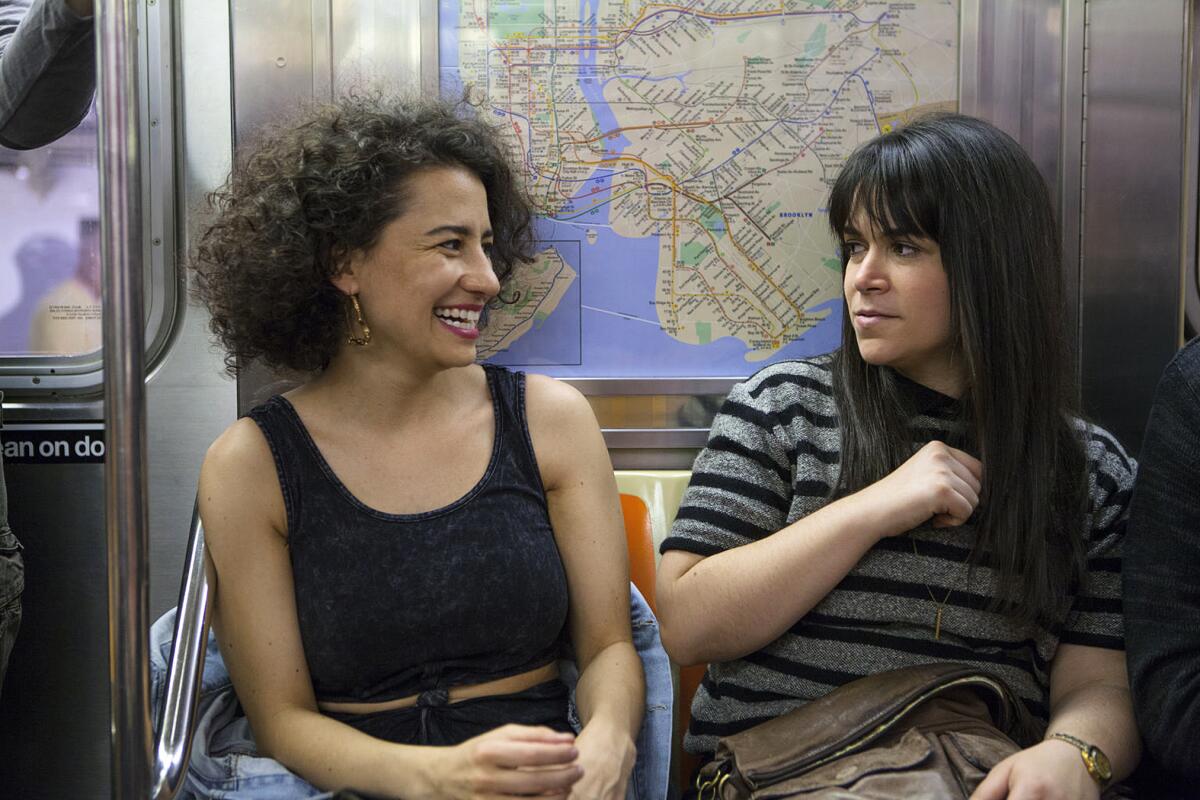
2014 | TV-14 | 5 Seasons | Comedy
Created by Abbi Jacobson and Ilana Glazer
Abbi Jacobson and Ilana Glazer are the talented stars and creators of “Broad City,” a delightful, knockabout comedy. The pair met in 2007 at the New York branch of the Upright Citizens’ Brigade, the comedy franchise that has become the Second City/Groundlings of its generation as a magnet for and refiner of new comic talent.
As a story of girlfriends living in New York in their 20s, it is superficially like “Girls” (and “2 Broke Girls,” for that matter), though much closer in concept and attitude to the late “Flight of the Conchords,” another scruffy urban comedy that takes occasional flight into the surreal. There is nothing “ladylike” about the humor, which roots around in sex and drugs and sundry icky things, but it is, by definition, female. (Read more) — Robert Lloyd
21. Dopesick
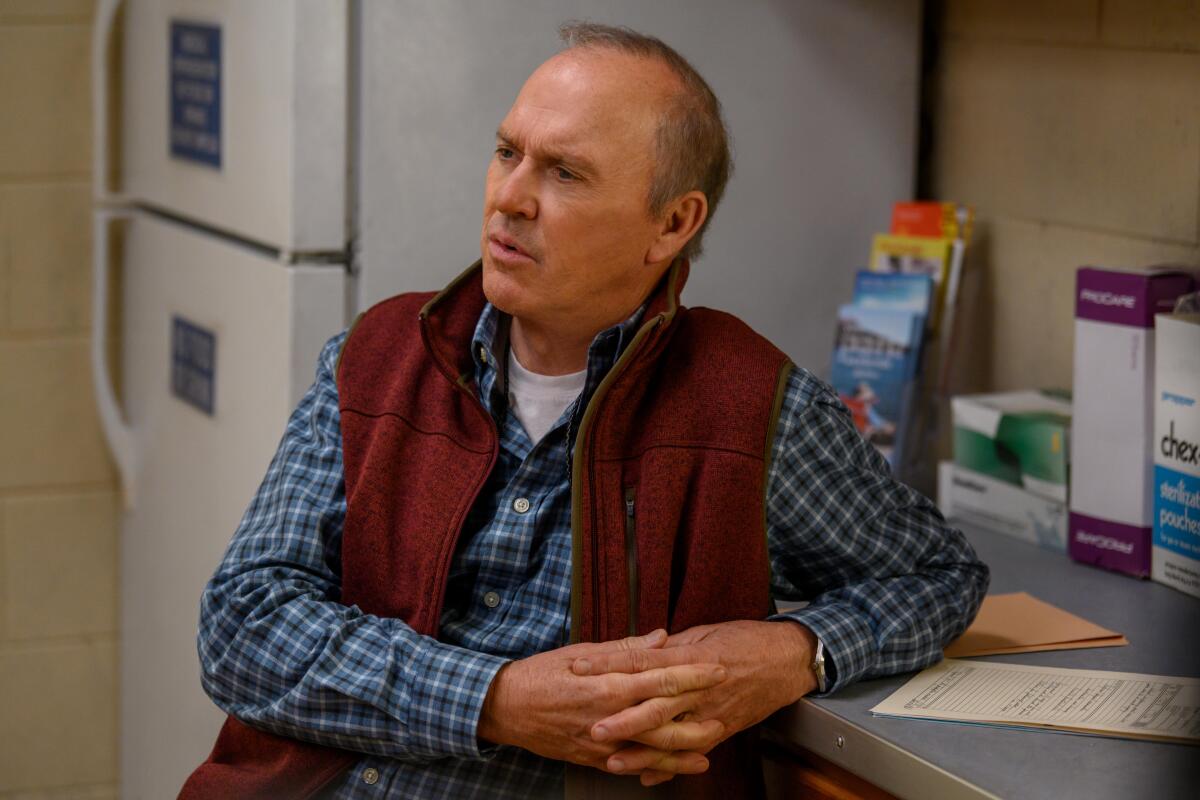
2021 | TV-MA | 1 Season | Drama
Created by Danny Strong and Michael Keaton
The OxyContin epidemic, which has been going on for a couple of decades and change, is the subject of the miniseries “Dopesick.” It joins Alex Gibney’s documentary “The Crime of the Century,” Patrick Radden Keefe’s book “Empire of Pain,” and a trio of episodes of John Oliver’s “Last Week Tonight” in shining a harsh spotlight on the drug’s manufacturer, Purdue Pharma; the family who owns it, the Sacklers; and the Food and Drug Administration, which, by omission and commission, essentially colluded in allowing a dangerous, addictive narcotic to be marketed as safe and nonaddictive.
The show moves back and forth between contrasting environments: the Appalachian mining town where Michael Keaton’s Dr. Samuel Finnix practices; the cushy, emotionally sterile world of the Sacklers; and functional government offices and courtrooms, with side trips to diners, posh restaurants, fishing spots and an Arizona resort.
As Finnix, Keaton is the embodiment of the good country doctor. He tells fish stories during an examination, drops in every night to make sure an elderly patient has taken her pills and is sympathetic toward young patient Betsy Mallum (Kaitlyn Dever, so memorable in “Unbelievable”), who works in the mines, is gay and afraid to come out. (Mare Winningham and Ray McKinnon play her unsympathetic parents, sympathetically.) Almost inevitably, Finnix is a widower, and that his wife died in pain from ovarian cancer is a character-determining detail. (Read more) — Robert Lloyd
20. The Great
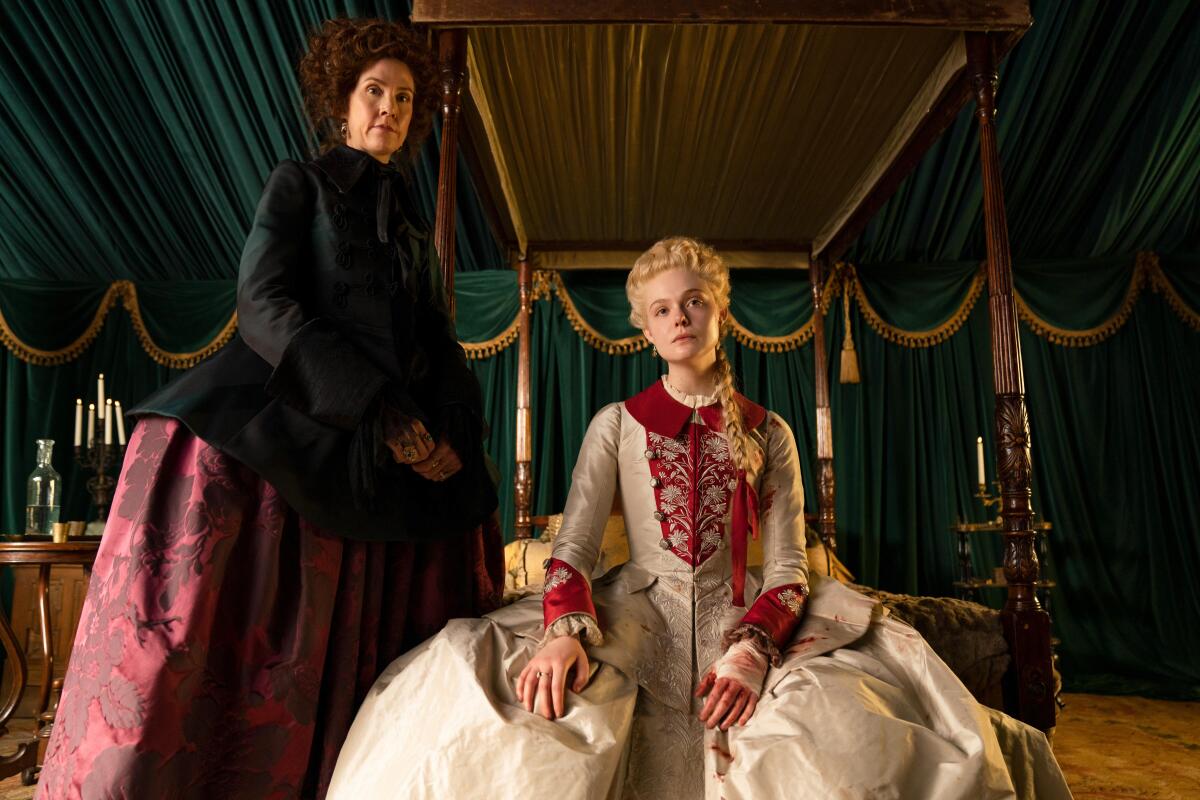
2020| TV-MA | 2 Seasons | Historical comedy, drama
Created by Tony McNamara
And so we come to our second quality television series about Catherine II of Russia in the space of seven months, “The Great,” with a marvelous Elle Fanning as the 18th century Russian empress. (Helen Mirren played her, at a later age, in HBO’s “Catherine the Great” last October.) The two series could not be any more different — “The Great,” written by Tony McNamara (“The Favourite”) and based on his 2008 stage play, is a fanciful dark comedy — or differently interested in the facts.
“The Great” is subtitled “An occasionally true story,” and even that adverb is generous. It is true that Catherine was betrothed to Peter III of Russia as a teenager, and would go on to rule the country after deposing her husband in a military-backed coup. It is true, as seen here, that she didn’t like him much; was influenced by French philosophers; was an early adopter of smallpox vaccination; and that though German by birth felt Russian in her soul. The rest is mostly made up, altered — including the details of the true things above — or simplified, the actual politics of 18th century European wars and dynasties being too baroque for a 21st century television viewer to be bothered with. (Read more) — Robert Lloyd
19. History of the World, Part II
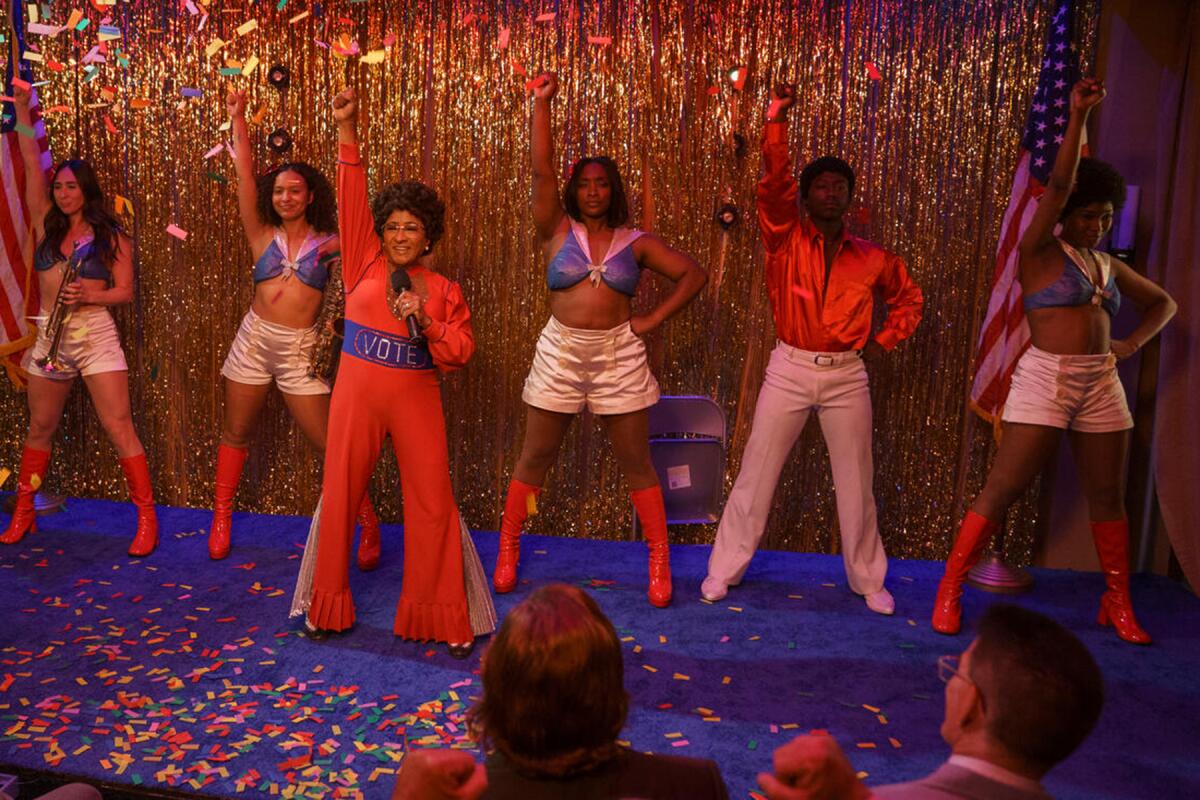
Wanda Sykes, front, in “History of the World, Part II” on Hulu.
2023 | TV-MA | 1 Season | Historical comedy
Created by Mel Brooks
Mel Brooks began his show business career in television, writing for Sid Caesar at the dawn of the medium. He returned in the mid-1960s to co-create “Get Smart,” and now he is back again, with Hulu’s “History of the World, Part II,” a sequel to his 1981 film “History of the World, Part I.”
That film, a series of sketches set in the Stone Age, ancient Rome, the Spanish Inquisition and Revolutionary France, is not the one by which he will be best remembered, or would likely want to be, but it is the one Brooks movie that suggests a second edition, with the possibility built into the title. Given that it is among his lesser films, I was not at all sure what to expect from the series, and though it takes a moment to get up on its legs, once it established its rhythms and breadth, I was completely sold.
“History of the World, Part II” is both a sequel and a redemption — vulgar, funny, fun and smart about history and the modern world. It has been made with (and one might guess primarily by) other, younger hands — well, they would have to be, given that Brooks is 96 — but it’s recognizably School of Mel, with an added air of tribute and celebration.
Most notable, and most visible, among his new collaborators are Ike Barinholtz, Wanda Sykes and Nick Kroll, who take a number of roles throughout the show’s eight episodes. All are credited as executive producers and writers (as is Brooks, or “American treasure Mel Brooks,” as he introduces himself), and with its mix of short pieces and longer, intercut continuing stories, its media and social media parodies, it formally resembles Kroll’s great “Kroll Show.” (Kroll himself is the series’ most Brooks-ian presence, especially in his role as a shtetl purveyor of mud pies, though he also pays homage to Gene Wilder’s “I’m hysterical” scene from “The Producers.”) Brooks, who starred in the movie (“maybe a mistake,” he admits at the top), does not appear onscreen here, at least not in his own body, but he narrates, in a customary tone of excitement, and his voice alone — a cultural memory running back 62 years to when he and Carl Reiner first took their “2000 Year Old Man” routine public — does much to set the stage. (Read more) — Robert Lloyd
18. Only Murders in the Building
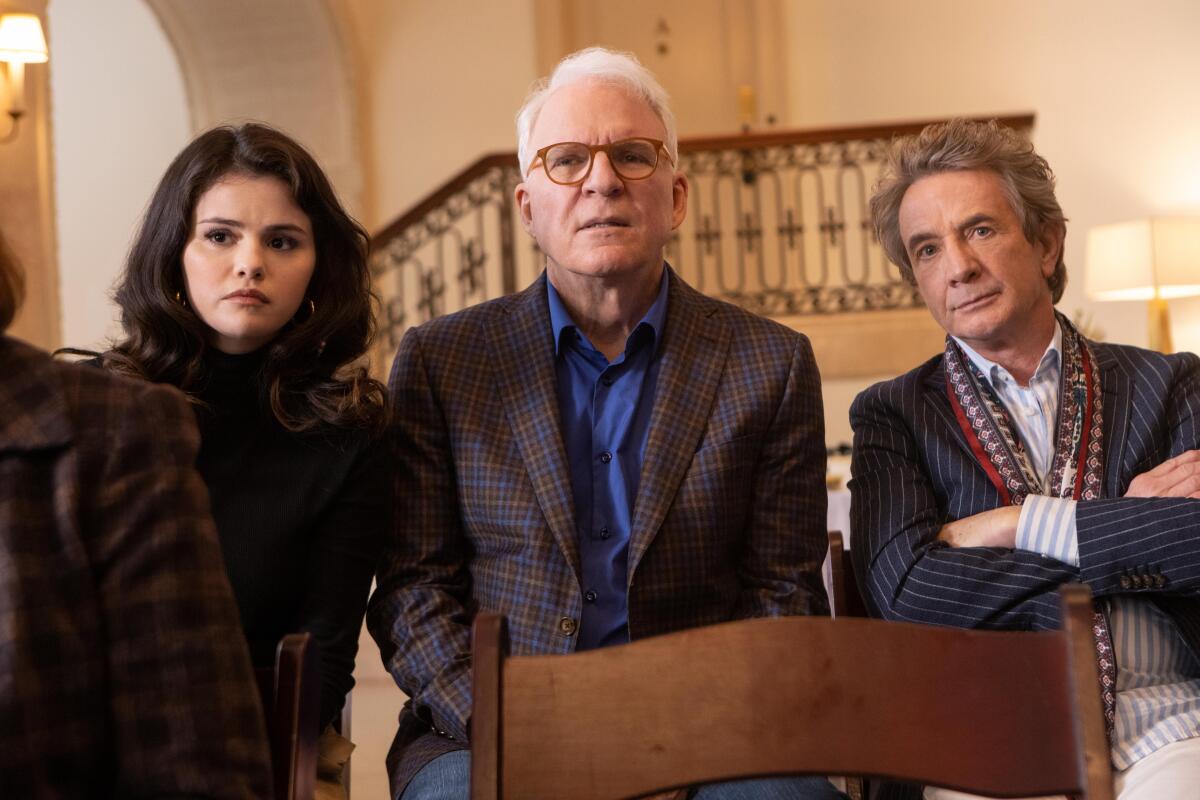
2021 | TV-MA | 2 Seasons | Comedy, mystery
Created by Steve Martin and John Hoffman
Steve Martin, whose career path has intersected television since before he was a writer and an occasional presence on “The Smothers Brothers Comedy Hour” has in his mid-70s co-created (with John Hoffman) a splendidly funny, involving and one might even say youthful series, “Only Murders in the Building.” Co-starring the slightly younger Martin Short and the much younger Selena Gomez.
The stars play unacquainted neighbors in a grand apartment house on the Upper West Side of Manhattan who meet killing time in a nearby restaurant, where they find they are all fans of the same true-crime podcast, “Not All is OK in Oklahoma,” and bond intensely over this single issue. (In other respects, antipathy reigns.) When they return to the building they learn that a body has been discovered; they go snooping, and before long they have embarked upon an investigation and podcast of their own. (Read more) — Robert Lloyd
17. Malcolm in the Middle
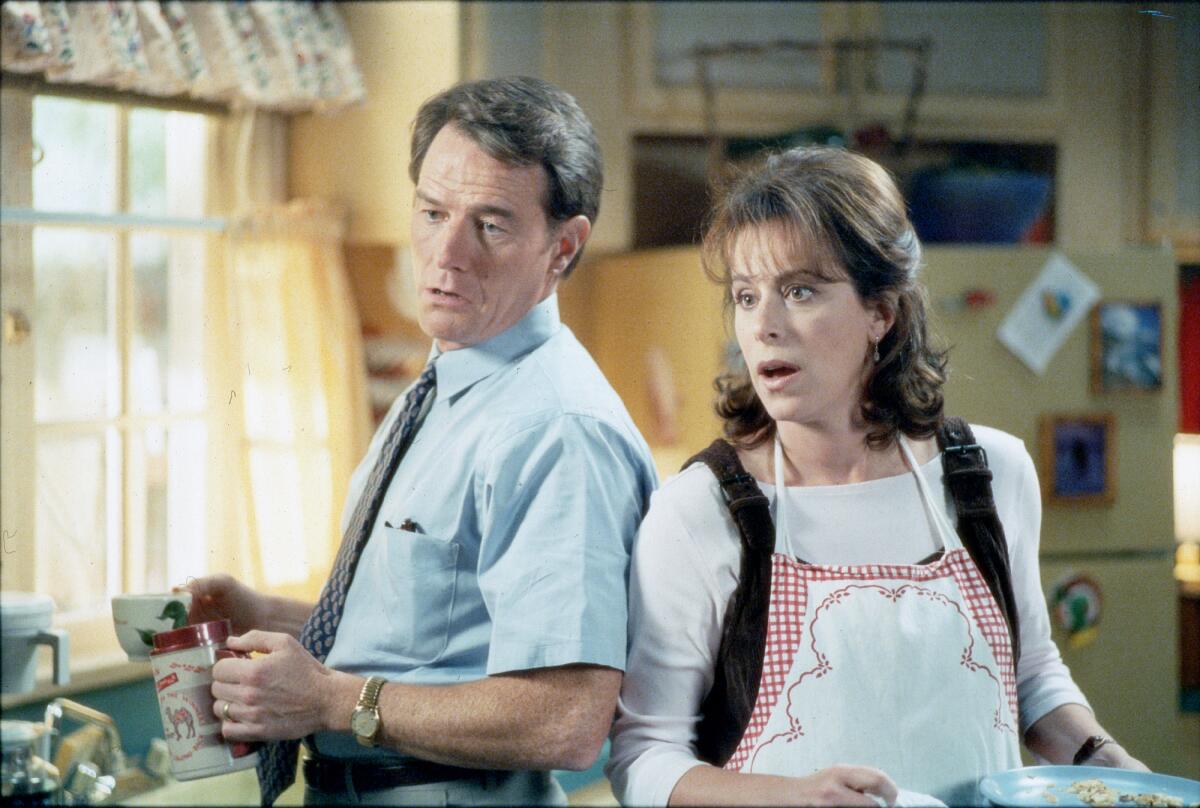
2000 | TV-PG | 7 Seasons | Comedy
Created by Linwood Boomer, Michael Glouberman and Gary Murphy
“Malcolm in the Middle” is the wittiest, smartest, sharpest-written, most original comedy of the season. As a bonus, no laugh track, and not a stand-up comic in sight.
Such praise can lift expectations perilously beyond reality. What’s more, sustaining laughs is one of the biggest challenges in the business, witness the recent decline of comedy in prime time.
If you like your family humor tart, sophisticated and just a bit bent, though, get ready to howl at this series about a brilliant little kid buckling under the crushing stigma of being designated a genius.
Just about eclipsing Malcolm (Frankie Muniz) is his earthy, free-spirited hoot of a mom, Lois (Jane Kaczmarek), who rules a family almost in as much disrepair as the patchy, weedy lawn outside the modest tract house where she and her husband, Hal (Byran Cranston), and their sons live ... somewhat peculiarly.
When is it apparent that “Malcolm in the Middle” is not your typical sitcom?
Possibly when opening in the kitchen with Lois cheerfully shaving Hal’s thicket of dark body hair beside their sons eating breakfast, and suggesting that birds could make nests of the falling fur. “Or I don’t know, maybe you boys could use it for school projects.”
Then back to Hal: “Raise your arms.”
As the three boys chomp away obliviously and Lois keeps chattering, nude Hal’s private parts are discreetly covered by the newspaper he is reading. Just as Lois’ breasts are obscured from our view when she answers the door topless and tells the stunned teacher who has come to inform her that Malcolm is a genius: “They’re just boobs, lady. You see them in the mirror every morning, and I’m sure yours are a lot nicer than mine.”
What’s wrong with this picture? Absolutely nothing if you’ve a yen for risky TV that turns sitcom formula on its ear. (Read more) — Howard Rosenberg
16. Better Things
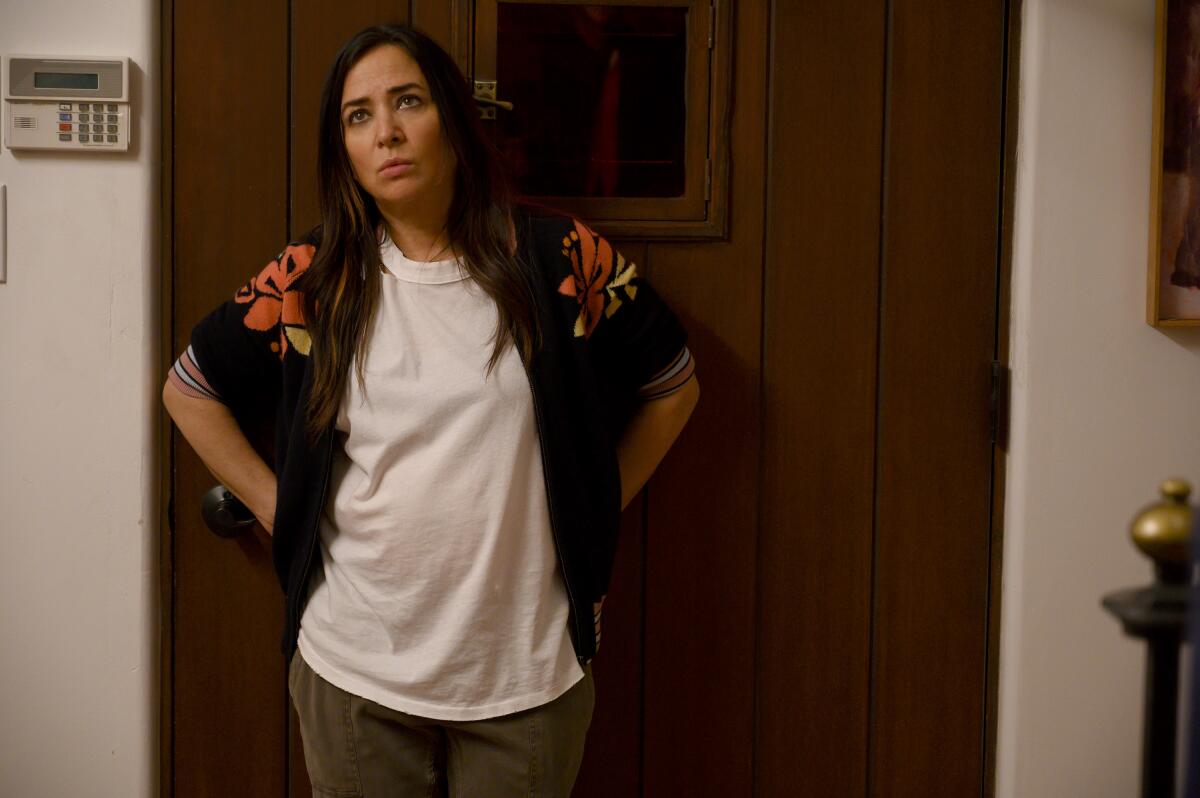
2016 | TV-MA | 5 Seasons | Comedy, drama
Created by Pamela Adlon and Louis C.K.
In “Better Things” Pamela Adlon, who is small and scrappy, plays Sam Fox, a working actress whose career, like her own, runs back to childhood. Like Adlon, she’s divorced with three daughters at different stages of development — Max (Mikey Madison), Frankie (Hannah Alligood) and Duke (Olivia Edward) in descending order of age — and across the street lives a mother also in need of mothering (Celia Imrie, who like Adlon’s mother, is English). Men, though not absent, are tangential to the story.
It’s true that we are faced with yet another sitcom in which an actor or comedian plays a version of herself or himself; it’s hard to say how many audition scenes the market will bear, as reliable as those can be. I don’t know anything about the real people in Adlon’s life, or the actual life they lead – one notes the absence of household help in a moderately upscale milieu. But everything here feels lived in and actual. (Read more) —Robert Lloyd
15. Buffy the Vampire Slayer
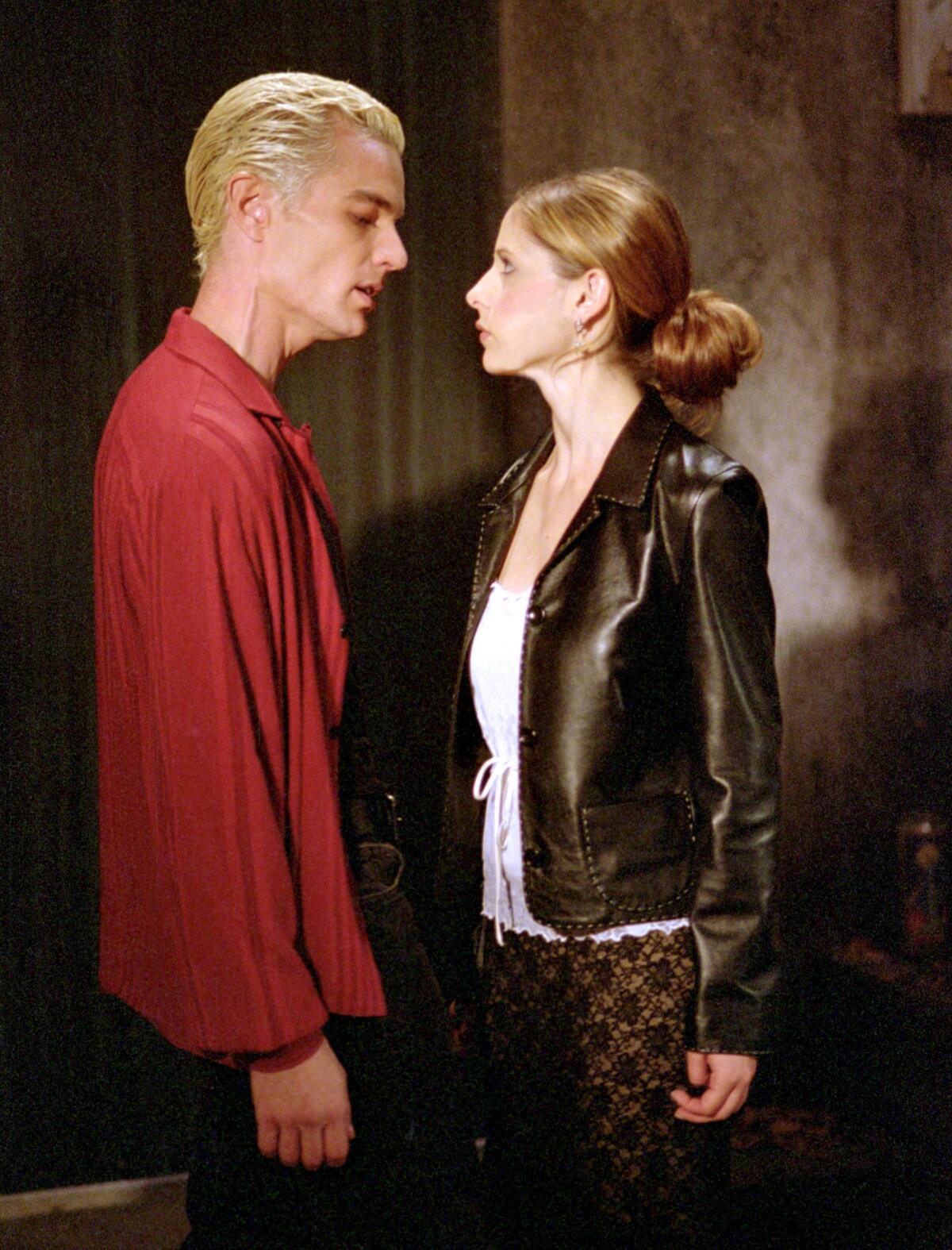
1997 | TV-PG | 7 Seasons | Teen drama
Created by Josh Whedon
“Buffy the Vampire Slayer” series is deliciously funny satirical gore, tracing the exploits of a 16-year-old high school girl (Sarah Michelle Gellar) who has the guile, strength and martial arts skills (to say nothing of an ever-present stake and cross hanging from her neck) to slay blood-guzzling vampires. It’s a dirty job, you know, but somebody has to do it.
What’s to worry about vampires? Buffy explains the concept: “To make you a vampire, they have to suck your blood, and then you have to suck their blood. It’s a whole big sucking thing.”
The neck suckers in this comic thriller of a series may take themselves seriously, meanwhile, but at least Buffy slays with a sense of humor, thanks to the writing of series creator Joss Whedon and the talented Gellar’s easy grasp of parody and effortless execution of his lines. (Read more) — Howard Rosenberg
14. Adventure Time
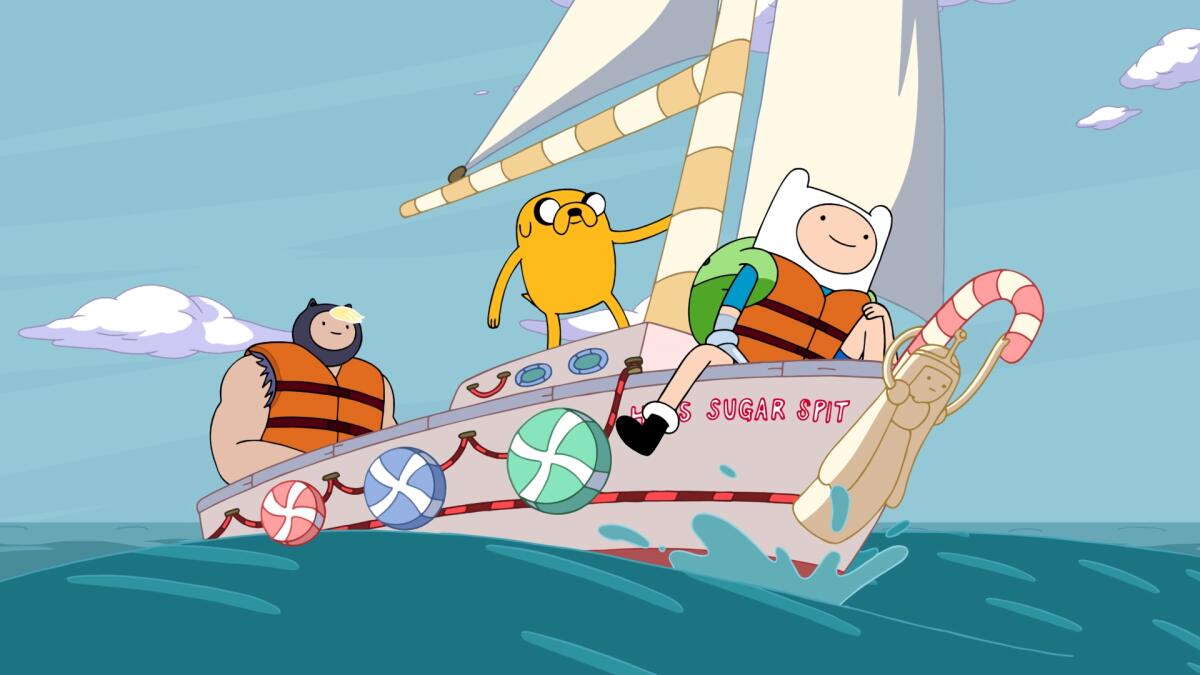
2010 | TV-PG | 10 Seasons | Kids’ TV
Created by Pen Ward
In 2010, a new cartoon premiered with these bold lines. “Princess Bubblegum,” asks Finn, a human boy, “when we bring the dead back to life, will they be filled with worms?” “No,” Princess Bubblegum replies. “If my Decorpsinator serum works, then all the dead candy people will look as young and healthy as you do.” It doesn’t quite work out for the dead — candy zombies wreck a slumber party in the first episode of “Adventure Time” — but for the living, Pendleton Ward’s animated epic becomes a cultural phenomenon with a 10-season run on Cartoon Network. Finn (Jeremy Shada) and his shape-shifting dog (John DiMaggio) began the series as romping adventurers, fighting monsters on a generally charming if often dangerous mutant Earth, about a thousand years after the apocalyptic Mushroom War. The Land of Ooo is where they live, with its Candy Kingdom, Ice Kingdom, Flame Kingdom, Nightosphere and Lumpy Space, each with its issues, its creatures, its customs, its king or princess. The series developed over time, from a story of sword-swinging amateur heroics into one more concerned with family and friends and affections; it is spiritual in a way that doesn’t deny the power of broken wind. The comical bumps up against the chaotic, the domestic beats back the dreadful. “Adventure Time” will make you laugh and break your heart. (Read more) —Robert Lloyd
13. The Shield
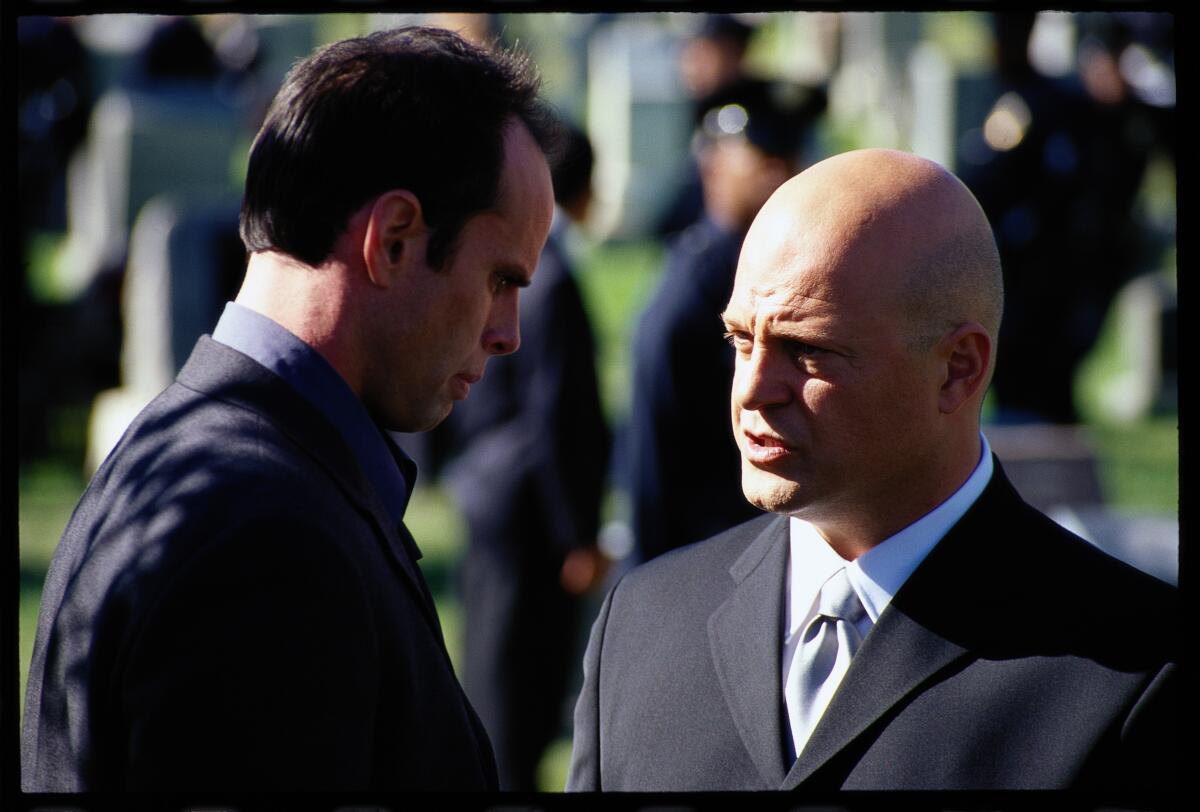
2002 | TV-MA | 7 Seasons | Police drama
Created by Sean Ryan
“The Shield” was not only one of the top police shows ever produced but ranks as one of TV’s best dramas in the last 20 years. The series, about corrupt detective Lt. Vic Mackey, premiered in 2002 and helped put cable network FX on the map with its Emmy-winning performance by star Michael Chiklis. Mackey was a terror to his rivals on the force and any criminals who got in his way, but he was also the kind of figure you might want on your team if you got into trouble.
The show was one of the first cable series to attract major film stars — both Glenn Close and Forest Whitaker turned up for major storylines. The excellent supporting cast also included Walton Goggins (“Justified,” “The Hateful Eight”) in one of his first major roles. The pilot of the show had a climactic twist that is still chilling, and the series rarely had a weak episode during its seven-season run. (Read more) — Greg Braxton
12. PEN15
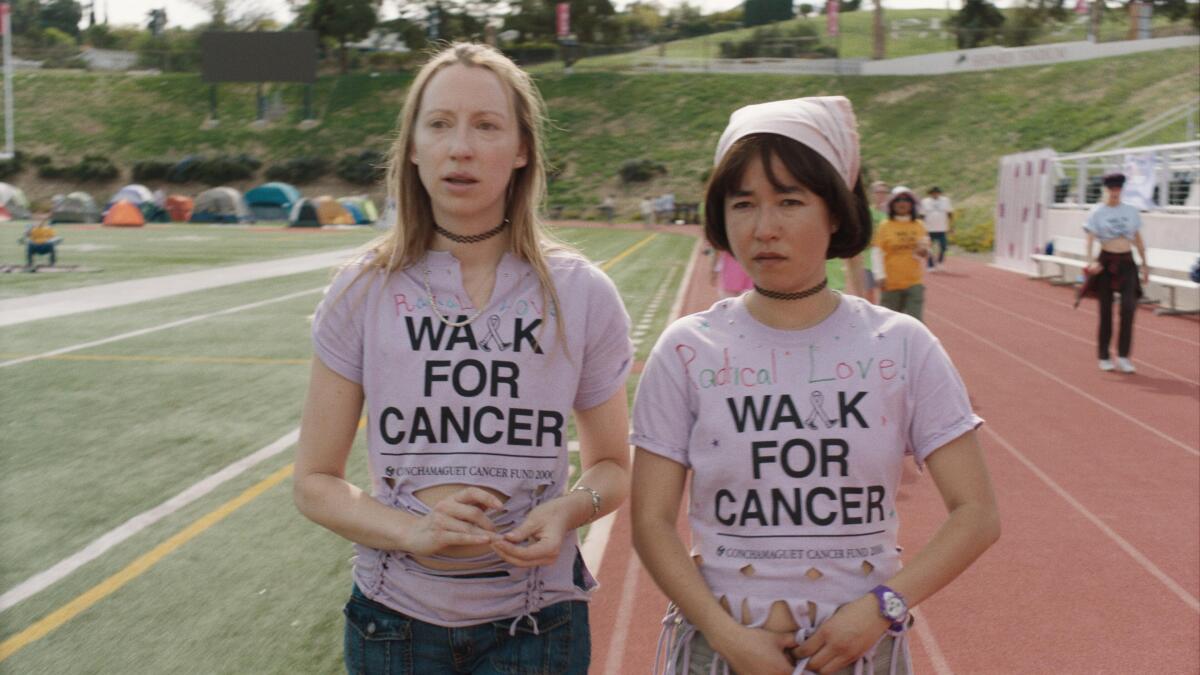
2019 | TV-MA | 2 Seasons and an animated special | Comedy
Created by Maya Erskine, Anna Konkle and Sam Zvibleman
The juvenile joke of the title and the oddness of its casting notwithstanding, Hulu’s “PEN15,” in which grown-up actresses Maya Erskine and Anna Konkle star as 13-year-old middle-schoolers amid an otherwise age-accurate cast, is as deep and real a comedy as you will see in a year already great for television comedy. Nothing more thoroughly conceived, delicately acted or emotionally true will be coming your way, sitcom or drama or in between.
Set in 2000 and co-created by Erskine and Konkle with Sam Zvibleman it’s a love story between two best friends. The fact that Maya and Anna (Mai and ‘Na to each other) have sworn to experience everything new together, and sulk — grieve — when they don’t, does not make things easier. (One feels they might grow up to be Abbi and Ilana of “Broad City.”) (Read more) — Robert Lloyd
11. Mrs. America
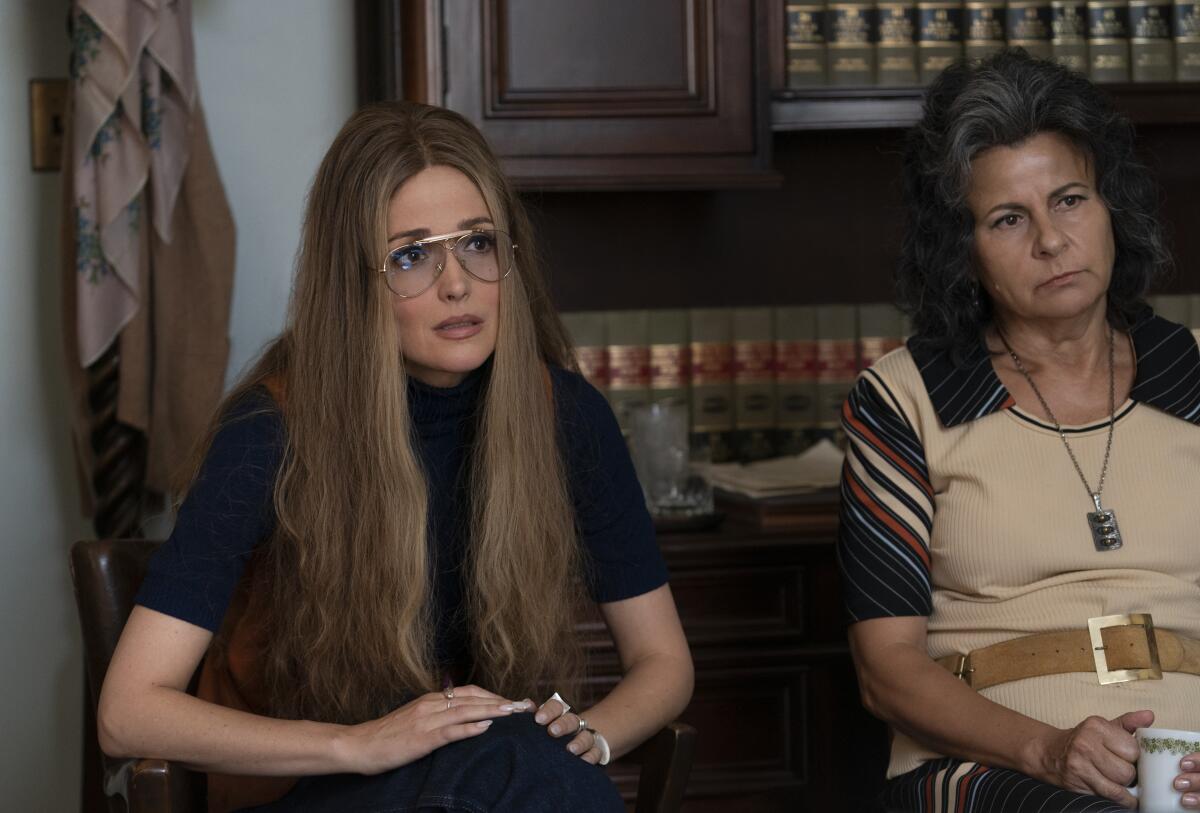
2020 | TV-MA | 1 Season | Drama
Created by Dahvi Waller
Historical dramas about the women’s right’s movement have not exactly been the bread and butter of series television, no matter the decade. The list of scripted narratives that have chronicled the achievements of suffragettes, mid-century feminists or even modern #MeToo disrupters is short. It’s as if the leap from June Cleaver to “Fleabag” happened organically, without the help of legions of women who struggled, marched and fought.
Now here she is, “Mrs. America,” to shine a bright light on a dramatic slice of our collective history that the medium has largely avoided beyond bra-burning jokes and the occasional shout out to Gloria Steinem. The nine-part FX on Hulu miniseries chronicles the fight for and against the passage of the Equal Rights Amendment through the stories and trajectories of the women who led the charge. The Equal Rights Amendment was, and is, a constitutional amendment that guarantees legal gender equality for women and men. Generations of feminists, and humans of various stripes, pushed for it — a movement that reached its zenith in the 1970s. It still hasn’t been ratified.
“Mrs. America” documents its seismic derailment, deftly serializing events with an A-list cast led by Cate Blanchett. She plays Phyllis Schlafly, a moral crusader known for her ultraconservative views who leads the charge against abortion, women’s rights, feminism itself. (Read more) — Lorraine Ali
10. Justified
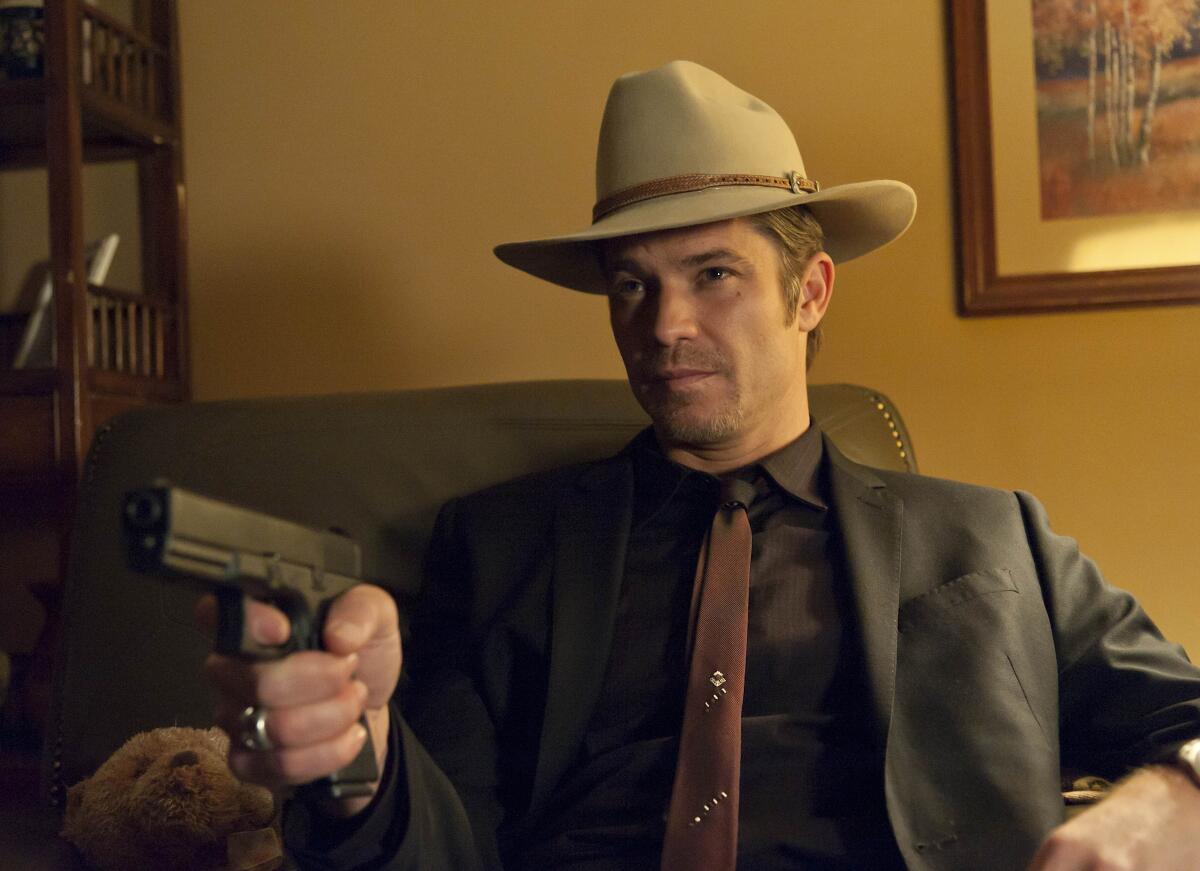
2010 | TV-MA | 6 Seasons | Action drama
Created by Graham Yost
You have to wonder if the pitch for the tough guy drama “Justified” included the phrase “think ‘McCloud’ meets ‘Dexter.’”
Based on the Elmore Leonard short story “Fire in the Hole” with its popular I-only-shoot-to-kill protagonist, “Justified” is a May/December marriage between TV crime fighters. Like Dennis Weaver’s iconic Sam McCloud, Deputy U.S. Marshal Raylan Givens is a plain-spoken fellow, with a big cowboy hat and no time for fancy pants bantering. But like Dexter Morgan, Givens also believes that there are some folks out there who will just never learn. “Justified” is how Givens feels about sending these thugs to their maker for some barely legal but morally righteous reason or other. We meet our hero in a steely face-off with a Miami killer whom he has given 24 hours to get out of town. The result prompts an internal investigation in which Givens’ defense -- “He pulled first, I shot him” — gets him reassigned to eastern Kentucky where, it will surprise no one to learn, Givens was born.
Within minutes of his arrival in Lexington, he discovers that his ex-wife Winona (Natalie Zea) has recently returned as well, and by gosh, she works right there in the courthouse. As for that Aryan terrorist (Walton Goggins) local marshals are pursuing, heck yeah, he knows him. “Boyd and I dug coal together when we were 19,” he tells his new boss, Chief Deputy Art Mullen (Nick Searcy), who thought that might just be the case.
His first trip back to Harlan takes him past the screen door of Ava (Joelle Carter), one of those down-market Southern sirens who always seem to be daydreaming half-naked on the front porch or shooting their abusive boyfriends. Having done both, Ava, like Boyd, reminds Givens not only of whence he sprung but to where it would be far too easy for him to return.
“Justified” isn’t all skinheads, chifforobes and moonshine. It’s also a semi-traditional criminal procedural. In early episodes, Givens leaves the dirt roads of Harlan to capture an escaped convict and locate a convicted mob money launderer who years before gave him the slip. Along the way, we meet ex-wife and fellow deputies Tim Gutterson (Jacob Pitts) and Rachel Brooks (Erica Tazel), one of the few women unimpressed by Givens’ charms. (Read more) — Mary McNamara
9. 30 Rock
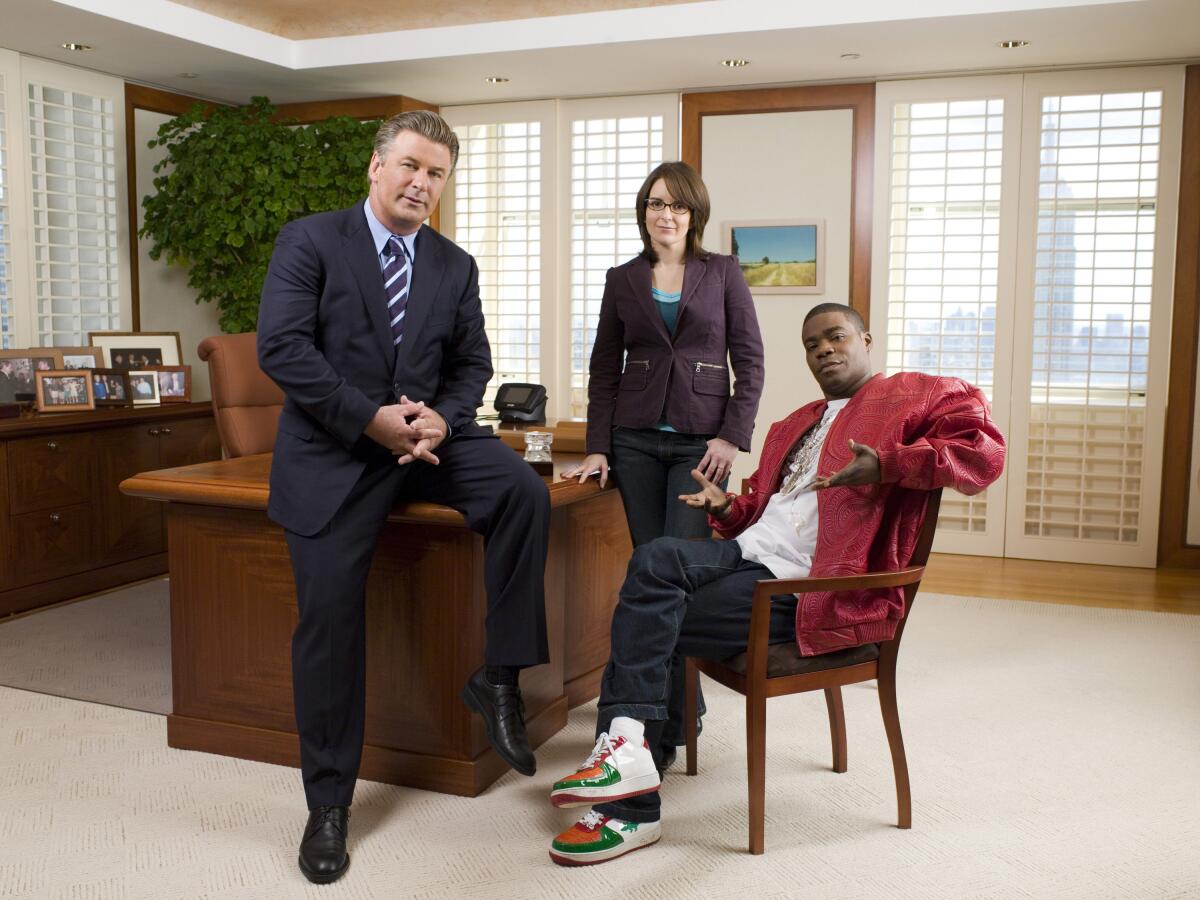
2006 | TV-14 | 7 seasons | Comedy
Created by Tina Fey and Lorne Michaels
It would be confusing opinion with fact to definitively call any series “the best show of the fall season (2006),” but I can state unequivocally and without fear of contradiction that “30 Rock” — one of two new NBC shows set backstage at a broadcast-live sketch comedy — is my favorite. I feel an almost proprietary desire to see it succeed, and given the high mortality rate of such newborns, I light this small candle against its demise.
This is the one made by people with sketch-comedy bona fides -- creator Tina Fey, who plays Liz Lemon, the head writer of “The Girlie Show,” was herself the first female head writer at “Saturday Night Live.” “SNL” producer Lorne Michaels is the executive producer of “30 Rock”; costar Alec Baldwin has been a frequent guest host of that show — indeed, his appearances there have helped keep him credible through the years.
It doesn’t hurt that it’s set not at a fictional network but at NBC — 30 Rockefeller Center is the address of the network’s New York headquarters — and that it uses real locations and plays off the network’s actual corporate relationships.
Baldwin is exceedingly funny as a man who owes his career in television to having developed a three-way oven — NBC being owned by General Electric, you see — and arrives at the top of the pilot as “the new vice president of East Coast television and microwave programming” to turn Liz’s world upside down. (“That sounds like you program microwave ovens,” she says, to which he replies, after a pause, “I like you -- you have the boldness of a much younger woman.”) (Read more) — Robert Lloyd
8. ER
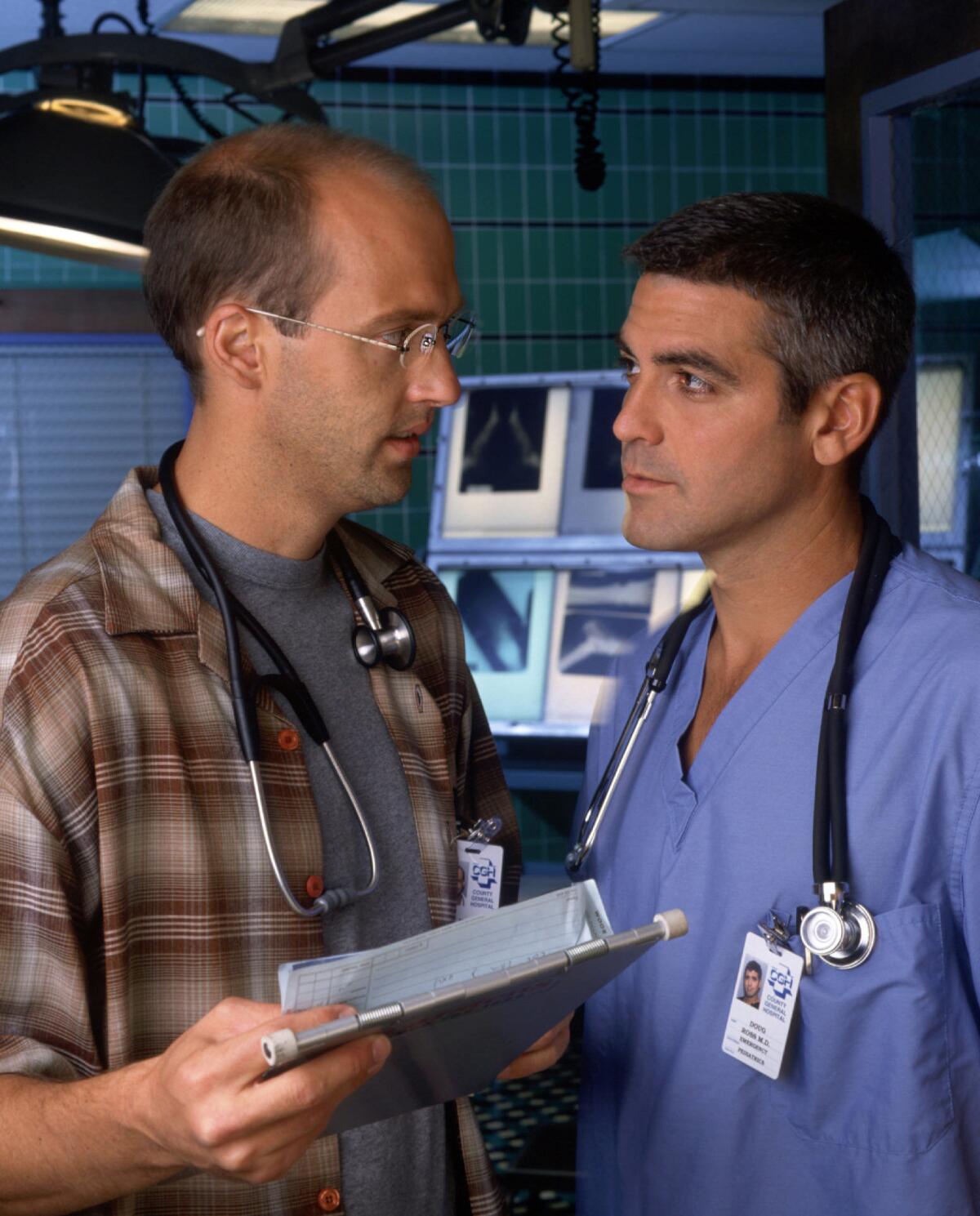
1994 | TV-14 | 15 Seasons | Medical drama
Created by Michael Crichton and John Wells
After two hours with the revved-up premiere the medical series “ER,” you’re ready for a Xanax.
There’s screaming, there’s shouting, there’s frantic movement. There’s the gunshot victim with a hole in the chest, the terrified baby-sitter with the battered infant, the doctor who’s physically attacked by the son of a fatal heart attack victim after another patient accuses him of being anti-Semitic, the young woman who comes in to get felt up, the hypochondriac in for her hangnail. And so on and so on.
As the walking and wheeled-in wounded surge through the emergency room of the large Chicago hospital, only rarely does “ER” pause for a breath. So when one of its overworked, underpaid residents exclaims, “I could never give this up,” you know he needs a shrink.
As marred and derivative as “ER” is, however, there’s something quite seductive about this series created by Michael Crichton and John Wells. The performances — notably by Sherry Stringfield, George Clooney, Eriq LaSalle and Anthony Edwards as residents — are strong. Enough of the story lines are sufficiently compelling to hold your attention. And the pace? Well, put it this way about all the pulsating and fluid camerawork: You rarely lose interest.
And equally significant — unlike its competitor on CBS, the new medical series “Chicago Hope” — there are no superheroes or easy miracles in sight. After a comatose staff member is rushed in after overdosing on drugs, the patient’s fate remains unresolved even as the final credits roll. (Read more) — Howard Rosenberg
7. The Mary Tyler Moore Show
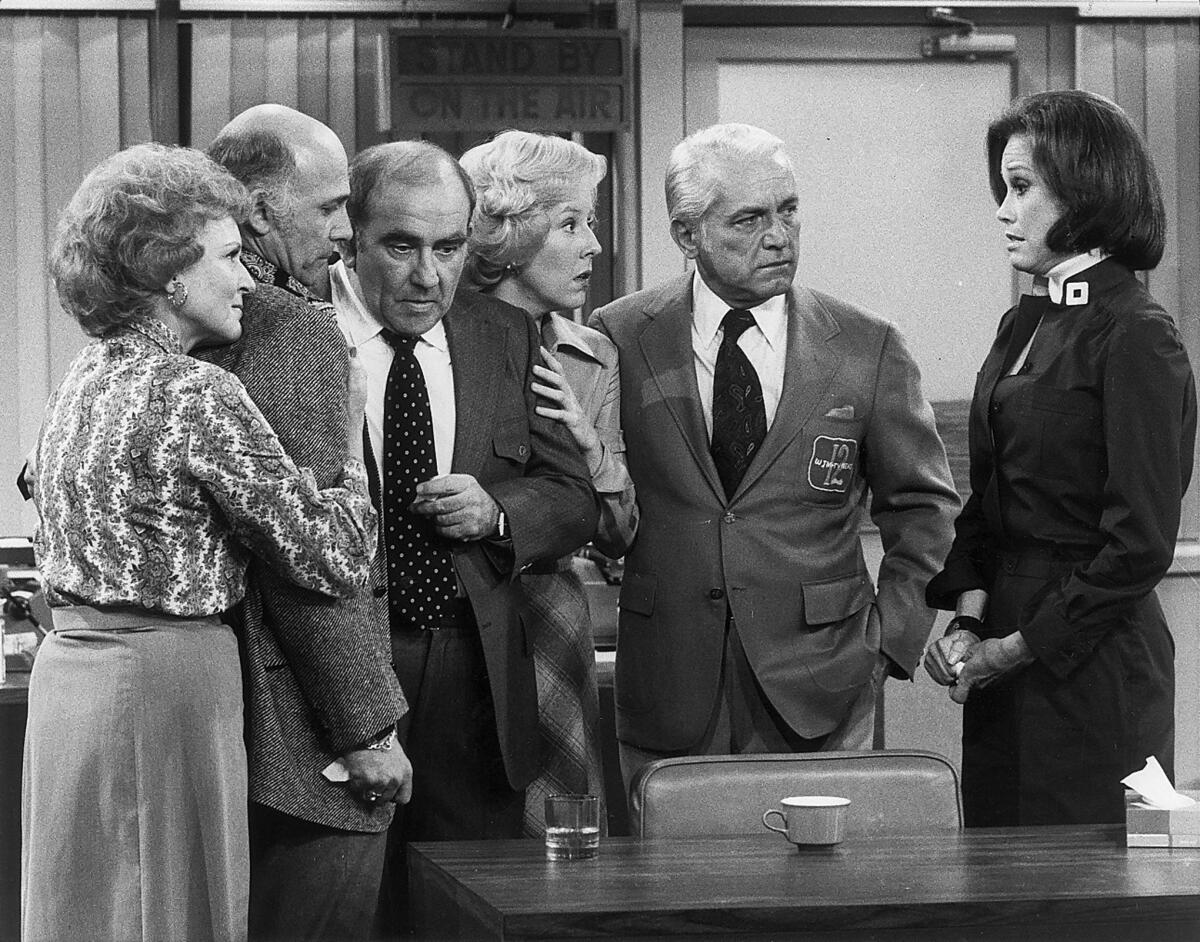
1970 | TV-PG | 7 Seasons | Comedy
“The Mary Tyler Moore Show” is charming, witty and glossily produced.The characters are individualistic and funny, and the initial script by James L. Brooks and Allan Burns was complementary to the cast’s skills.
Moore plays a young woman on the rebound from a two year romance who travels to Minneapolis-St.Paul to find a new life and work. First she finds an apartment through a friend (Cloris Leachman), but has a difficult time holding onto it because of a scheming gal (Valerie Harper) who claims that the pad is really hers.
Next on the agenda is being interviewed for a job. Moore applies for a secretarial position in a TV news studio and after a very funny encounter with the news chief (Edward Asner) she is hired as an “associate producer.” The news chief also drinks a lot. (Read more) — Don Page
6. The Handmaid’s Tale
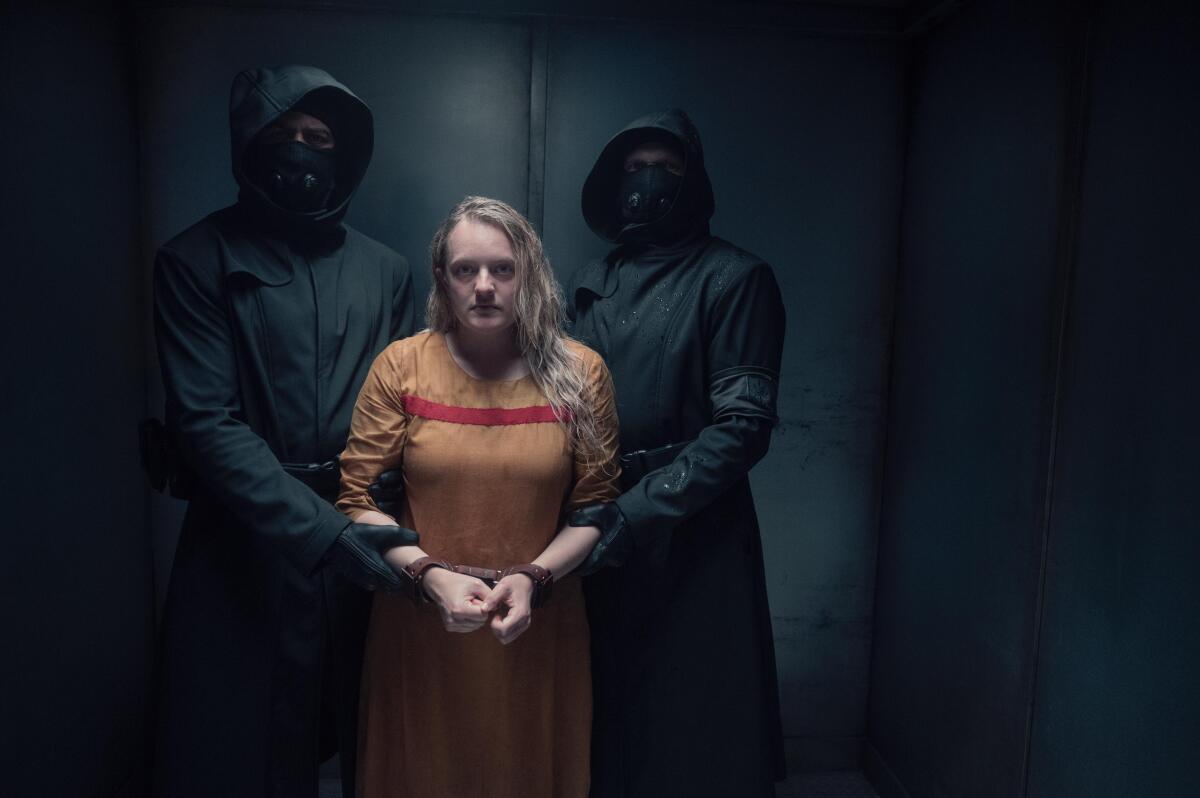
2017 | TV-MA | 5 Seasons | Drama, science fiction
Created by Bruce Miller
Margaret Atwood published “The Handmaid’s Tale,” her novel about a near-future, totalitarian patriarchal theocracy, in 1985. It was right in the middle of the Reagan years, and as a Canadian she was looking south across the border at a resurgent American Puritanism, exemplified by the so-called Moral Majority and a flogging of “traditional values” in the face of various liberation movements. American fascism, she reckoned, would wear a holy face.
The book has been adapted a number of times — as a 1990 film directed by Volker Schlöndorff with a screenplay by Harold Pinter — but also for the stage, for radio, as an opera and as a ballet. As all things must, it has come to television, worked by Bruce Miller (“The 100,” “Eureka”) into a studiously handsome, generally impressive series on Hulu.
Elisabeth Moss, of “Mad Men” and “Top of the Lake,” plays Offred, a handmaid — that is, a fertile, potential surrogate mother — in the home of new-order bigwigs “Commander” Fred Waterford (Joseph Fiennes) and his wife Serena Joy (Yvonne Strahovski). (“Handmaid” is a biblical reference, to the story of Leah and Rachel.) Offred — her slave name, essentially, combining “Of Fred” — has ceremonial sex with Waterford in the presence of Serena in their hopes that he’ll get her pregnant. The future here is full of ceremony, as imagined futures often are, some involving public execution. (As imagined futures often do.) (Read more) — Robert Lloyd
5. Key & Peele
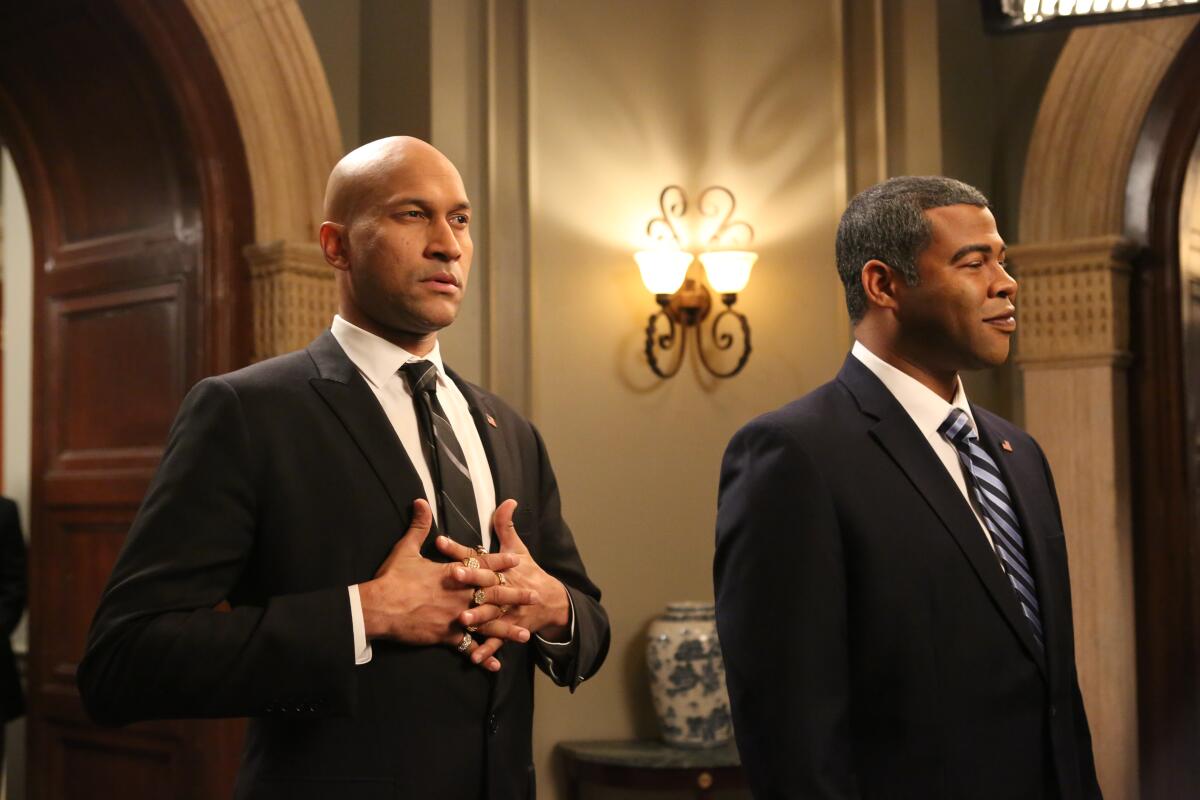
2012 | TV-14 | 5 seasons | Sketch comedy
Created by Michael Key and Jordan Peele
In a promo for Comedy Central’s sketch show, “Key & Peele,” three slaves are on the auction block in the antebellum South. The biggest and strongest-looking sells immediately, leaving the other two — Keegan-Michael Key and Jordan Peele, who created and star in the series — to crack jokes about how the slave traders managed to catch him in the first place.
As the provocative clip suggests, race in America is a central issue for the show. In sendups of Lil Wayne’s stint in jail, ‘90s R&B singers and Gordon Ramsey’s “Hell’s Kitchen,” the biracial comedians play characters from a wide range of ethnic backgrounds, tackling touchy subjects such as self-stereotyping and black machismo.
But the “MADtv” veterans’ goals for the show extend beyond envelope-pushing humor about race and pop culture. They also want to present what Peele calls a “modern take on what sketch can be.” While they cite such genre touchstones as “Saturday Night Live” and “Chappelle’s Show” as influences, Key and Peele also draw inspiration for the show from a more surprising source: the cinematic look of AMC and HBO series. (Read more) — Judy Berman
4. The Americans
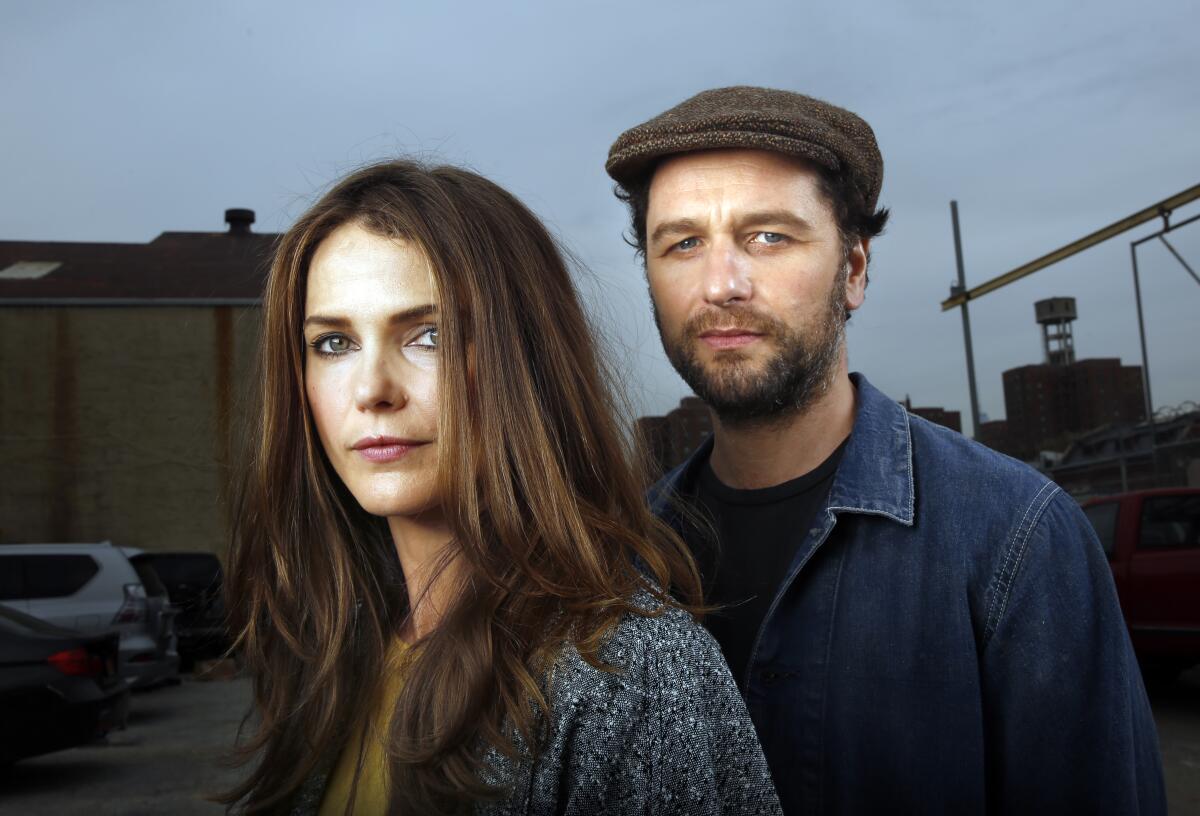
2013 | TV-MA | 6 seasons |Crime drama
Created by Joe Weisberg
In many ways, “The Americans” has it all: Sex, violence, Cold War intrigue, Reagan-era fashions (oh, that hair!), marriage as metaphor, Margo Martindale … the list goes on and on. If it weren’t on FX (now on Hulu) and full of Americans, you’d think it had been made by the BBC.
The couple to whom the title refers, Elizabeth (Keri Russell) and Philip (Matthew Rhys) Jennings, are a pair of Soviet spies who had been living and working in the D.C. suburbs for more than a decade. During the first season, many things happened — an FBI agent named Stan (Noah Emmerich) moved next door, Philip had to “marry” a source, Elizabeth was almost killed — but the A-plot followed the emotional arc of the two leads. Increasingly, Philip came to love America and, more important, he and Elizabeth began to love each other. The sham marriage was made real. It was a lovely twist on the more typically combative work versus family storyline (if a slightly worrisome celebration of arranged marriages). Except for one thing. Two things, actually: Paige (Holly Taylor) and Henry (Keidrich Sellati), the Jennings children. (Read more) — Mary McNamara
3. Reservation Dogs
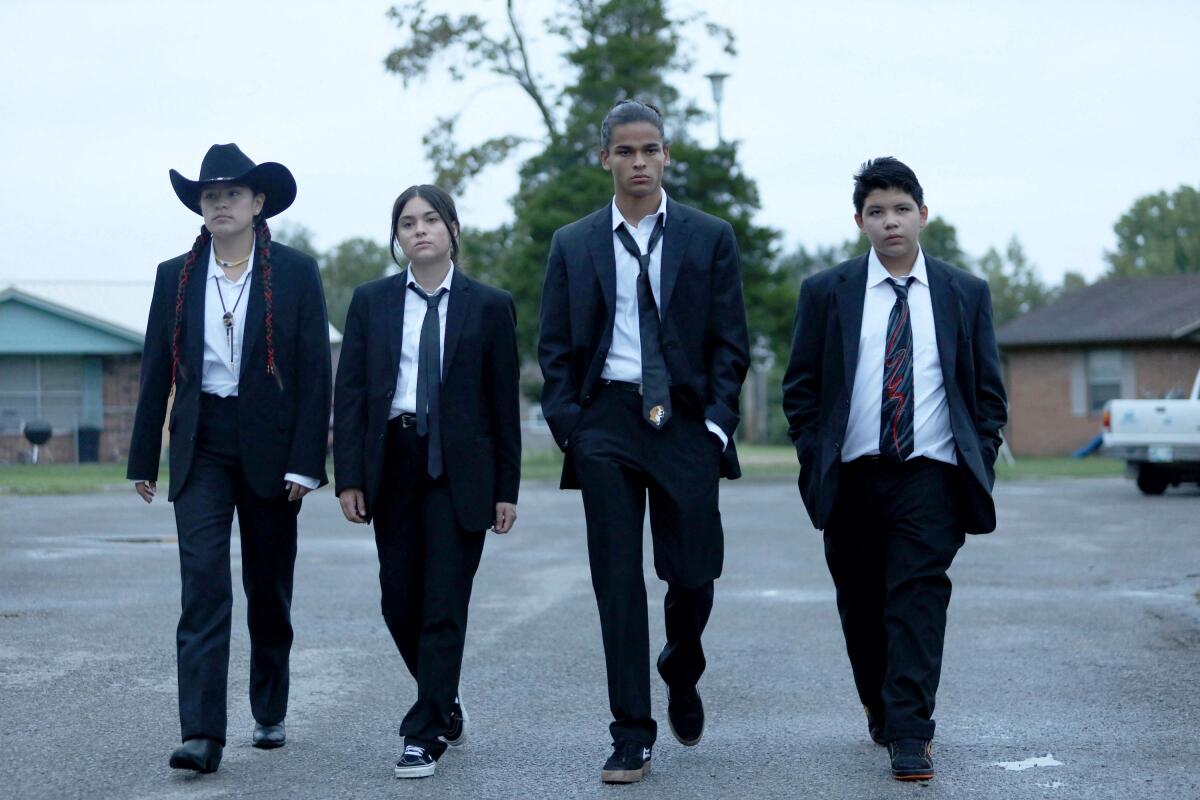
2021 | TVMA | 2 Seasons | Comedy, drama
Created by Sterlin Harjo and Taika Waititi
I am certainly not qualified to say whether “Reservation Dogs” paints an accurate picture of life, or a slice of it, on and around the tribal lands of the Muscogee (Creek) Nation in Eastern Oklahoma, here referred to simply as “Indian territory.” I have traveled in that neck of the woods (and fields) and can only say that, yes, that is what it looks like — and that this show, in which four tribal teens steal things and sell meat pies to raise the money to go to California to avoid the fate of a dead friend, is charming, funny and a little bit beautiful. But Sterlin Harjo (“Four Sheets to the Wind”), who co-created the series with Taika Waititi (“Jojo Rabbit,” “What We Do in the Shadows”), and directed select episodes, is a member of the Seminole Nation with Muscogee ancestry and grew up in Holdenville, Okla., about 60 miles southwest of Okmulgee where the series was largely filmed. (Waititi, from New Zealand, is Maori on his father’s side — different country, similar dynamic.) As the old advice goes, he is writing what he knows. (Read More) — Robert Lloyd
2. Freaks and Geeks
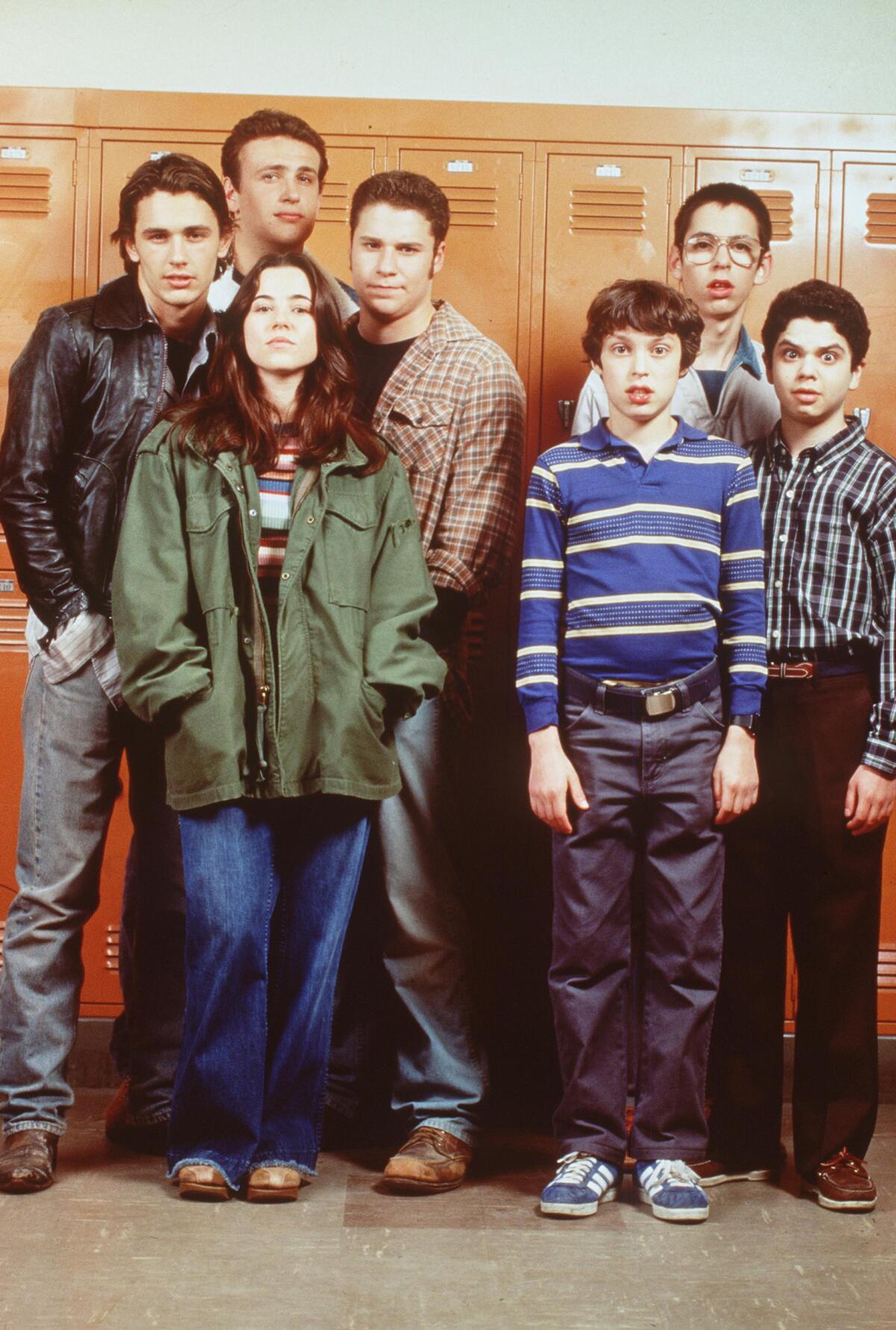
1999 | TV-PG | 1 Season | Comedy, drama
Created by Paul Feig and Judd Apatow
“Freaks and Geeks” took an honest look at the perils and occasional small victories of adolescence. Was it too honest for an audience accustomed to wading through the melodrama of “Dawson’s Creek”? Maybe. But the show’s initial Saturday night time slot didn’t help. Nor did being bounced off the air for post-season baseball. How can an audience show up if viewers can’t find you?
What initially turned America off? Again: Nothing. NBC bounced “Freaks” all over the prime-time map. What’d you want it to do? Mix in shirtless jocks and perky cheerleaders. You do get the show’s title, right?
Best shareable lines: Fatherly advice from Mr. Weir: “You know who used to cut class? Jimi Hendrix. Know what happened to him? He died. Choking on his own vomit.” Neil on dating out of your league: “The dance is tomorrow. She’s a cheerleader. You’ve seen ‘Star Wars’ 27 times. Do the math.” (Read more) — Glenn Whip
1. The Golden Girls
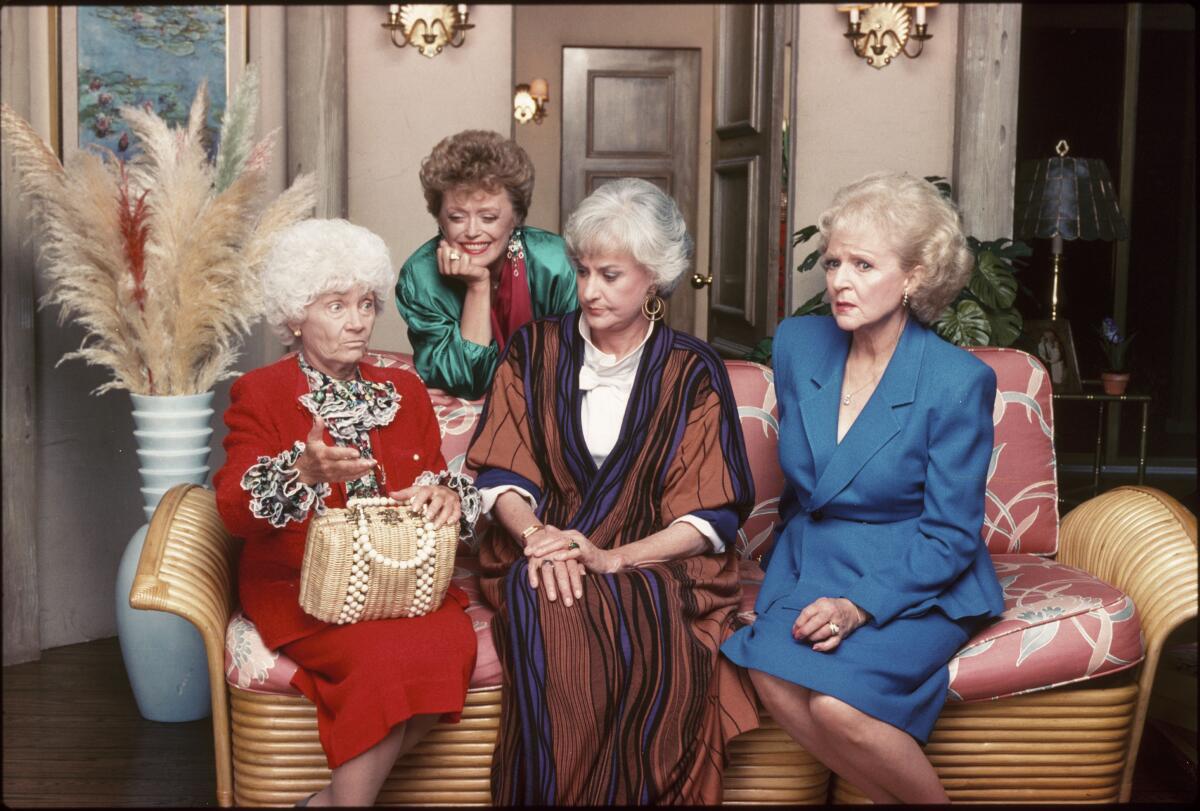
1985 | TV-PG | 7 Seasons | Comedy
Created by Susan Harris
Not only does “The Golden Girls” offer meaningful portrayals of women in their post-middle-age years, but, as a bonus, it’s one of those TV rarities, a comedy that’s funny. Very funny.
Sharing a house in geriatric Miami (where “all the single men under 80 are cocaine smugglers”) are three 55-60-year-old women: Dorothy the divorcee (Bea Arthur), Rose the widow (Betty White) and Blanche the widow (Rue McClanahan), who owns the house. They’re joined by Dorothy’s mother, Sophia (Estelle Getty), whose brain has been damaged by a stroke. That may not be funny to you if you’ve known anyone whose brain has been damaged by a stroke, but Sophia’s free-spirited, no-bull bluntness is a refreshing howl.
Here’s another bonus: “Golden Girls” not only has funny lines, but also a funny cast to make the lines work. Getty, White and McClanahan (although she looks too young for someone in her “golden” years) are rockets.
And when Arthur is around, the laughs really hit the fan. There has never been anyone in TV comedy who made a better tyrant (she is replaying Maude here), anyone with better timing, anyone funnier. Many of the gags are not even gags until she reacts to them. (Read more) — Howard Rosenberg
More to Read
Updates
4:19 p.m. April 3, 2023: Added “History of the World, Part II.”
7:06 p.m. March 2, 2023: Added “Malcolm in the Middle” and remove “I Love Lucy” (no longer available).
The complete guide to home viewing
Get Screen Gab for everything about the TV shows and streaming movies everyone’s talking about.
You may occasionally receive promotional content from the Los Angeles Times.







